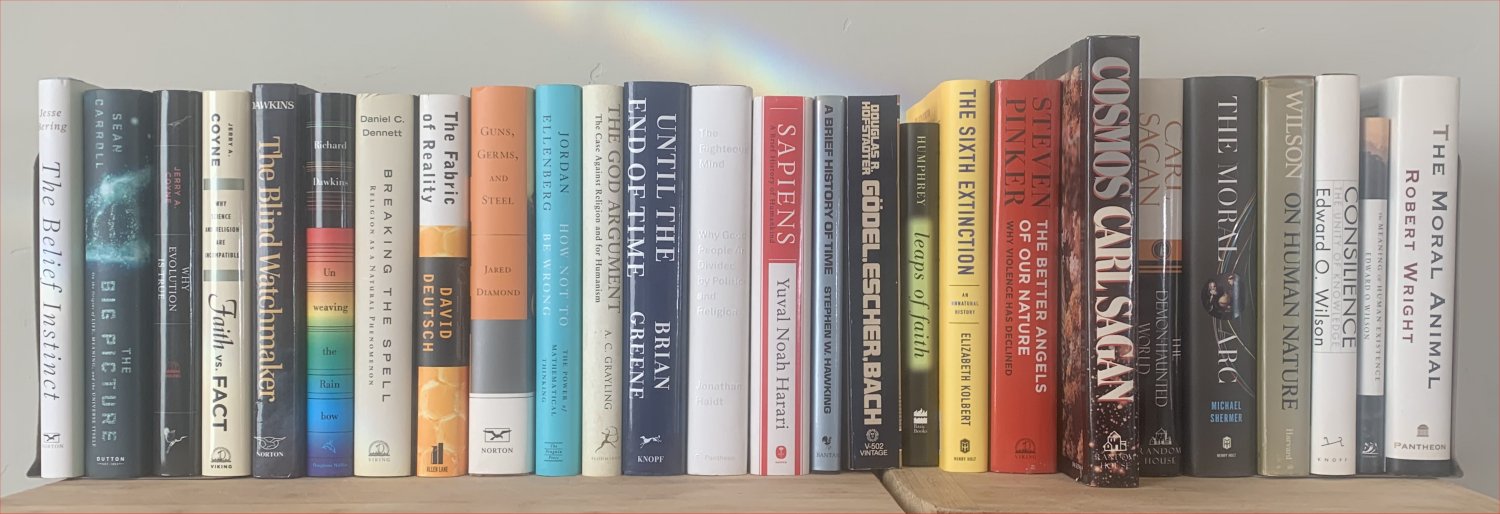This page has brief descriptions, with links to blog posts with longer reviews or summaries, of the nonfiction books I’ve read since starting this blog about ten years ago. There are a few stubs for books read not yet posted.
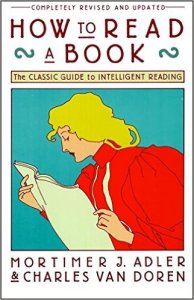 Adler, Mortimer J., & van Doren, Charles. 1940. How to Read a Book. Touchstone. ****
Adler, Mortimer J., & van Doren, Charles. 1940. How to Read a Book. Touchstone. ****
Classic guide (revised 1972) to being systematic in one’s approach to reading books, beyond “elementary reading.” The next steps are “inspectional reading,” which is gleaning a nonfiction book in an hour or so to understand its topic and points; “analytical reading,” the way to thoroughly read a book, details varying depending on its classification; and “syntopical reading,” in which one formulates questions in advance and examines many books for their insights into those questions. I use “inspectional” reading to evaluate a new book and decide if I need to spend more than an hour with it; “analytical” by reading closely and taking the kind of detailed notes, along with comments, that I post on this blog; and “syntopical” in how I choose which books to read by how they address the big themes of this blog. (post)
 Ahn, Woo-Kyoung. 2022. Thinking 101: How to Reason Better to Live Better. Flatiron. **
Ahn, Woo-Kyoung. 2022. Thinking 101: How to Reason Better to Live Better. Flatiron. **
Yet another book about cognitive biases, mixing psychology and self-help. The one distinction between this and similar books is that the author supplies suggestions for overcoming each of the eight biases she examines. These include the allure of fluency, confirmation bias, causal attribution, reliance on anecdotes, negativity bias, biased interpretation, perspective-taking, and delayed gratification. Bottom line: only learning to think better will lead to a better world. (post)
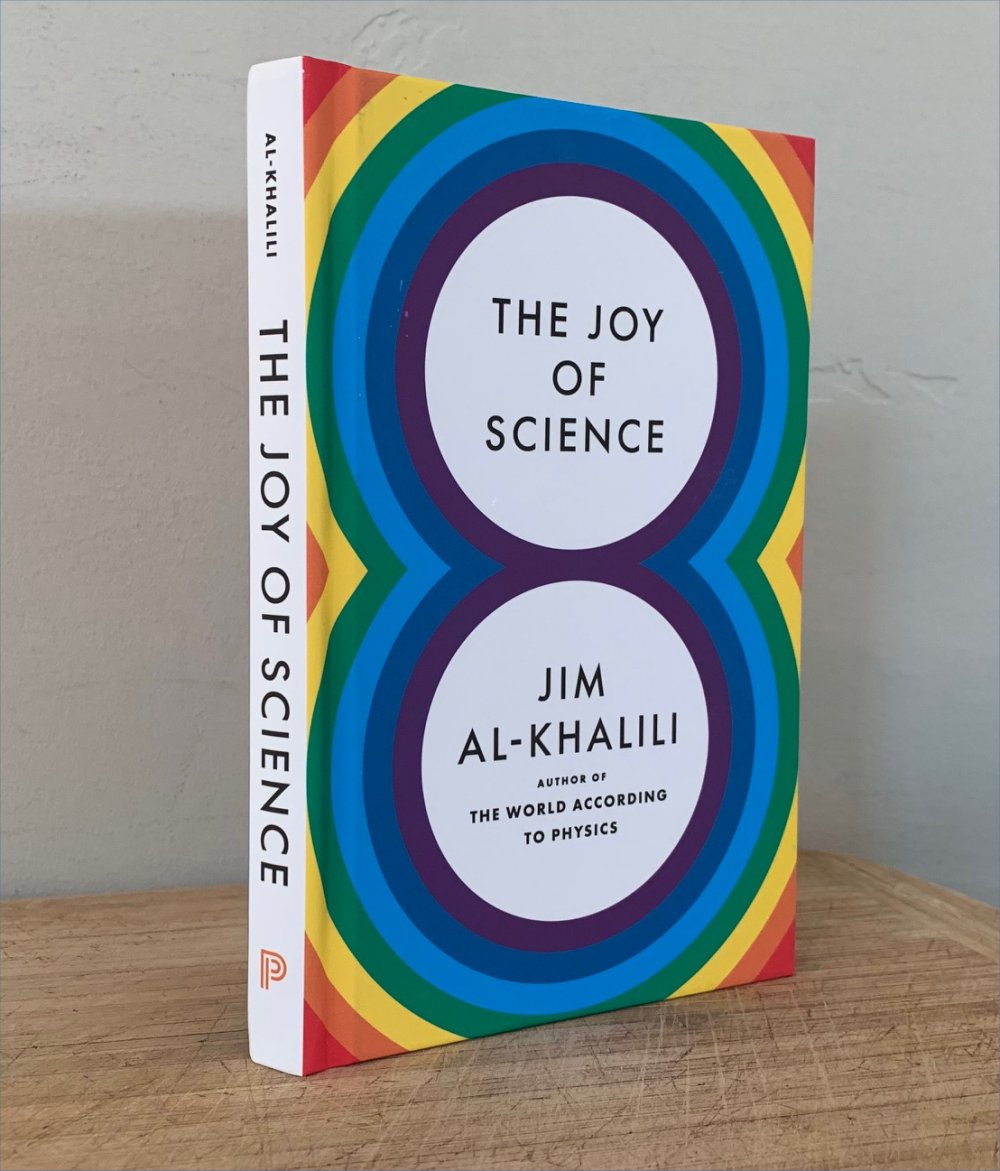 Al-Khalili, Jim. 2022. The Joy of Science. Princeton. ***
Al-Khalili, Jim. 2022. The Joy of Science. Princeton. ***
Short but substantive book about the benefits of thinking more scientifically. Science is a process, not a belief system; scientific theories need to be falsifiable and testable, and so science is self-correcting, in spite of cultural contexts or the biases of individual scientists. Chapters concern how we know that some things really are true, and others are not; the messiness of real life, and to beware black and white thinking and “common sense”; how mysteries are attractive yet can be solved; you can learn to understand almost anything; value evidence over opinion; recognize your own biases as well as others’; don’t be afraid to change your mind; and stand up for reality over conspiracy theories and misinformation. Science is valuable as a reliable way of learning how the world works, because science itself works (thus our technological world), its principles can apply to everything, and it enriches us in an almost spiritual way. (post)
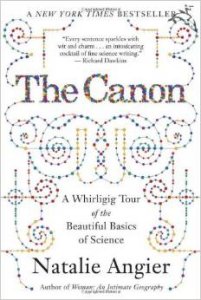 Angier, Natalie. 2007. The Canon: A Whirligig Tour of the Beautiful Basics of Science. Houghton Mifflin. * 1/2
Angier, Natalie. 2007. The Canon: A Whirligig Tour of the Beautiful Basics of Science. Houghton Mifflin. * 1/2
As the subtitle says, covering physics, chemistry, evolutionary biology, molecular biology, geology, and astronomy, along with basic principles of thinking scientifically, probabilities, and calibrations (scales). Useful, but the author’s style is cutesy, veering between ingratiating and grating. (post)
- Ariely, Dan. 2023. Misbelief: What Makes Rational People Believe Irrational Things. Harper. –
Notes forthcoming
 Ariely, Dan. 2008. Predictably Irrational: The Hidden Forces That Shape Our Decisions. Harper. ***
Ariely, Dan. 2008. Predictably Irrational: The Hidden Forces That Shape Our Decisions. Harper. ***
One of the earliest popular books that summarizes various findings of experimental psychology in recent decades that reveal the biases of human nature. Key point: traditional economics assumed that people are rational individuals. But in fact, humans are not only irrational, they are irrational in predictable, systematic ways. (post)
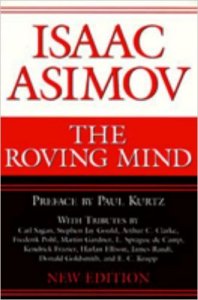 Asimov, Isaac. 1997. The Roving Mind. Prometheus Books. ***
Asimov, Isaac. 1997. The Roving Mind. Prometheus Books. ***
Collection of essays from 1983, reissued with tributes in 1997 following Asimov’s death in 1992. Asimov displays “methodical, cheerful, bluntness” (my words) in several essays about religious radicals (as much an issue in 1983 as now), dismissing the common arguments of creationists against evolution; replies to the common notion that science fiction authors (and readers) must surely “believe” in flying saucers, telepathy, and so on (they don’t); and has an efficient, logical argument about how, if telepathy existed, the world as we know it would make no sense. (post)
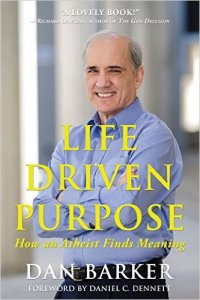 Barker, Dan. 2015. Life Driven Purpose: How an Atheist Finds Meaning. Pitchstone. ***
Barker, Dan. 2015. Life Driven Purpose: How an Atheist Finds Meaning. Pitchstone. ***
An explicit reponse to religious superstar Rick Warren’s “purpose-given life”: you find meaning in your interactions with other human beings, and not in some mythology about a god figure in the sky. Sample: Asking, “If there is no God, what is the purpose of life?” is like asking, “If there is no Master, whose slave will I be?” Barker distinguishes between the purpose “of” life and the many kinds of purpose that can be found “in” life. (post)
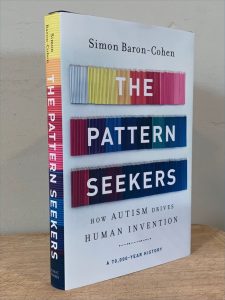 Baron-Cohen, Simon. 2020. The Pattern Seekers: How Autism Drives Human Invention. Basic Books. ** 1/2
Baron-Cohen, Simon. 2020. The Pattern Seekers: How Autism Drives Human Invention. Basic Books. ** 1/2
This uneven book belabors some basic ideas (“if-and-then”) and perhaps oversells its provacative thesis, at least in its subtitle. The core idea is that human invention flowed from the evolution in the brain of a “systemizing mechanism” (or pattern seeking) some 70,000 years ago, and that this system and a complementary “empathy circuit” reside in all minds to varying degrees. Thus five types of brains along a spectrum, one extreme being Extreme Type S, in which the systemizing mechanism prevails; people of this type include inventors (example of Thomas Alva Edison) who are often driven and eccentric, and autistic people. The evidence includes many case studies, genetic studies via 23andme, and analyses of Silicon Valley entrepreneurs, who have more than usual autistic children. (BTW despite a popular movement to say “person with autism,” as if it could be cured, scientists say “autistic person,” since it’s an inherent trait, not a disease, and except in extreme cases can be considered a feature, not a bug.) The future should be the acceptance of neurodiversity and finding appropriate education and work positions for the autistic, to take full advantage of their special skills. (post)
 Bayer, Lex, & Figdor, John. 2014. Atheist Mind, Humanist Heart: Rewriting the Ten Commandments for the Twenty-First Century. Rowman & Littlefield. ***
Bayer, Lex, & Figdor, John. 2014. Atheist Mind, Humanist Heart: Rewriting the Ten Commandments for the Twenty-First Century. Rowman & Littlefield. ***
One attempt among several (as listed on my Principles page) to conceive a more rational, reality-based set of guidelines for living than those to be found in religious texts. Their approach is axiomatic, considering how we can justify any of our beliefs, emphasizing that their conclusions are guidelines, not commandments. Samples: “We act morally when the happiness of others makes us happy.” and “All beliefs are subject to change in the face of new evidence, including these.” The book has a website which has crowdsourced additional guidelines. (post)
 Bering, Jesse. 2011. The Belief Instinct. Norton. ****
Bering, Jesse. 2011. The Belief Instinct. Norton. ****
Notes forthcoming.
- Boghossian, Peter. 2013. A Manual for Creating Atheists. Pitchstone. ***
Boghossian’s first principle is: avoid facts. He calls his methodology “street epistemology” and means engaging in conversations with people about what they believe and why. He distinguishes between religion as a social institution with many admirable qualities, and faith, which he defines as “pretending to know things you don’t know.” He has a chapter devoted to “anti-apologetics” – supplying reasonable responses to the typical challenges from believers about the need for faith and the supposed illegitimacy of science. And he examines the unfortunate effects of a kind of multiculturalism that entails rote acceptance of all points of view about ways of knowing the world, which leads to immunity from criticism of all cultural practices including religion. Academics, he thinks, should support what works, and point out to their students ways of thinking that don’t. (post)
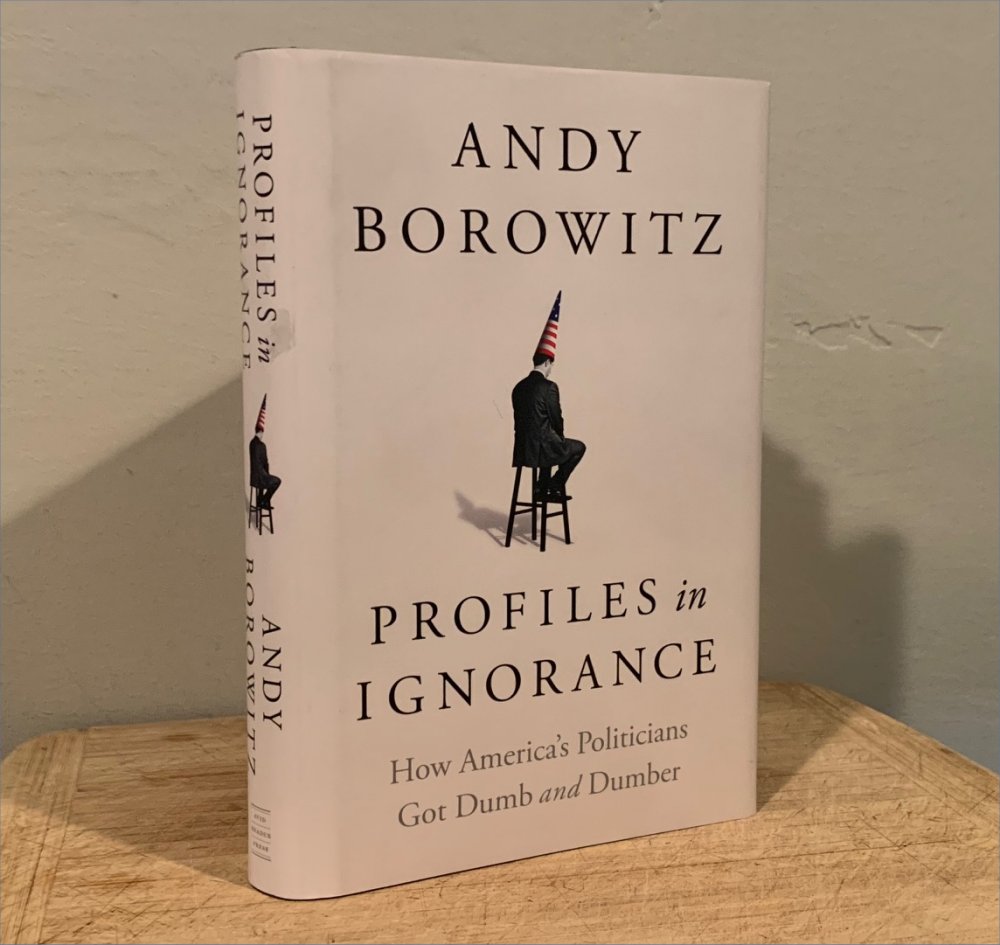 Borowitz, Andy. 2022. Profiles in Ignorance: How America’s Politicians Got Dumb and Dumber. Avid Reader Press. ** 1/2
Borowitz, Andy. 2022. Profiles in Ignorance: How America’s Politicians Got Dumb and Dumber. Avid Reader Press. ** 1/2
Comedian and political observer Borowitz wonder why conservatives prefer dimwit candidates, and goes over the record of the past 40 some years. (And yes, Republicans have done far more dumb things than Democrats.) So: Reagan, Quayle; George H. Bush and Sarah Palin; Trump. Running themes are celebrity, wealth, legacy admissions, uninformed, unnuanced. Common man/dumbbell vs. intellectual/egghead. Solutions? Don’t treat politics like sports, get involved, tell better stories. (post)
- Bregman, Rutger. 2020. Humankind: A Hopeful History. Little, Brown. –
Notes forthcoming
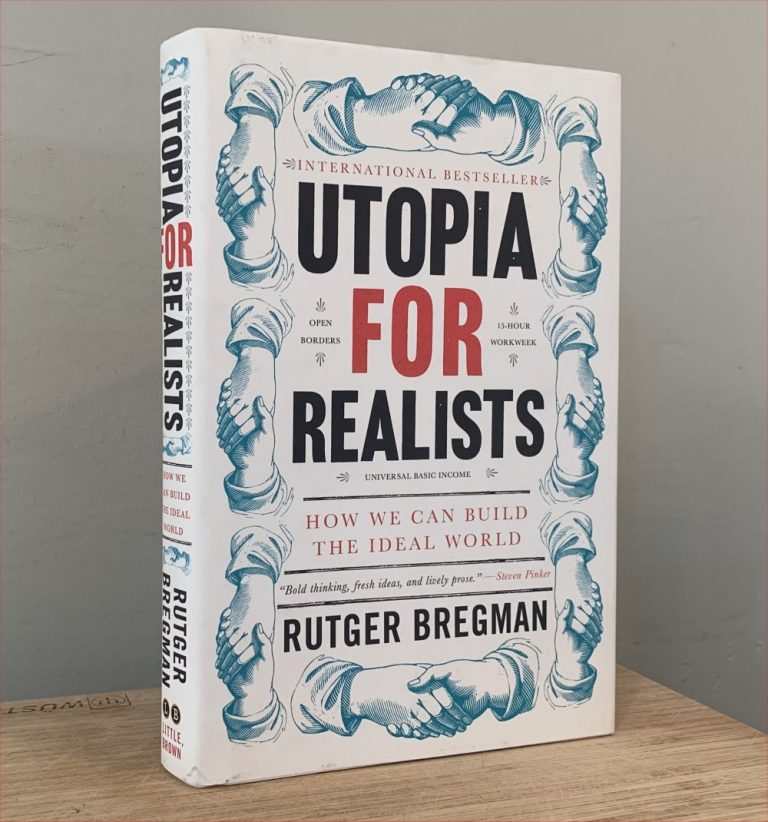 Bregman, Rutger. 2017. Utopia for Realists: How We Can Build the Ideal World. Little, Brown. ***
Bregman, Rutger. 2017. Utopia for Realists: How We Can Build the Ideal World. Little, Brown. ***
This Dutch thinker outlines ways to make the future a better place, with evidence about why they would work: implement a universal income; abandon the Gross Domestic Product (GDP) as a measure of social health; try not to obsess about having more and more stuff, or about the dogma of having to work for a living; open the borders to reduce poverty; be open to radical ways of thinking (but beware the cognitive dissonance of conspiracy theories); and keep the Overton Window in mind, how ideas once dismissed as crazy can come to pass. (post)
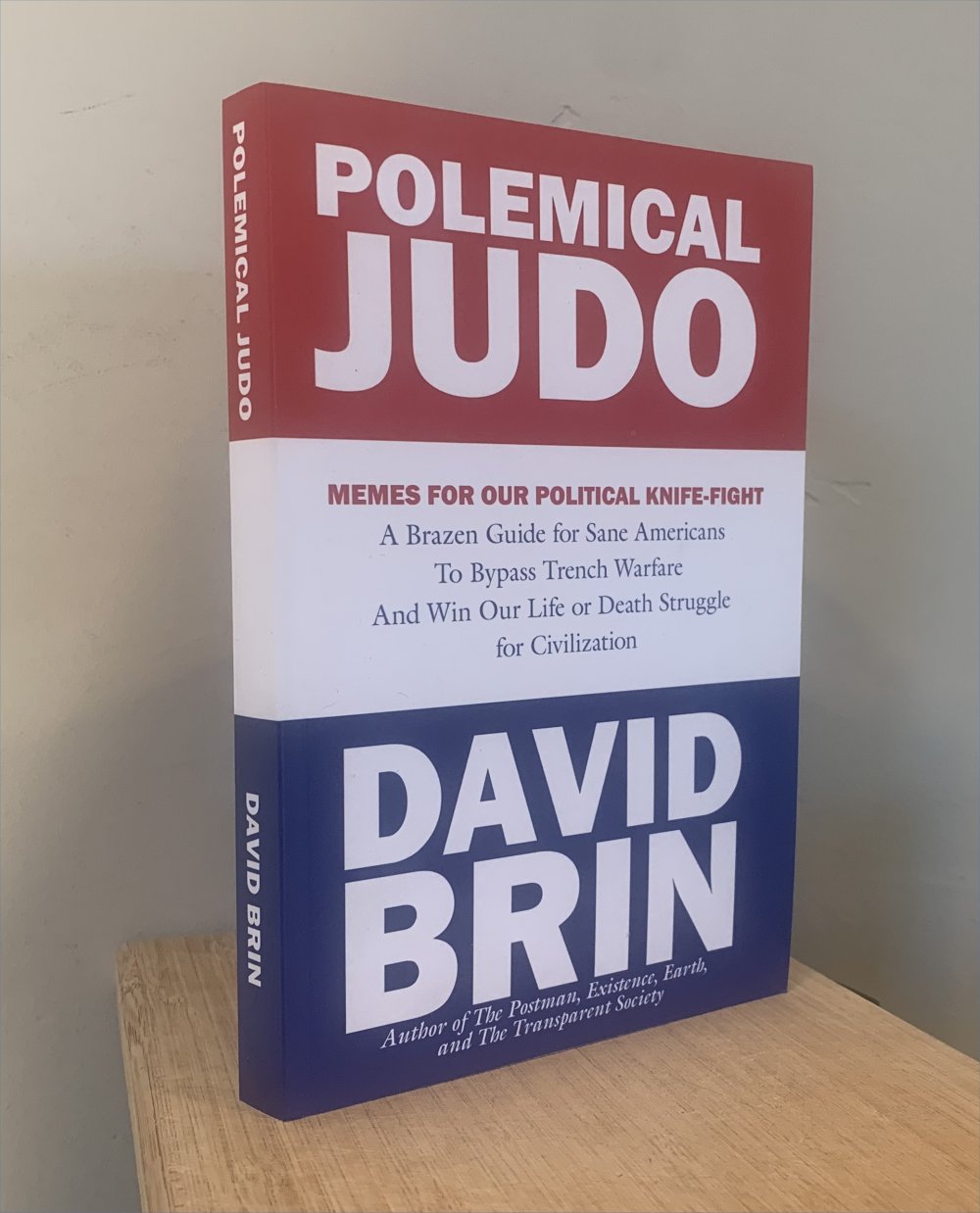 Brin, David. 2019. Political Judo: Memes for Our Political Knife-Fight. self-published. ***
Brin, David. 2019. Political Judo: Memes for Our Political Knife-Fight. self-published. ***
A collection of essays and blog posts expressing Brin’s rage and frustration about the current political situation. He berates Republicans (for being wrong about everything, for winning elections by cheating via gerrymandering and voter suppression) but also criticizes Democrats for being too timid in fighting them back. His big themes: the fact-based professions are under attack by the right (name one that’s not, he challenges); that the way to solve political disputes is to make wagers based on verifiable facts and evaluated by non-partisan judges (e.g. retired military officers). He places current affairs in the context of America’s 250-year-old Civil War between Enlightenment America and Confederate America. Yet he begins by emphasizing the commonalities that most Americans share, and hopes to get off the left-right political axes, determining policy issues based on outcomes and facts. (post)
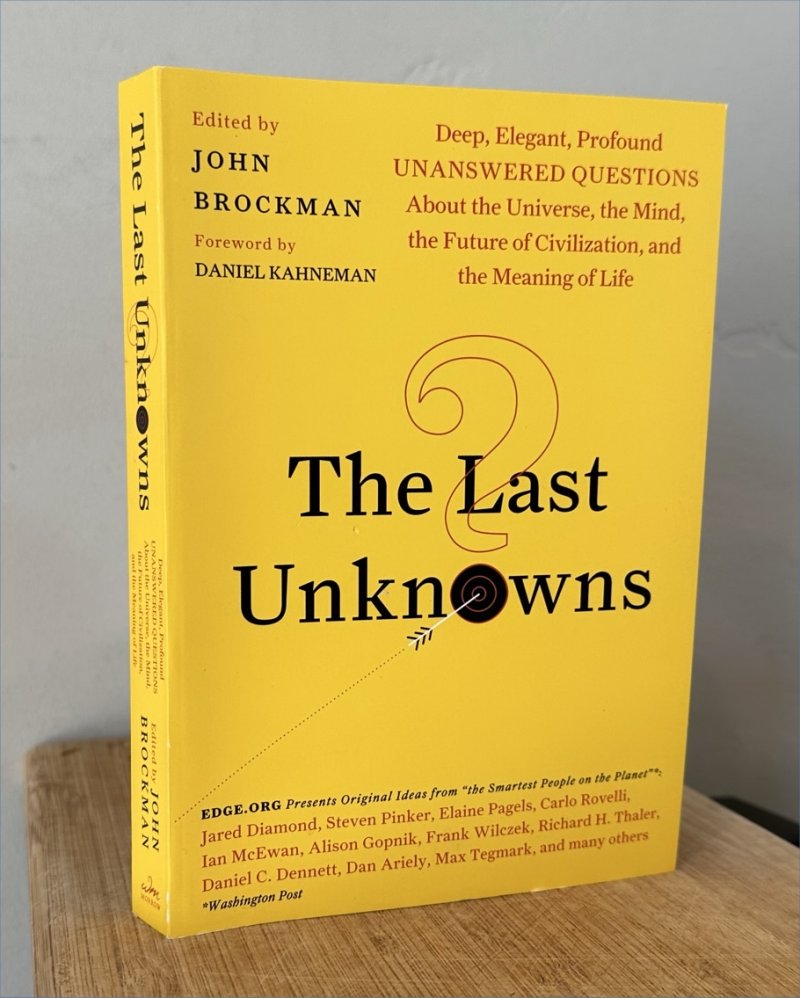 Brockman, John. 2019. The Last Unknowns: Deep, Elegant, Profound Unanswered Questions About the Universe, the Mind, the Future of Civilization, and the Meaning of Life. William Morrow. ***
Brockman, John. 2019. The Last Unknowns: Deep, Elegant, Profound Unanswered Questions About the Universe, the Mind, the Future of Civilization, and the Meaning of Life. William Morrow. ***
Editor and agent John Brockman’s books like this one pose a single question and invite two or three hundreds scientists to respond. In this book, the question is: what is a profound question that remains unanswered? The posts here about this book aren’t a review but rather my own proposed answers, as best as I can guess based on my own reading, to several dozen of these. Scientists include Gregory Benford, Jerry Coyne, Daniel C. Dennett, David Deutsch, Jared Diamond, Jonathan Haidt, Sam Harris, Nicholas Humphrey, and many others whose books I’ve read; and as many or more others unfamiliar to me. (post 1; post 2; post 3; post 4.)
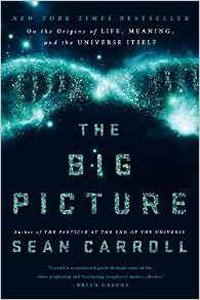 Carroll, Sean. 2016. The Big Picture: On the Origins of Life, Meaning, and the Universe Itself. Dutton. *****
Carroll, Sean. 2016. The Big Picture: On the Origins of Life, Meaning, and the Universe Itself. Dutton. *****
CalTech physicist Carroll describes the perspective we gain from cosmology and science in how we view our world and our place in it: how that understanding is purely materialistic and non-supernatural, and how that’s OK. Carroll avoids the perils of reductionism through the idea of “poetic naturalism” and the notion that we use different kinds of ‘stories’ to describe the world at different levels of complexity or levels of emergence. He discusses how current understanding of physics rules out psychic powers (and life after death), and discusses evolution and the evident lack of ‘purpose’, why we can dismiss various arguments for a god, different ways of thinking [again, Kahneman], morality and meaning of life. He concludes with a list of “Ten Considerations” (rather than Commandments), things to keep in mind while deciding how we want to live. My post includes links to summaries of the book’s six sections on the author’s website, and my own summary and comments on his “Ten Consideration.” (post)
 Christina, Greta. 2012. Why Are You Atheists So Angry?: 99 Things That Piss Off the Godless. Pitchstone. ***
Christina, Greta. 2012. Why Are You Atheists So Angry?: 99 Things That Piss Off the Godless. Pitchstone. ***
Blunt, aggressive responses to what the author thinks are illegitimate claims and presumptions of religion, from blaming 9/11 on the gays, to presuming the enormous universe was made just to humans (while accusing atheists of being arrogant), “I feel it in my heart”, atheism is just another religion, how people “need” religion, and on and on. She considers various soft forms of religion and concludes they are as problematic as fundamentalism, because they all rely on some kind of faith, as opposed to dealing with the real world. She provides her “top ten reasons” she doesn’t believe in God, including the inconsistency of world religions, the complete failure of any sort of supernatural phenomenon to stand up to rigorous testing, and of course the complete lack of solid evidence for God’s existence. She reports evidence that you can argue people out of religion, and discusses her methods. (A different approach than Peter Boghossian’s.) (post)
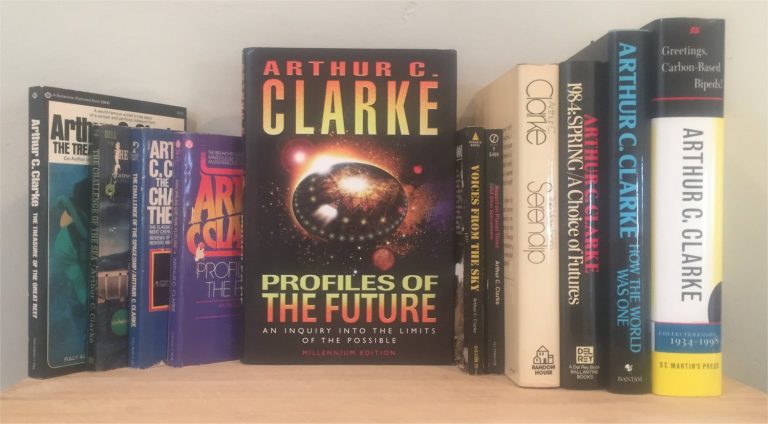 Clarke, Arthur C.. 1999. Profiles of the Future: An Inquiry in the Limits of the Possible. Gollancz. ***
Clarke, Arthur C.. 1999. Profiles of the Future: An Inquiry in the Limits of the Possible. Gollancz. ***
Clarke’s nonfiction book speculating about future technology and science was first published in 1962 and revised three times, the last in 1999. The 1999 version begins with Clarke’s famous “three laws,” the last of which is “Any sufficiently advanced technology is indistinguishable from magic.” After chapters on hazards of prediction, “Failure of Nerve” and “Failures of Imagination,” which look back at previous prophecies, Clarke moves on with chapters about various topics: transportation, overcoming gravity, speed, the future of space, time, resources, manufacturing, and so on. Clarke’s most conspicuous miss is his anticipation of Ground Effect Machines, which he thought would revolution global transport and render coastal ports obsolete; the idea survives as only a few hovercraft. The book ends with a “Chart of the Future,” mapping specific inventions and discoveries to specific dates, with a few predictions on the mark, many others overly-optimistic. (post)
 Coates, Ta-Nehisi. 2015. Between the World and Me. One World. *** 1/2
Coates, Ta-Nehisi. 2015. Between the World and Me. One World. *** 1/2
Memoir by a black intellectual written as a letter to his 15-year-old son on what he can expect as he grows up in America. Coates is deeply bitter but realistic about race relations in the US. Key phrases illuminate his perspective: about “how one should live within a black body” in a society where police are authorized to “destroy your body” even if only mistakenly. About “those Americans who believe they are white” when only a few decades before distinctions between, say, “Catholic, Corsican, Welsh, Mennonite, Jewish,” were very important. There are beautiful passages imagining a “specific slave woman” whose experiences of life are as complex as his son’s own; about the simplicity of seeing the race problem as black vs white; and finally, after visiting the mother of a childhood friend kill by police, reflecting on the “Dreamers” (those who aspire to the world the author cannot) whose technology is plundering the world. These final thoughts align the sins of racism with the hubris of progress that now threaten the safety of the planet. (post)
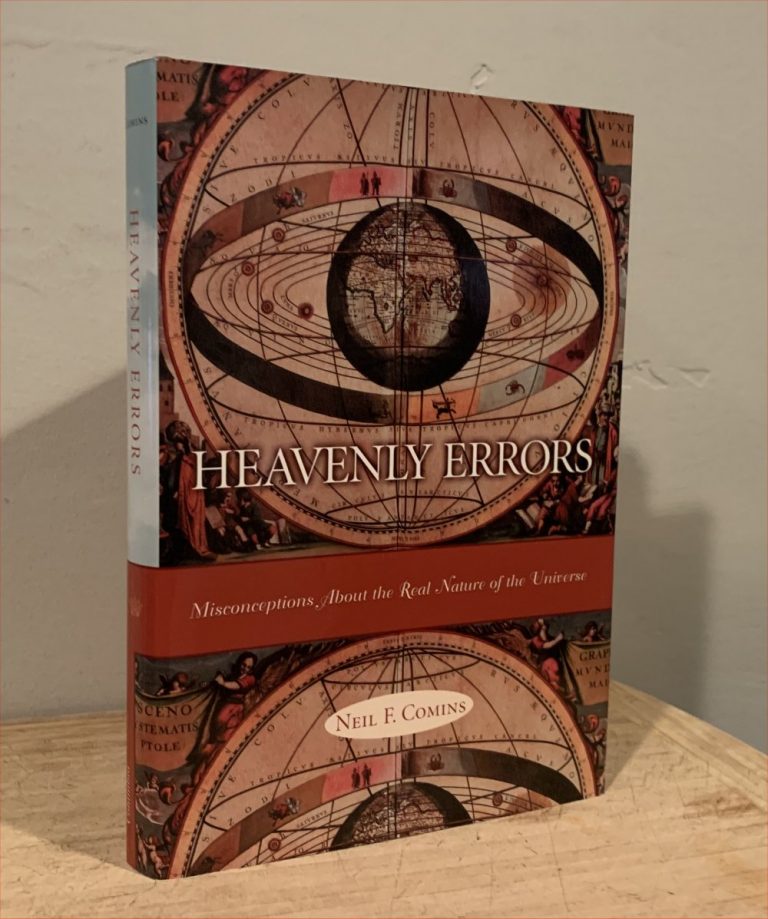 Comins, Neil F.. 2001. Heavenly Errors: Misconceptions about the real nature of the universe. Columbia University Press. ***
Comins, Neil F.. 2001. Heavenly Errors: Misconceptions about the real nature of the universe. Columbia University Press. ***
This book covers such misconceptions as the density of the asteroid belt; why the seasons change; the source of the sun’s energy; what causes the tails of comets; what causes the moon’s phases; the causes of the tides; and so on. But it also explains where these misconceptions come from (cartoons; crude science fiction; pseudoscience in the media; the web), covers why humans draw the wrong conclusions about so many things; how to correct such ideas (with the usual long list of critical thinking guidelines). “Our brains evolved to help us survive, not to comprehend the cosmos.” We form our personal cosmologies in our teens, often shaped by religion; they are difficult to revise, but the reward is intellectual freedom. (post)
 Coyne, Jerry A.. 2015. Faith vs. Fact: Why Science and Religion Are Incompatible. Viking. –
Coyne, Jerry A.. 2015. Faith vs. Fact: Why Science and Religion Are Incompatible. Viking. –
Notes forthcoming.
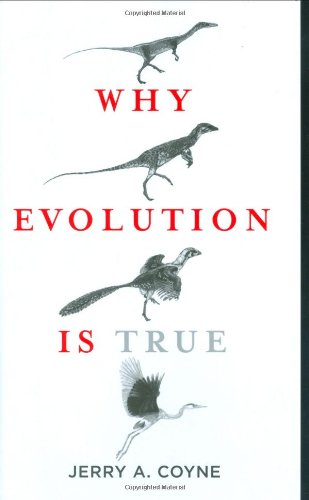 Coyne, Jerry A.. 2009. Why Evolution is True. Viking. *****
Coyne, Jerry A.. 2009. Why Evolution is True. Viking. *****
Coyne outlines the multivarious lines of evidence for the fact of evolution, in the context of the continual social battles and resistance to the idea, especially in the US. He discusses the modern theory of evolution and its six components, including the fact of biological evolution (through all the evidence), the idea of natural selection, and so on, the kinds of predictions it can make as a theory, and how growing evidence over 150 years has repeatedly confirmed those predictions. The lines evidence boil down to 1) the evidence of the fossil record; 2) the evidence of vestiges and atavisms in current biological features that were once useful but are now useless or even harmful; 3) how the distribution of species around the world, on different islands and continents, reflects geological changes over millions of years; 4) how the appearance of “design” is explained by natural selection, an idea that still shocks people; 5) how sex drives evolution, the differing mating strategies of the two sexes prioritizing different kinds of health; 6) how species — populations that don’t interbreed with other groups — arise via reproductive barriers, e.g. separated by mountain ranges, continental drift, etc.; analogous to how languages evolve; and 7) How evidence for human evolution, once only a speculation by Darwin, has been elaborated and compounded. And finally he addresses how evolution entails notions of purpose, morality, and meaning, thus alarming conservatives; but genes aren’t destiny, and we make our own purposes through work, family, avocation, contemplating the universe. (post)
 Craig, Edward. 2020. Philosophy: A Very Short Introduction. Oxford. ** 1/2
Craig, Edward. 2020. Philosophy: A Very Short Introduction. Oxford. ** 1/2
A small book in Oxford’s “A Very Short Introduction” series. Unlike the Nagel volume, this one does discuss a number of specific philosophers and their arguments, and in a chronological framework. The author considers philosophy’s three big questions to be: What should we do? What is there? and, How do we know? Topics include the Crito of Plato, Hume’s argument about miracles, a Buddhist text about Nagasena; general topics and various “isms”; and “high spots” Descartes, Hegel, Darwin, and Nitzsche. And then free will, and asking, what is philosophy for? (post)
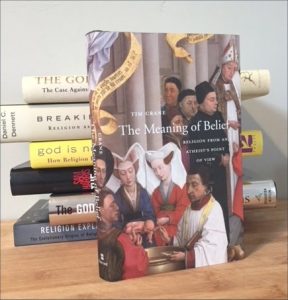 Crane, Tim. 2017. The Meaning of Belief: Religion from an Atheist’s Point of View. Harvard. ** 1/2
Crane, Tim. 2017. The Meaning of Belief: Religion from an Atheist’s Point of View. Harvard. ** 1/2
Philosopher Crane takes issue with the “new atheist” authors, Harris, Dawkins, et al, in their depiction of religion as only about claims of the supernatural (the existence of God; an afterlife). Rather, religion is about identity, about accumulated cultural wisdom about the way to live one’s life, about the ideas of the sacred and the profane. He advises atheists to accept that religion will always exist, and to tolerate believers. (He does not address, or even denies, evidence that religious faith fades with education, and with prosperity.) Discussion at the link includes thoughts about how his ideas intersect with science fiction. (post)
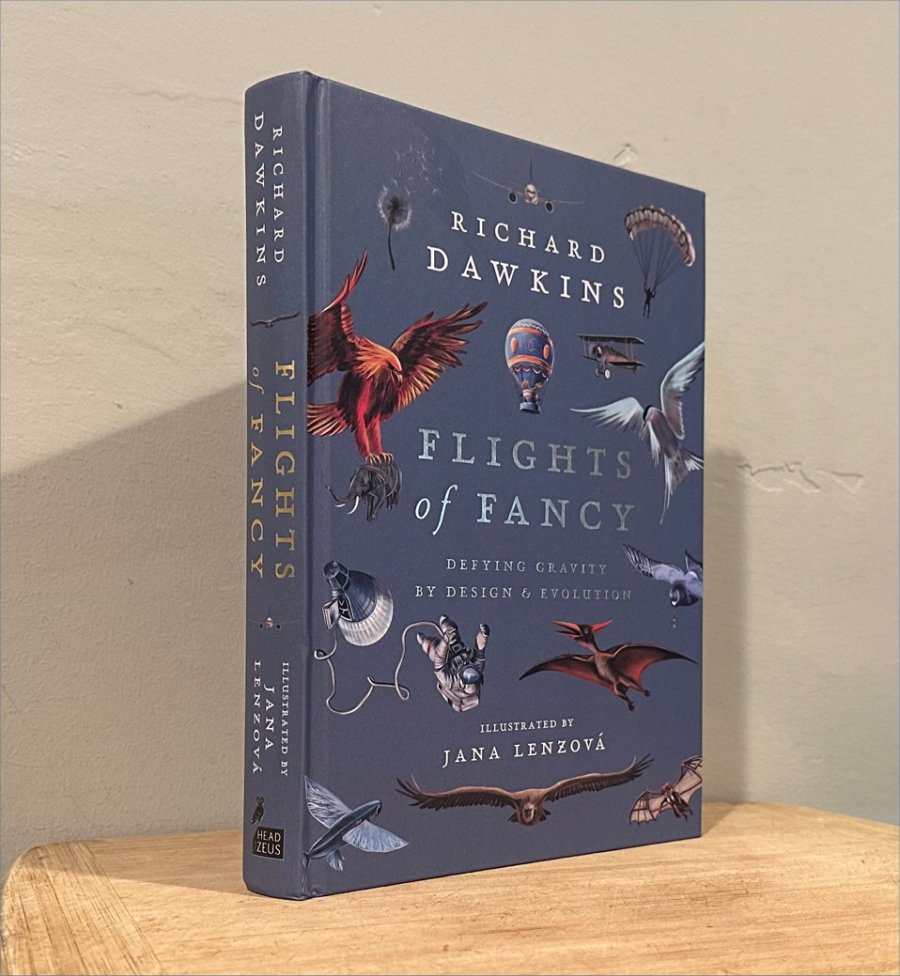 Dawkins, Richard. 2022. Flights of Fancy: Defying Gravity by Design & Evolution. Head of Zeus. ***
Dawkins, Richard. 2022. Flights of Fancy: Defying Gravity by Design & Evolution. Head of Zeus. ***
Rather lightweight, for Dawkins, this is a natural history aimed at younger readers, and profusely illustrated, about the ways both nature and humans have made things that fly. Still, Dawkins take opportunities to discuss evolution and natural selection, with a running theme of how things can look intentionally designed but have actually evolved. In one chapter he focuses on the creationist canard “what is the use of half a wing?” The final chapter invokes what he calls “the outward urge,” reasons why humanity might want to, in effect, spread its seeds into outer space, the way dandelions do theirs on the wind. Dawkins read science fiction as a young man and mentions examples in his books, though none since the 1950s. (post)
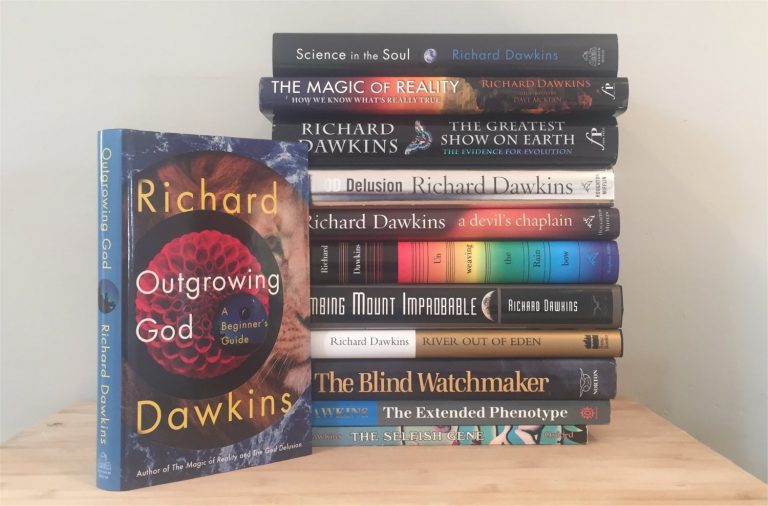 Dawkins, Richard. 2019. Outgrowing God: A Beginner’s Guide. Random House. ***
Dawkins, Richard. 2019. Outgrowing God: A Beginner’s Guide. Random House. ***
A book aimed at younger readers, or adults open to straightforward answers, about why one doesn’t need to believe in God (because, which one?), shouldn’t believe in the literal truth of the Bible, how myths evolve, how morality is possible without the Bible, and so on. It’s a series of “But what about?” questions, covering how we decide what is good, why there is no designer, how we evolved to be religious, and how natural explanations supplant religious myths. (There are ideas here from Dawkins’ earlier books The God Delusion and The Magic of Reality.) For anyone open to rethinking their childhood beliefs in the light of humanity’s centuries-long examination of the real world, of the universe, this is a good starting point (along with Grayling’s The God Argument, listed below). (post)
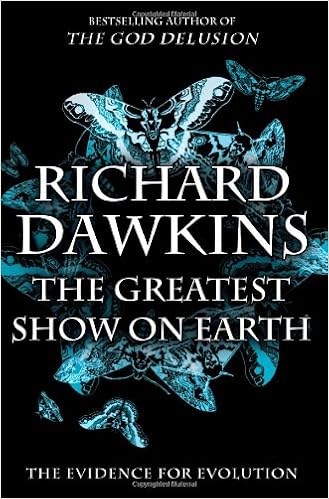 Dawkins, Richard. 2009. The Greatest Show on Earth: The Evidence for Evolution. Free Press. ****
Dawkins, Richard. 2009. The Greatest Show on Earth: The Evidence for Evolution. Free Press. ****
Another excellent book that, like Coyne’s, spells out in great detail the evidence for the fact of evolution. Some points overlap Coyne’s; others provide distinct perspectives. Dawkins in particular offers evidence to challenges the misconceptions of creationists. He begins by emphasizing what the words “theory” and “fact” mean in scientific contexts. Then evolution: why the idea took so long to occur, though the idea of “artificial selection” e.g. breeding of dogs was well-known for centuries; how we date the past; how evolution can occur quickly (e.g. elephants’ tusks); how the idea of “missing links” is a misconception; how a human can arise from a single cell not in a billion years but in nine months; how DNA is not a “blueprint” but rather a set of instructions, like origami; how geographical barriers create new species and explain the distribution of different species around the globe; how our bodies show evidence of vestigal and “unintelligently” designed features; how the ecosystem is terribly designed considered as a whole, and how would creationists explain that?; and finally how Darwin’s worldview, our four kinds of memory, the 2nd law of thermodynamics, and our very existence validates the apparent rarity of life in the cosmos. With an appendix examining acceptance of evolution in various countries — highest in northern Europe, dismal in the US. (post)
 Dawkins, Richard. 2006. The God Delusion. Houghton Mifflin. ****
Dawkins, Richard. 2006. The God Delusion. Houghton Mifflin. ****
Notes forthcoming
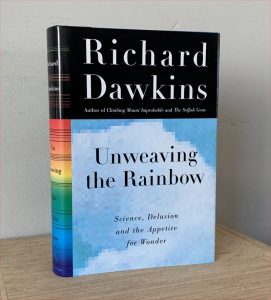 Dawkins, Richard. 1998. Unweaving the Rainbow. Houghton Mifflin. *** 1/2
Dawkins, Richard. 1998. Unweaving the Rainbow. Houghton Mifflin. *** 1/2
Dawkins challenges the notion that understanding the physics behind a rainbow, for example, undermines its beauty. On the contrary, real science provides the same sense of wonder expressed by mystics and poets throughout history. Examples include Newton, prisms, and rainbows; DNA analysis; things we can rule out like astrology and perpetual motion; how to develop habits of mind to overcome superstition. Finally Dawkins speculates about why the human brain is so large, compared to other animals. Nice Sagan quote about the small-mindedness of religious world-views. (post)
 Dawkins, Richard. 1986. The Blind Watchmaker: Why the evidence of evolution reveals a universe without design. Norton. *** 1/2
Dawkins, Richard. 1986. The Blind Watchmaker: Why the evidence of evolution reveals a universe without design. Norton. *** 1/2
The meaning of our own existence has been solved. The apparent problem of complexity is explained by slow, gradual, cumulative natural selection. Our “design” is an illusion; those who reject that are arguing from “personal incredulity,” or from ignorance, or due to the misfiring of our intuitions over large timescales. The eye is not like a watch (or a 747) on the beach; the eye can plausibly have evolved over 10,000 or more steps, each of some increasing benefit. DNA is instructions (not a blueprint) with an extremely low error rate. Other topics: how genes interact with their environments; arms races; the debate between “gradualists” and those who prefer “punctuated equilibria”; how evolutionary relationships exhibit a cladistic taxonomy–once branches split, they never merge again. And alternate explanations to evolution (Lamarckism; creationism) cannot explain life. (post)
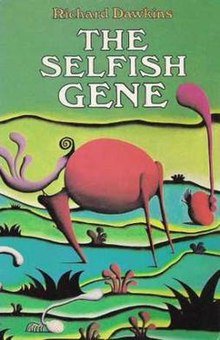 Dawkins, Richard. 1976. The Selfish Gene. Oxford. ****
Dawkins, Richard. 1976. The Selfish Gene. Oxford. ****
Dawkins’ first book and a classic nonfiction book about how natural selection is best understood at the level of the gene, with discussion of replicators and how bodies are “survival machines.” He challenges notions of group selection as expressed in that era, contrasts the survival strategies of plants and animals, describes how kin selection explains aggression, altruism, competition between siblings, and differing strategies of fathers and mothers. How “evolutionary stable strategies” develop to understand how proportions of populations evolve into stability. Finally this book introduces the now common idea of the “meme,” a replicator that’s a unit of culture, that spreads through brains because it serves a cultural function or provides psychological appeal (e.g. the idea of god; patriotism). Genes can disperse in a few generations, while memes, a person’s contribution to culture, can last millennia. (A follow-up post discusses Wilson and group selection.) (post)
Dennett, Daniel C.. 2013. Intuition Pumps and Other Tools for Thinking. Norton. ***
Notes here cover the opening portion of the book, listing a dozen general “tools,” some useful, some to avoid: Making mistakes; Reductio ab absurdum; Rapoport’s rules; Sturgeon’s Law; Occam’s Razor; Occam’s Broom; Using lay audiences as decoys; Jootsing; Goulding; “Surely”; Rhetorical questions; and Deepities. (notes, with comments about how science fiction is an intuition pump)
 Dennett, Daniel C.. 2006. Breaking the Spell: Religion as a Natural Phenomenon. Viking. ****
Dennett, Daniel C.. 2006. Breaking the Spell: Religion as a Natural Phenomenon. Viking. ****
The most philosophical of the books published in the 2000s by the so-called “new atheists,” this book doesn’t challenge religious claims, but considers how to study religion as a natural phenomenon, as a part of the evolution of human nature, to explore how it arose and to what extent it still plays a role. His approach is cautious, beginning with a justification for why such a study is valuable, despite the offense some of the faithful might take. He reviews the deep roots of religion, with the mind’s agent-detector and “intentional stance” leading to animism, folk religions, and how groups maintain themselves whatever their purpose. Now we have “belief in belief” and belief without understanding, rather like falling love, not subject to rational consideration. Studies can be done about whether religious belief is beneficial, or whether prayer really works; some such studies have been done, and the faithful ignore them. We can say that religion does not inspire morality; more the opposite. Nor are atheists self-centered know-it-alls; rather it’s an error to think belief in the supernatural is required in order to be good. Ethical questions remain about the education of children: author advises teaching them all religions, so they can make informed choices; shielding them from the world leads to toxic religions and terrorism. (post #1; post #2; post #3)
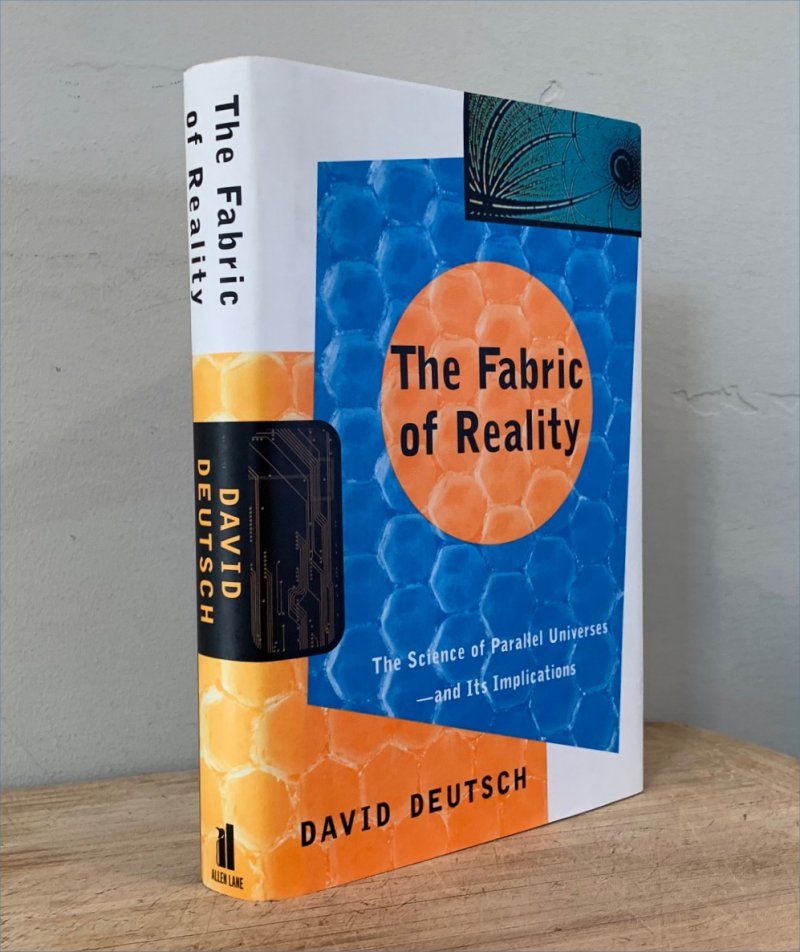 Deutsch, David. 1997. The Fabric of Reality: The Science of Parallel Universes—and Its Implications. Allen Lane. ****
Deutsch, David. 1997. The Fabric of Reality: The Science of Parallel Universes—and Its Implications. Allen Lane. ****
Not entirely about parallel universes, per se, the book describes how the increase of knowledge over the centuries has, paradoxically, made it easier to understand the universe, since the many earlier theories about various phenomena have merged into just a handful of “deep” theories — namely, quantum physics, epistemology, computation, and evolution — which comprise a “theory of everything” that can be understood. The book shows how these four ideas are analogs of each other, and how they do, via quantum mechanics, imply the existence of parallel universes, and even time travel of a sort. Provocative and at times abtruse, the author’s clear language nevertheless evokes a universe that is, if not unintelligible, in no way intuitive. (post)
 Diamond, Jared. 1997. Guns, Germs, and Steel: The Fates of Human Societies. Norton. ****
Diamond, Jared. 1997. Guns, Germs, and Steel: The Fates of Human Societies. Norton. ****
Notes forthcoming
 Didion, Joan. 2005. The Year of Magical Thinking. Knopf. *** 1/2
Didion, Joan. 2005. The Year of Magical Thinking. Knopf. *** 1/2
Novelist and screenwriter Didion’s memoir about the sudden death of her husband John Gregory Dunne, in their apartment on New York’s upper east side, in Dec. 2003. The narrative follows details from ambulance trips to their daughter’s own hospital stays to learning how to live daily without his presence, in parallel with the gradual realization tht she is not thinking rationally, experiencing a kind of cognitive dissolance she comes to call “magical thinking.” She’s very matter of fact about the famous people they know, the exotic places they’ve lived, but also introspective in her speculations on how things might have gone otherwise, the role of luck in events, while being unable to completely avoid those magical habits of mind. As such it’s an example of struggling to reconcile the animistic thinking of base human nature with the conscious awareness needed to navigate modern society. (post)
- DK. 2016. Big History: Examines Our Past, Explains Our Present, Imagines Our Future. DK. –
Notes forthcoming
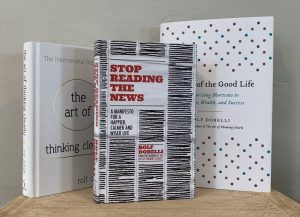 Dobelli, Rolf. 2020. Stop Reading the News: A Manifesto for a Happier, Calmer and Wiser Life. Sceptre. ** 1/2
Dobelli, Rolf. 2020. Stop Reading the News: A Manifesto for a Happier, Calmer and Wiser Life. Sceptre. ** 1/2
A short, counter-intuitive book by a European author and entrepreneur who advises his readers to give up reading and watching the news, all of it: you won’t be distracted by trivia, you’ll have more time to yourself, you’ll hear about major news events from your friends. At best, news is entertainment, he claims. He makes many good points but some of his recommendations are impractical for most people, e.g. cultivate fellow professionals with whom to have informative lunches. (post)
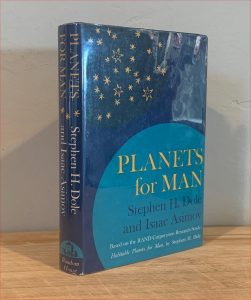 Dole, Stephen H., & Asimov, Isaac. 1964. Planets for Man. Random House. ***
Dole, Stephen H., & Asimov, Isaac. 1964. Planets for Man. Random House. ***
I read this in 1970 and reread it again in 2021; it’s interesting to compare to the recent books by Adam Frank and Jamie Green. Asimov assesses the characteristics necessary to make a planet suitable for human habitation, e.g. suitable gravity, light, and so on, and then, in a process much like the famous Drake Equation, assesses the likelihoods of habitable planets around 14 of the nearest stars, finding the most likely system for such a planet to be Alpha Centauri A and B. Of course, our assessment of some of these factors has changed over the decades — especially the number of stars likely to have planets — but all the factors remain relevant. (post)
- Doxiadis, Apostolos, & Papadimitriou, Christos H.. 2009. Logicomix. Bloomsbury. –
Notes forthcoming
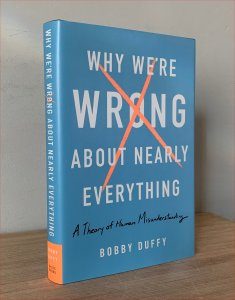 Duffy, Bobby. 2019. Why We’re Wrong About Nearly Everything: A Theory of Human Misunderstanding. Basic Books. ***
Duffy, Bobby. 2019. Why We’re Wrong About Nearly Everything: A Theory of Human Misunderstanding. Basic Books. ***
This book isn’t aligned with Shermer or Shtulman as much as to Rosling’s FACTFULNESS in its focus on contemporary issues. Duffy studies where people’s views of the world are wrong, then shows which biases or social effects cause those views. Many of us get lots of basic facts wrong, due to faulty thinking, media and politicians, and our delusions; overcoming these delusions comes from realizing the complexity of the problem. Topics include health, sexual, and money matters; immigration, religion, crime; politics including Brexit and Trump (both case studies for understanding how our delusions are driven by preexisting beliefs and wishful thinking); filtering and bubbles; foreign aid. The general trend is that people overestimate how bad things are. Which country is the most wrong? Italy. 2nd place: US. Techniques to be less wrong: beware “rosy retrospection” (i.e. the past was better than the present); don’t deny emotions but challenge the thought; avoid the extremes; beware personal experience; learn to recognize fake news; cultivate critical, statistical, and news literacy. (very long notes with lots of examples)
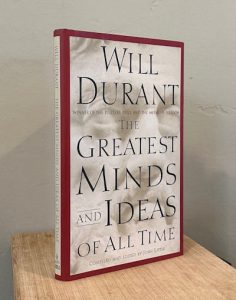 Durant, Will. 2002. The Greatest Minds and Ideas of All Time. Simon & Schuster. ** 1/2
Durant, Will. 2002. The Greatest Minds and Ideas of All Time. Simon & Schuster. ** 1/2
Durant was a well-known historian and public intellectual up until his death in 1981; his major work was the 11-volume THE STORY OF CIVILIZATION, written with his wife. This book is a compilation of various essays, presumably from magazines, amounting to a philosophy fan-boy’s collection of top ten lists. So we get the ten greatest thinkers, ten greatest poets, a hundred best books for an education, and so on. He defends the “great man” theory of history, and his certainty about his choices seems immune from reconsideration (e.g. whether Plato was actually correct or not). At the same time he anticipates Steven Pinker’s later ideas about the progress of morality through the ages. And a quote from Durant’s Wikipedia page reveals his notions about the inevitable decline and rebuilding of civilizations, due to clash between knowledge and mythology/religion. (post)
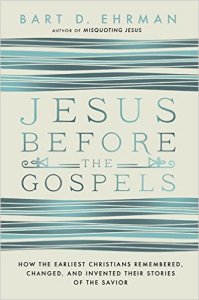 Ehrman, Bart D.. 2016. Jesus Before the Gospels: How the Earliest Christians Remembered, Changed, and Invented their Stories of the Savior. HarperOne. ** 1/2
Ehrman, Bart D.. 2016. Jesus Before the Gospels: How the Earliest Christians Remembered, Changed, and Invented their Stories of the Savior. HarperOne. ** 1/2
Prolific Biblical scholar Ehrman discovers a new tool for exploring the Bible to deduce which parts are fancy and which might have bases in fact: the fallibility of memory. Especially considering the decades that passed before the gospels were actually written down. Unfortunately he conflates the related idea of how stories told and retold over generations succumb to the human bias toward narrative with matters of memory. Still, there are fascinating discussions here of how the gospels came to be chosen (and rival stories were not), and how some of the stories in the gospels are implausible on their face (the market, the trial before Pilate, the Sermon on the Mount), though again these are matters of storytelling and not about memory per se. (post)
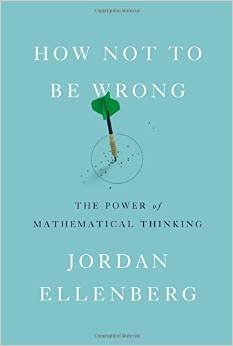 Ellenberg, Jordan. 2014. How Not to Be Wrong: The Power of Mathematical Thinking. Penguin. ****
Ellenberg, Jordan. 2014. How Not to Be Wrong: The Power of Mathematical Thinking. Penguin. ****
How to apply mathematical concepts to everyday situations that are often misunderstood by ordinary “common sense.” Among the many topics: the dangers of simple linear relationships, simplistic trend extrapolations, and proportions (with examples of political claims that illustrate these); the dangers of inference (improbable things happen a lot, in large enough samples); limits of prediction in chaotic situations; how to apply Bayesian inference (e.g. applied to the creation of the universe); the idea of expected values; balance of cost vs. convenience; the flaw of Pascal’s Wager; regression and correlation (it’s not always wrong to be wrong — you can’t wait for perfect evidence to make a decision); problems with opinion polls; various voting methods; and conflicts between what is true and what is right, when no new evidence is allowed. How to be right: try to prove your theorem by day, disprove it by night, and apply to all areas of life. A valuable complement to books about rhetoric and mental biases. [part 1; part 2; part 3]
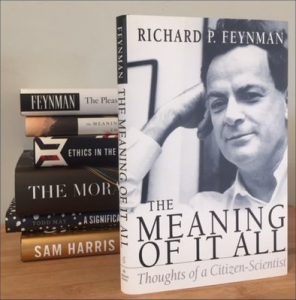 Feynman, Richard P.. 1998. The Meaning of It All: Thoughts of a citizen-scientist. Addison Wesley. ***
Feynman, Richard P.. 1998. The Meaning of It All: Thoughts of a citizen-scientist. Addison Wesley. ***
Three essays delivered as lectures in 1963, concerning science, religion, and public credulousness. Science has three aspects: method, results, technology. Some uncertainty always remains. Similarly with values, as he reflects on why most scientists don’t believe, and how moral values are not affected by loss of belief. And about how little most people understand about our scientific age, politicians who have quick answers to complex problems, a lack of understanding of the complexity of the world, of having a sense of proportion. (post)
 Frank, Adam. 2023. The Little Book of Aliens. Harper. ***
Frank, Adam. 2023. The Little Book of Aliens. Harper. ***
More pop-oriented than Frank’s previous book, this considers what ordinary people think about the topic of aliens. Usually, UFOs. He outlines the history of speculations about aliens (Drake’s equation, etc.), UFO sightings, SETI, and now UAPs. Then considers how we would find intelligent aliens, if they exist: by looking for biosignatures, and technosignatures, and what those mean. (Attempts to contact aliens via signals, as in Project Ozma, have been largely abandoned.) The substantial recent developments I hadn’t read about in other books concern the results of the orbiting observatory Kepler over the past two decades: it has found planets around virtually every star examined. This has great implications on the results of Drake’s equation. Further, the various systems of planets are never in the same arrangement as in ours, with small rocky planets close to the sun, big gas planets farther out. In passing, Frank notes that climate change may be an unavoidable consequence of developing technology; and how monobiome planets, all water or all desert, aren’t as implausble as I once thought. (post)
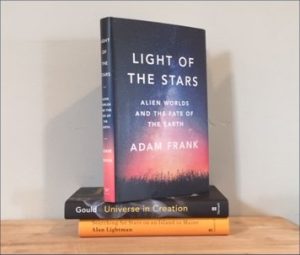 Frank, Adam. 2018. Light of the Stars: Alien Worlds and the Fate of the Earth. Norton. ***
Frank, Adam. 2018. Light of the Stars: Alien Worlds and the Fate of the Earth. Norton. ***
A consideration of our planet’s future and reconsidering the Drake equation, in light of the discovery of thousands of extra-solar planets and our understanding of how civilizations might become sustainable. With a revision of the ‘Kardashev Scale’ about planetary energy use, to a scale that considers how planets exist with their biosphere. (post)
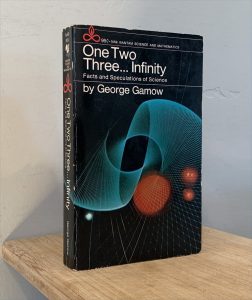 Gamow, George. 1961. One, Two, Three…Infinity. Bantam. *****
Gamow, George. 1961. One, Two, Three…Infinity. Bantam. *****
First published 70 years ago, this is dated now of course, lacking 70 years of advancements in all the sciences since it was first published. But in its time this was one of the best popular science books ever written, covering the basics of numbers, space and time, chemistry and biology, astronomy and cosmology. Personally, when I read this at age 14, I was especially impressed by the sections about infinities, and the history of how humans, step by step, discovered the size and shape of the Earth, the solar system, the stars, the galaxies. My copy shown here is the 1967 Bantam edition. (post)
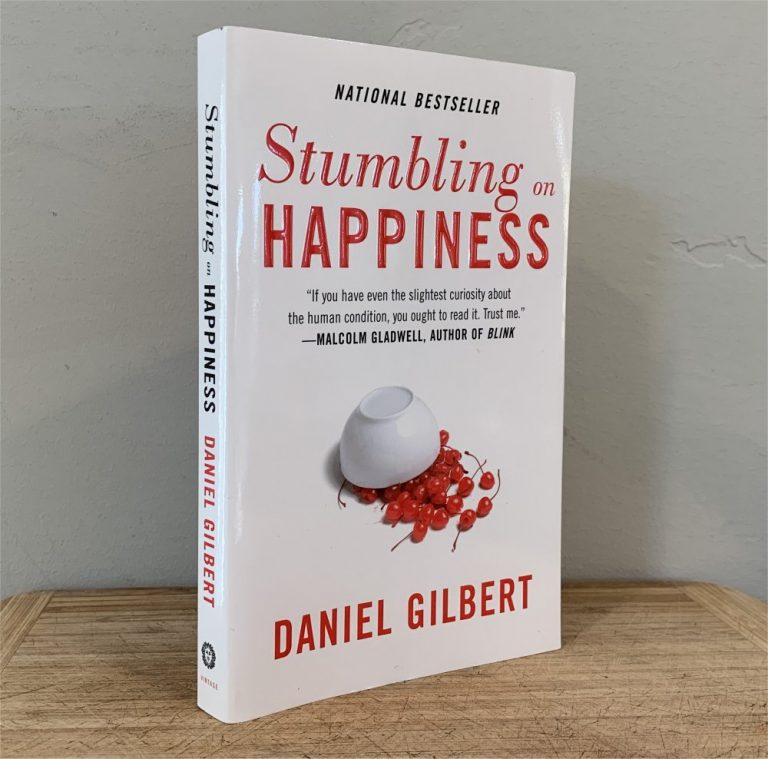 Gilbert, Daniel. 2007. Stumbling on Happiness. Vintage Books. ***
Gilbert, Daniel. 2007. Stumbling on Happiness. Vintage Books. ***
The Harvard psychologist explores why people aren’t very good about identifying what makes them happy, or even understand what happiness is. The book is blurbed with various paradoxical scenarios that play to this theme, e.g. Why are lovers quicker to forgive their partners for infidelity than for leaving dirty dishes in the sink? Overall answers: people aren’t good at anticipating the future; and since most people think they are special, they don’t rely on other people to testify about what makes them happy. The answer to the problem is, people *should* rely on the testimony of others. Trust them. (Shown here is my 2007 reprint edition of the 2006 original edition.) (post)
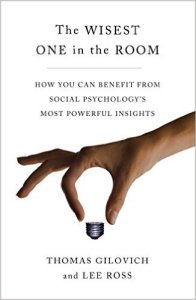 Gilovich, Thomas, & Ross, Lee. 2015. The Wisest One in the Room: How You Can Benefit From Social Psychology’s Most Powerful Insights. Free Press. ***
Gilovich, Thomas, & Ross, Lee. 2015. The Wisest One in the Room: How You Can Benefit From Social Psychology’s Most Powerful Insights. Free Press. ***
Another reflection on the kinds of psychological illusions people are subject to, now extended to advice about how to apply them to personal and social issues. On the former are five “pillars of wisdom”: the objectivity illusion (and problems with media ‘balance’); priming and the fundamental attribution error; how framing shapes understanding; how behaving can bring about results, and how good and evil are a matter of perception; and various mental biases like cherry-picking, intuitive and rational thinking, confirmation bias. The second part of the book is about “Wisdom Applied”: act like a happy person, applying the peak-end rule, valuing experiences over possessions, and avoiding regrets; get along with others by being a sophisticated consumer of news, by creating situations where resolutions must succeed, focus on the middle ground of people who aren’t invested in the status quo and so can’t afford to change; and finally two chapters about how to apply these ideas to social problems in America, and addressing climate change by the world. The epilogue describes how Nelson Mandela united South Africa with a rugby match, using all of the five elements in the last half of this book. (summary part 1; summary part 2)
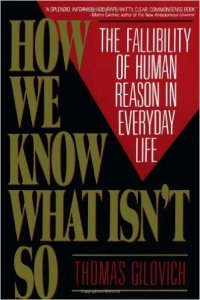 Gilovich, Thomas. 1993. How We Know What Isn’t So: The Fallibility of Human Reason in Everyday Life. Free Press. ***
Gilovich, Thomas. 1993. How We Know What Isn’t So: The Fallibility of Human Reason in Everyday Life. Free Press. ***
One of the earliest books about how unconscious mental biases influence how people receive and understand information, with discussions of the Lake Wobegon effect, confirmation bias, etc.; how stories are told via ‘sharpening’ and ‘leveling’ to make them serve higher causes than accuracy; how people should develop habits of mind to correct such biases, including the value of a science education with the concepts of control groups, regression, doubt, and uncertainty. (post)
 Gladstone, Brooke. 2017. The Trouble with Reality: A Rumination on Moral Panic in Our Time. Workman. ** 1/2
Gladstone, Brooke. 2017. The Trouble with Reality: A Rumination on Moral Panic in Our Time. Workman. ** 1/2
“On the Media” radio show co-host’s short book is an essay with themes that overlaps Kakutani’s, considering the existential question about reality and how we perceive it, and considering how Trump fits the criteria for a demagogue in trying to establish his own reality. Conclusion is that self-deception will undermine him, and that we all need to be aware the real world will catch up with whatever personal facts we possess. (post)
 Gottschall, Jonathan. 2021. The Story Paradox: How Our Love of Storytelling Builds Societies and Tears Them Down. Basic Books. *** 1/2
Gottschall, Jonathan. 2021. The Story Paradox: How Our Love of Storytelling Builds Societies and Tears Them Down. Basic Books. *** 1/2
The paradox is that stories are necessary, but poisonous in some circumstances. The writer makes a host of key points, some familiar, some new to me. Storytellers rule the world, as used by totalitarian regimes including church dogmas, with the most contagious stories ever told being the gospels of Jesus. Conspiracies theories are actually conspiracy stories. Stories are about characters trying to resolve predicaments, and they have moral dimensions. They can evoke empathy for people different than the reader, but at the same time require a villain. We inherit our stories, as others inherit theirs (somewhat undermining the notion of essential evil). Narrative is reductionist, simplifying the world; we defend our stories to avoid loss of meaning. The escape from the rule of stories in the Dark Ages was by evidence that lifted us into the Enlightenement. But now we face one of the most successful storytellers in history: Big Blare [i.e. Trump]. Solutions? Don’t assault stories per se; find out which narratives about reality are true and which are false. And yet authoritarian system have been more common and stable over history that democracies. My own thoughts in the post conclude with the notion that perhaps both democracy and science are passing fades in human history, destined to give way inevitably to yet new authoritarian regimes (including Trump’s) and their “stories”; and how this spills over into the plausibility of traditional science fiction scenarios. (post)
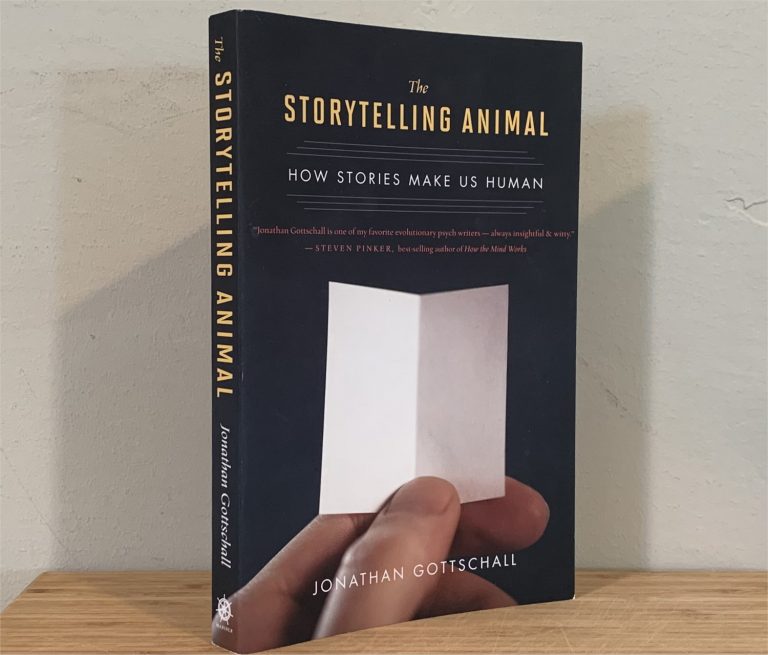 Gottschall, Jonathan. 2013. The Storytelling Animal: How Stories Make Us Human. Mariner. ***
Gottschall, Jonathan. 2013. The Storytelling Animal: How Stories Make Us Human. Mariner. ***
How humans think of everything in terms of story, from how children play to adult pop music, daydreams, courtroom cases, TV commercials, even pro wrestling. Stories are about conflict, and are attractive perhaps as rehearsals for situations we will face in real life. Religion conveys history through stories. Our memories are misremembered to make better stories. The lessons here are to acknowledge the power of stories; they’re not wastes of time. Be tolerant of national and religious myths; but beware your inner storyteller locking into the overdrive of conspiracy theories. (post)
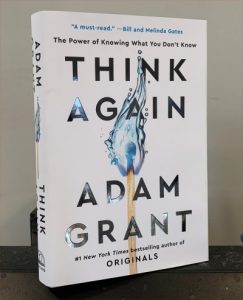 Grant, Adam. 2021. Think Again: The Power of Knowing What You Don’t Know. Viking. ***
Grant, Adam. 2021. Think Again: The Power of Knowing What You Don’t Know. Viking. ***
With the flavor of a self-help book (it’s full of examples and anecdotes and a list of take-aways) this asks you to consider “knowing what you don’t know” in order to become a life-long learner (just as science asks you to update provisional conclusions with new evidence). Much of this echoes the themes of psychological biases and perceptual illusions from many other books, but there were several key ideas, some already familiar, that I took away. First: the ways in which those who don’t think like scientists are inclined to preach, prosecute, or politick (an interesting tripartite which strikes me as how most of the non-scientific world works). Others: ask what evidence would change your mind; consider complexity (there are more than two sides to every story; avoid black & white, right & wrong); abandon best practices; throw out your ten-year plan. I take issue with his notion about best practices, which was essential in aerospace when I worked there, but his point is merely to never think your practices are perfect. Well of course; what I did in aerospace was to continually improve our best practices. (post)
 Grayling, A. C.. 2013. The God Argument: The Case Against Religion and for Humanism. Bloomsbury. *****
Grayling, A. C.. 2013. The God Argument: The Case Against Religion and for Humanism. Bloomsbury. *****
British philosopher Grayling’s book is a worthy, graceful companion to the relatively incendiary books of the 2000s by “new atheists” Harris, Dawkins, and Hitchens. He provides a reasoned discussion of the pitfalls of the religion and a defense of the life-enhancing alternative, that of humanism. He dismisses the defenses of religious apologists, and defends humanism as based on the best, most generous, most sympathetic understanding of human reality: How faith is held despite evidence, or despite the faith of those with different faiths, just as we dismiss the myths of the Greeks and Babylonians. The classic arguments for God might as well prove Zeus, as the Christian God. The portion of humanity that is not Christian are not, in fact immoral; they do not depend on the Bible and its commandments to understand what is right or wrong. The second half of the book focuses on the positive: the case for humanism. Religion, based on “superstitions of illiterate herdsmen living several thousands of years ago,” deserves no privileged place in society. Humanism is the ethical outlook that says each individual is responsible for choosing his or her own values and goals, and is responsible for living considerately of others. Grayling describes 10 criteria for living a good life, and says the meaning of life is what you make it: loving someone, raising children, succeeding in one’s field; having integrity, being honest. How morality is an objective matter, about our fellow humans, without reference to any deity. If I were to recommend one book to believers who have doubts, or to believers who simply want to understand why nonbelievers cannot accept what believers feel to be the obvious truth of their faith, it would be this one.[Quote of first paragraph: “To put matters at their simplest…”; full discussion]
 Grayling, A. C.. 2007. Against All Gods: Six Polemics on Religion and an Essay on Kindness. Oberon. **
Grayling, A. C.. 2007. Against All Gods: Six Polemics on Religion and an Essay on Kindness. Oberon. **
Short essays first published as newspaper pieces, about atheists, humanists, and secularists, the death throes of religion, and the alternative of humanism. Pointed, but not as eloquent as his later book The God Argument: The Case Against Religion and for Humanism (2013) (post)
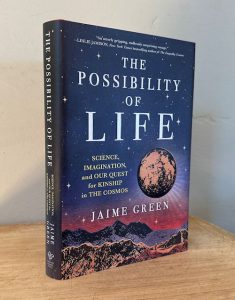 Green, Jaime. 2023. The Possibility of Life: Science, Imagination, and Our Quest for Kinship in the Cosmos. Hanover Square Press. ** 1/2
Green, Jaime. 2023. The Possibility of Life: Science, Imagination, and Our Quest for Kinship in the Cosmos. Hanover Square Press. ** 1/2
Thematically similar to Adam Frank’s LITTLE BOOK, focusing on the nature of life in the universe within the context of cosmic history, from the origin of life, the planets, of animals and people, and possible contact with other intelligent life. This book is replete with references to science fiction, mostly TV and movies but also some novels and even short stories, by authors from Le Guin to Baxter to Butler to Lem to Chiang to Mieville. Like Frank she considers biosignatures and SETI. She admits she’s not concerned with odds; life might indeed be extremely rare, but thinking about it is what matters. In passing, I noted her point that life on Earth is so various that animals in Australia, for example, might as well be aliens compared to the rest of the world. (post)
 Greene, Brian. 2020. Until the End of Time: Mind, Matter, and Our Search for Meaning in an Evolving Universe. Knopf. *****
Greene, Brian. 2020. Until the End of Time: Mind, Matter, and Our Search for Meaning in an Evolving Universe. Knopf. *****
A big picture book about the history of the cosmos, and humanity, with much familiar material but also two key themes of Greene’s own: the idea of nested stories to understand reality at various scales, and his idea of what kind of meaning we can deduce from our existence and the future of the universe. Early chapters concern entropy and evolution, and especially what the former actually means. Complexity including life, apparently contradicting the second law of thermodynamics, is possible because of what Greene calls the “entropic two-step,” essentially meaning the local complexity here will eventually drain back in the environment later. Then: the history since the big bang, “inflation” as the rare but inevitable consequence of repulsive gravity, the formation of the elements and of structures resulting in life. Darwinism at the molecular level. Life led to consciousness and the mind, and then to imagination, in particular to stories and why they are useful. Stories became religions with survival values and notions of the sacred. How beliefs arise, evolving to promote survival, not to understand reality. The roles of art in human society; artistic truth tells a higher-level story. The author fulfills the promise of the title by projecting the deep future: the fate of the sun and earth, black holes that sweep the galaxies clean. Thought might survive even the existence of matter, if it slows way down. Then the end of time and the disintegration of emptiness. Finally, meaning: There is no grand design or purpose; we exist while an infinite number of other possible people do not. Beyond that, perhaps our brains are not structured to answer the deep questions. We construct our own meaning. Perhaps, in the end, it is only story. (post 1; post 2; post 3; post 4; post 5)
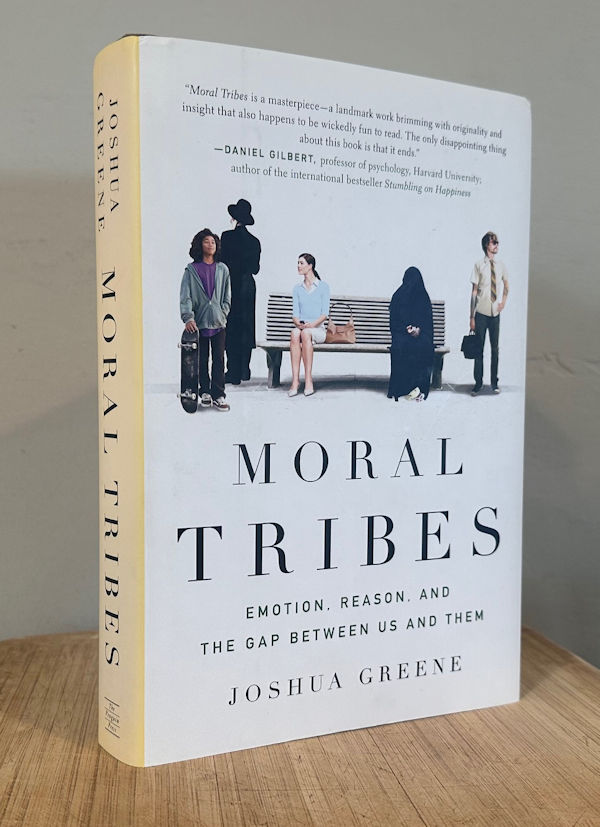 Greene, Joshua. 2013. Moral Tribes: Emotion, Reason, and the Gap Between Us and Them. Penguin. *****
Greene, Joshua. 2013. Moral Tribes: Emotion, Reason, and the Gap Between Us and Them. Penguin. *****
Keying off Garrett Hardin’s “tragedy of the commons,” the author explores the “tragedy of commonsense morality” to show the effects of different moral policies for sharing resources and dealing with conflicts. How did cooperation evolve at all, given Darwinian competition? Morality evolved to enable it, via altruism and unselfishness, as humans formed groups (tribes). But now humanity is in need for a “meta-morality” to avoid conflicts and solve problems among all tribes. Greene summarizes the roots of morality via the Prisoner’s Dilemma, tit for tat, Hobbes’ Leviathan, the trolley problem, etc. The solutions of this morality don’t always work in the modern world. His solution is a modified utilitarianism that he calls “deep pragmatism,” and shows how this approach can be applied, for example, to the abortion dispute. Finally, Greene defends liberalism and explains why he thinks liberal policites make the world happier. He quibbles a bit with implications of Haidt’s Moral Foundations Theory and claims that liberals’ moral tastes are more refined than those of conservatives; the latter have yet to outgrow the tribal morality that is unsuitable to the modern world. Thus liberal nations exhibit the highest levels of quality of life and happiness in the world. And he ends with six rules for modern “herders,” beginning with not trusting your moral instincts — “don’t believe everything you think” — how rights are invoked to end arguments when you have no evidence, how to focus on facts, be aware of our own biases, use common currency (e.g. science) for establishing facts, and giving. A big substantial book that ties together ideas about morality, evolution of the mind, politics, and psychological biases from many other writers (Pinker, Wilson, Haidt, Kahneman, and later reflected by Wallace and Gregg). A second post follows the link here. (post)
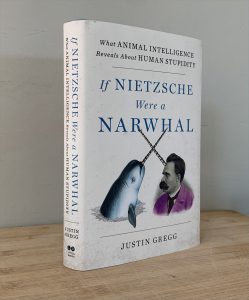 Gregg, Justin. 2022. If Neitasche Were a Narwhal: What Animal Intelligence Reveals About Human Stupidity. Little, Brown. ***
Gregg, Justin. 2022. If Neitasche Were a Narwhal: What Animal Intelligence Reveals About Human Stupidity. Little, Brown. ***
It’s not that humans are “stupid,” it’s that human intelligence is partly counterproductive; humans are too smart for their own good, perhaps even threatening our survival as a species. The book describes humans’ propensity to ask “why” questions, our ability to lie, our awareness of death, our assigning moral judgments to harmless things that in turn can justify genocide, how humans are “conscious” of more things than animals, and especially the idea of “prognostic myopia,” humans’ inability to anticipate future outcomes. Gist: human intelligence has both good and bad consequences, but you don’t get the one without the other. Also: animals are just as “happy” in their own ways as humans are. And most of them will outlast the human species. (summary; part 2)
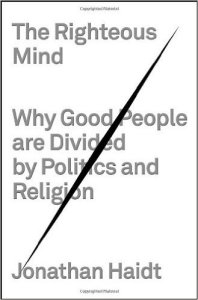 Haidt, Jonathan. 2012. The Righteous Mind. Pantheon. *****
Haidt, Jonathan. 2012. The Righteous Mind. Pantheon. *****
Social psychologist Haidt uses studies into moral sentiments around the world to develop ideas about the ‘foundations’ of morality, especially to expand the standard ‘liberal’ ideal that focuses on egalitarianism, with the idea that morality is all about care vs. harm, fairness vs. cheating, liberty vs. oppression. These are Western, educated values; in contrast, in other parts of the world, other sentiments are just as important: loyalty vs. betrayal, authority vs. subversion, sanctity vs. degradation. In Western countries, those sensitive to all six are conservative; those sensitive mostly to egalitarianism, fairness, and liberty are liberals. He considers these foundations in terms of evolutionary psychology and group selection, and examines various political issues in their light. Intuition and reasoning are both kinds of cognition [cf. Kahneman], and Haidt explores why our minds evolved this way; discusses group selection, why it went out of fashion, how its problems were solved by the earliest evolution of religion. Religion is about belonging to a group with shared beliefs, and it evolved to discourage selfish behavior (the earlier issue with group selection). Morality is about what works, not necessarily what is right, though as a policy, utilitarianism is as good as any [and thus Haidt aligns with Harris and Shermer]. And so: conservative minds react more strongly to threat and fear; liberals are more responsive to variety and new experiences. He describes the differing ‘Grand Narratives‘ of the left and the right: the struggle for equality and happiness, vs. the struggle to return to a golden past. It is much more complex than that some people are good, and others are evil. Liberalism and conservatism are a yin and yang, complementary, and both necessary.
[intro; longer discussion; wrap-up, in which I speculate about some issues Haidt does not discuss]
 Haidt, Jonathan. 2006. The Happiness Hypothesis: Finding Modern Truth in Ancient Wisdom. Basic Books. ****
Haidt, Jonathan. 2006. The Happiness Hypothesis: Finding Modern Truth in Ancient Wisdom. Basic Books. ****
Notes forthcoming.
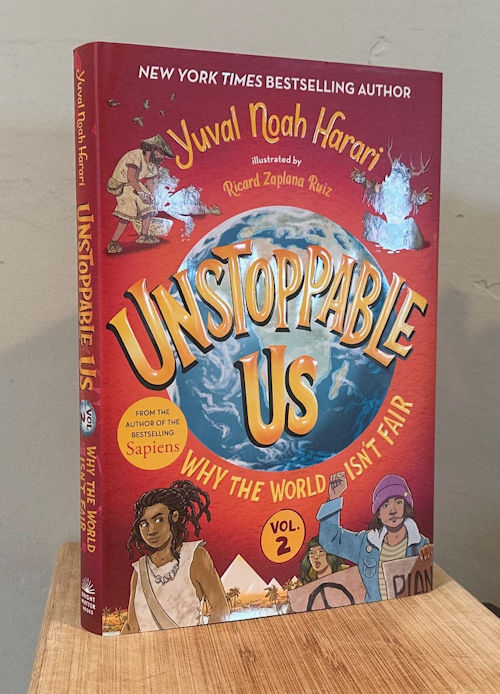 Harari, Yuval Noah. 2024. Unstoppable Us, Volume 2: Why the World Isn’t Fair. Bright Matter Books. *** 1/2
Harari, Yuval Noah. 2024. Unstoppable Us, Volume 2: Why the World Isn’t Fair. Bright Matter Books. *** 1/2
This second volume also has four chapters. First: the agricultural revolution, during which hunter-gatherers settled into villages and took control of other animals: goats, pigs, cows. The transition had problems: crops were subject to pests and droughts. Chiefs and priests explained how sacrifices were needed to appease the spirit gods, and if they didn’t work, you must have done something wrong. Second, how living as a farmer or herder is a lot more work than being a hunter/gatherer. As villages grew, diseases spread easily, people acquired more possessions, neighboring villages fought, and the peaceful became violent in order to survive. Farmers and gatherers learned to think differently. Third, larger communities led to more and more problems, including leaders to make decisions, taxes and assessors to determine them, punishments for non-payers, and slavery. This led to writing, and symbols for numbers, and eventually abstract works like poetry. The need to find documents that held this writing led to bureacracy, then schools, and exams. Fourth, how to get people to follow the rules. You invent stories. Priests tell stories about the gods who created the world and made its rules; follow the rules, heaven; disobey, you get eaten by a crocodile. Truth didn’t matter; believing in the stories and following the rules made society possible. In the world there are things we can sense, things only one person can feel, and things that are shared dreams. These last are harmful when they justify wars. But stories can change– e.g. about women, and gays. Part of growing up is learning which stories to keep, and which to change. Harari is remarkably blunt in describing things most historians take for granted, but which would offend true believers of all kinds. His take on changing stories synchs with how morality has evolved, as discussed by Pinker and Greene. (post)
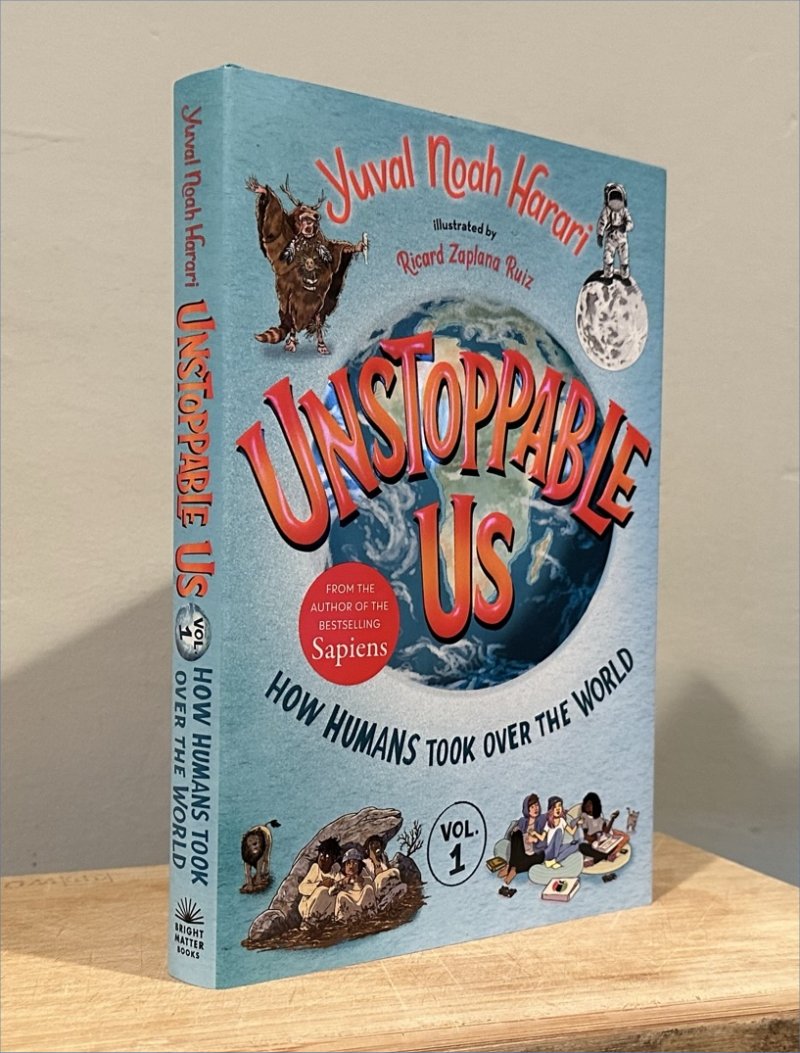 Harari, Yuval Noah. 2022. Unstoppable Us, Volume 1: How Humans Took Over the World. Bright Matter Books. ***
Harari, Yuval Noah. 2022. Unstoppable Us, Volume 1: How Humans Took Over the World. Bright Matter Books. ***
First volume of a series directed at younger readers, heavily illustrated, that parallels the ideas in the author’s SAPIENS. It’s as if he went from a 10,000-foot view of human history, to a 30,000-foot view. The result is in four chapters. First: Humans are animals, and there were once different kinds of humans, drifting apart by evolution and spreading around the globe, with only our own branch, Sapiens, still alive. Second: the superpower of Sapiens is to cooperate in very large numbers. One consequence was the ability to tell imaginary stories about spirits in the sky, and invent ideas about corporations, money, and religion, stories that enable society to work as long as everyone agrees to them. History advances as people realize some of these stories are nonsense and move past them. Third, we’ve deduced much about how our ancestors lived, but it was not that they made everything of stone or lived in caves. Tribes formed, grew, and split into smaller tribes; members were experts about their environment, were subject to accidents and diseases, and believed that trees and animals could talk, and in ghosts and spirits. Fourth, as human expanded across the planet over the past 50,000 years they have killed off all the big animals, especially in Australia and the Americas. Our ancestors didn’t know what they were doing; we do, yet elephants and whales could be next until we take responsibility for the future. (post)
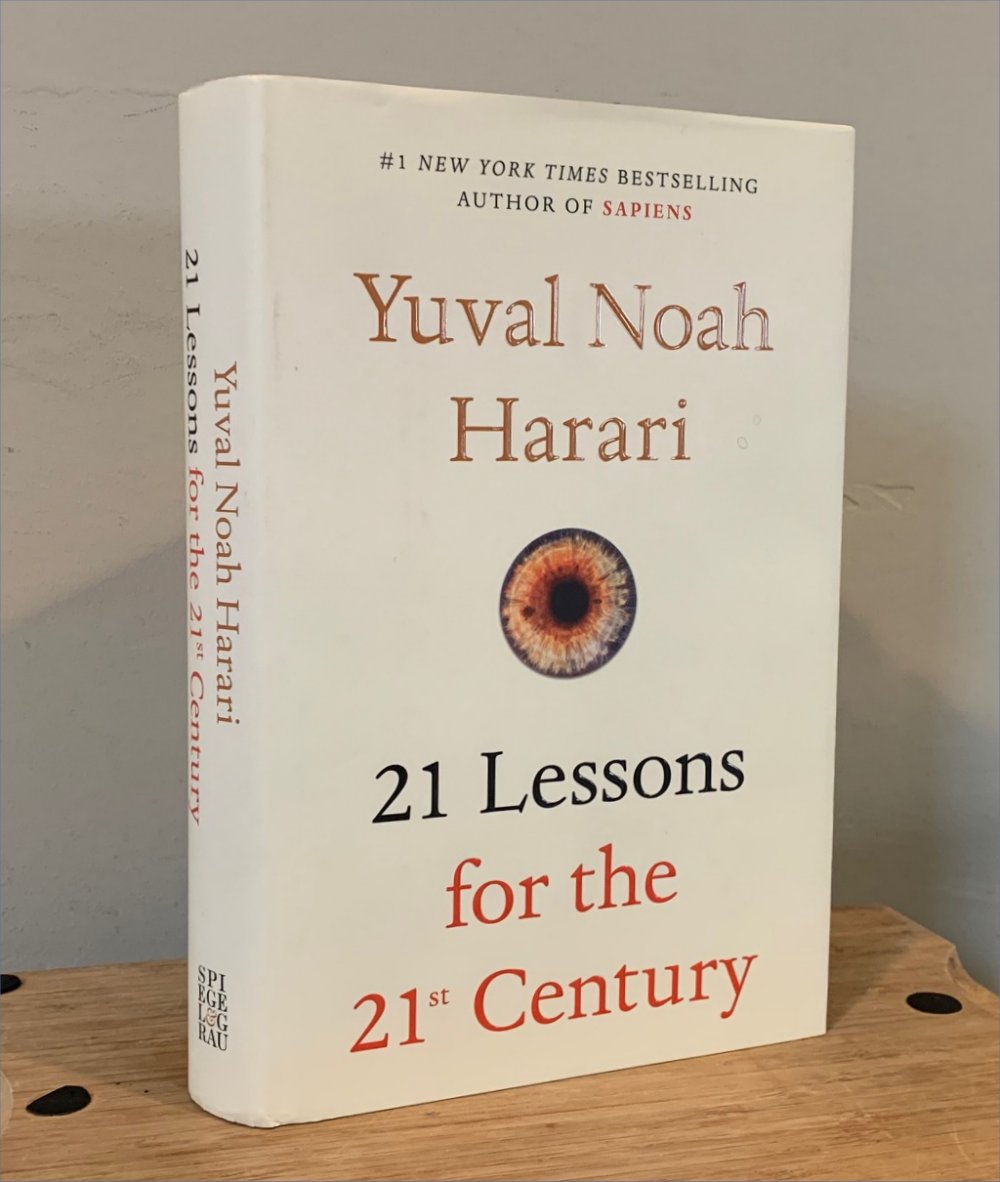 Harari, Yuval Noah. 2018. 21 Lessons for the 21st Century. Spiegel & Grau. *****
Harari, Yuval Noah. 2018. 21 Lessons for the 21st Century. Spiegel & Grau. *****
Harari’s third book covers ideas from his second, HOMO DEUS, about where humanity is headed this century. The five main parts consider the merger of infotech and biotech; how to react by controlling fears and being humble; how to make sense of the world; and what our new story should be; and finally what we can say about the meaning of life. Harari echoes Snyder in how the “liberal story” seemed to have won over the fascist and communist stories, in the 20th century, but how — after 9/11, the economic crisis in 2008, and Trump and Brexit in 2016, this is in doubt. Liberalism is better, and yet it’s bringing about ecological collapse. Topics include post-work societies, big data, inequality, how online communities haven’t worked out, how there is actually just one civilization in the world, and thus the perils of nationalism, which can’t by itself address climate change or avoid nuclear war. Going on: how religion is part of the problem rather than a solution; issues of immigration. How terrorists kill few people but inspire panic among billions. How human stupidity might well launch new wars. How one’s own culture is not the most important in human history (with example of Harari’s Jewish background). And about god and morality, secularism and its consequences, how people know less than what they think, how our sense of justice might be out of date, post-truth fake news, science fiction (this is about the irresponsibility of several SF films), the need for education in a world of change. And then — a long chapter about the “meaning of life,” how religions provide stories that provide the two conditions needed, yet how their stories are not true; how the issue isn’t the meaning of life, but how to stop suffering. And finally: how the author’s personal solution to all this is meditation (a final chapter that echoes that of Sam Harris’ THE END OF FAITH). (post #1; post #2; some quotes)
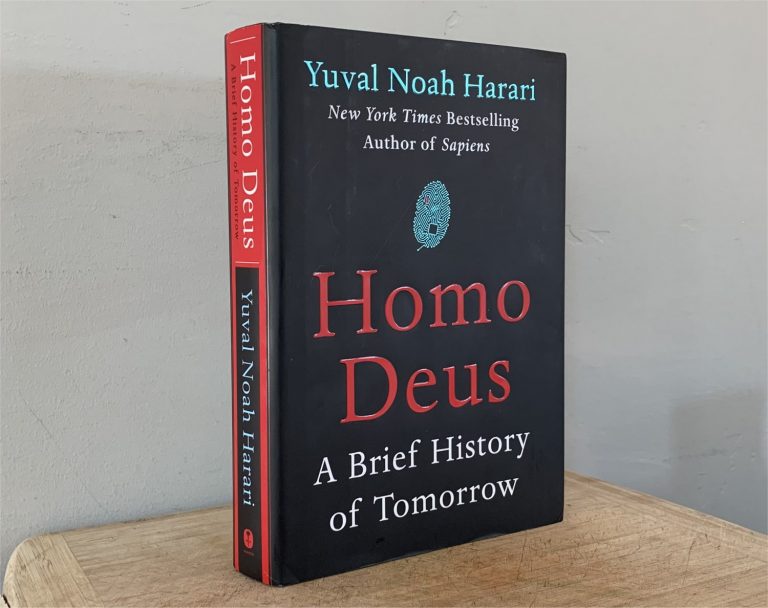 Harari, Yuval Noah. 2017. Homo Deus: A Brief History of Tomorrow. Harper. *****
Harari, Yuval Noah. 2017. Homo Deus: A Brief History of Tomorrow. Harper. *****
In effect a sequel to Sapiens. Harari reflects on three problems of human history, famine, plague, and war, and considers what happens next, proposing immortality, happiness, and divinity, and how the ideal of humanism, which as a religion (again, I find his simplistic use of some terms problematic) is flawed. Modern history is a deal between science and humanism, but it can’t go on forever, because of resources, or a collapsing ecology. While there is no serious alternative to the liberal package of individualism, human rights, democracy, and the free market, some of its presumptions may not be true, e.g. free will. Three ways liberalism might be made obsolete include humans being replaced by robots and thus becoming unemployed, with useless people spending their lives taking pharmaceuticals and playing computer or VR games. What we should be paying attention to: in the short term, immigration and refugees. Over the decades: global warming, and inequality. In the long term: considering to what extent organisms are algorithms and whether intelligence is decoupling from consciousness. As with the first book, this is a fascinating, provocative big picture book taking fresh looks and new perspectives on many familiar ideas. (post)
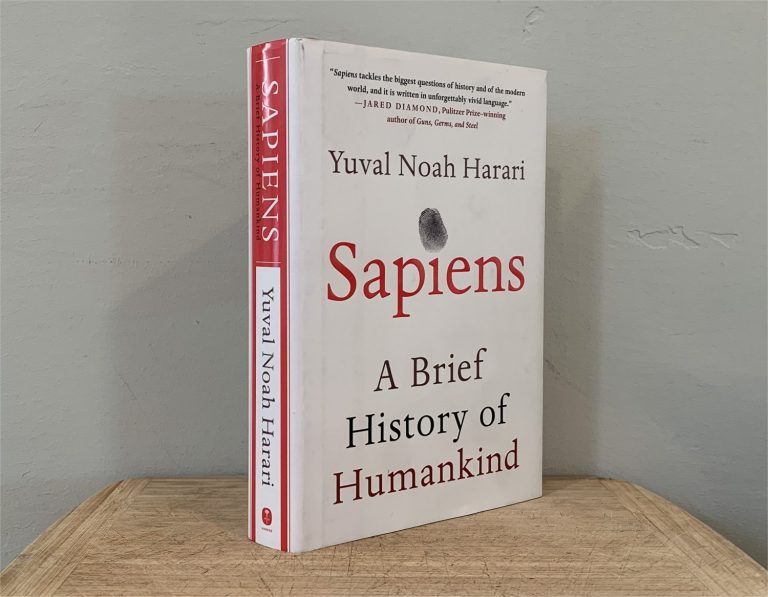 Harari, Yuval Noah. 2015. Sapiens: A Brief History of Humankind. Harper. *****
Harari, Yuval Noah. 2015. Sapiens: A Brief History of Humankind. Harper. *****
This is a history of humanity, with focus on the concepts that have allowed our species to grow and occupy the planet; it’s a history of ideas, not of names and dates. The ideas include the cognitive revolution, 70,000 years ago; the agricultural revolution, 12,000 years ago; and the scientific revolution, 500 years ago. Harari is fond of trios, and his perspectives challenges conventional wisdom; e.g. he considers religion, nationalism, and laws as examples of common myths, or ‘imagined realities’, that have enabled human society to grow, though these ideas have no physical basis in the real world. Another trio: money, empire, and religion. I find his takes problematic at times, e.g. considering humanist philosophies (secular humanism, et. al.) simply other kinds of ‘religions’ that worship humanity and not gods. Most striking is his conclusion is that humanity as we know it is about to end. (post)
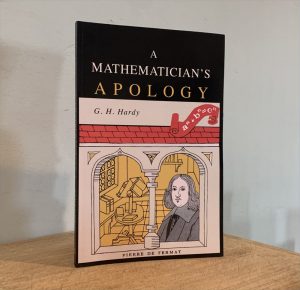 Hardy, G. H.. 2018. A Mathematician’s Apology. Martino. ***
Hardy, G. H.. 2018. A Mathematician’s Apology. Martino. ***
The book shown is a new edition of a famous essay first published in 1940. Hardy “apologizes” for the notion that mathematics is a field of study worthy of a grown man’s career — considering how most of it (except for that which powers science and engineering) — is useless. As an aside he says that people who write popularizations of science for the public are lesser minds than true scientists and mathematicians; this may have been true in his day (Asimov and even Sagan were so dismissed by some), but less so these days with Wilson, Pinker, or Greene. His two big questions: is math worth doing? And why study it in any case? One defense is that math is permanent; a discovery in math remains true forever. Further, ideas in math should be both serious, and beautiful (in contrast to chess, say, which is unimportant). He gives examples of first rate mathematical theorems (concerning prime numbers and the square root of two), contrasts pure and applied math, and wonders whether math exists independently of our minds. And personally, he discovered math early on, and never wanted to do anything else, and feels he’s led a worthy life. (post)
 Harris, Sam. 2013. Lying. Four Elephants Press. **
Harris, Sam. 2013. Lying. Four Elephants Press. **
Short essay (with two appendices) in which Harris maintains that it is always better to tell the truth – even if that means telling it “slant” so you don’t reveal things that might lead to bad consequences, or in some cases to avoid saying either the truth or any kind of lie. He addresses classic cases, like hiding Anne Frank from the Nazis, or what to say when asked “Do I look fat?”, or what to tell children about Santa Claus. His answers are plausible, though not always convincing. My reactions: only the very quick-witted could think of Harris’ evasive tactics to avoid actual lying; and lying (even among animals) evolved for a purpose, as Vedantum argues in his book. (post)
- Harris, Sam. 2010. Moral Landscape. Free Press. –
Notes forthcoming
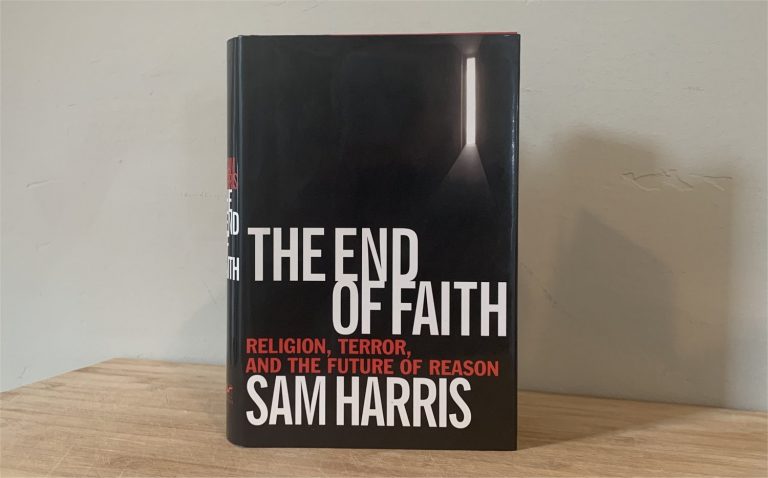 Harris, Sam. 2004. The End of Faith: Religion, Terror, and the Future of Reason. Norton. ****
Harris, Sam. 2004. The End of Faith: Religion, Terror, and the Future of Reason. Norton. ****
Harris was the first of the “four horsemen,” public intellectuals who published controversial books about religion in the years following 9/11. He discusses the incompatibility of rival faiths, and of reason and faith; why beliefs should correspond with the world, and be logically coherent; about the sordid histories of Christianity and of Islam; how US politicians pander to the religious; how issues of morality can be addressed through reason (what the ancients thought is irrelevant); and how [this seems to be the book’s flaw, being tangential] “mysticism” or spirituality is something to rescue from religion. (post)
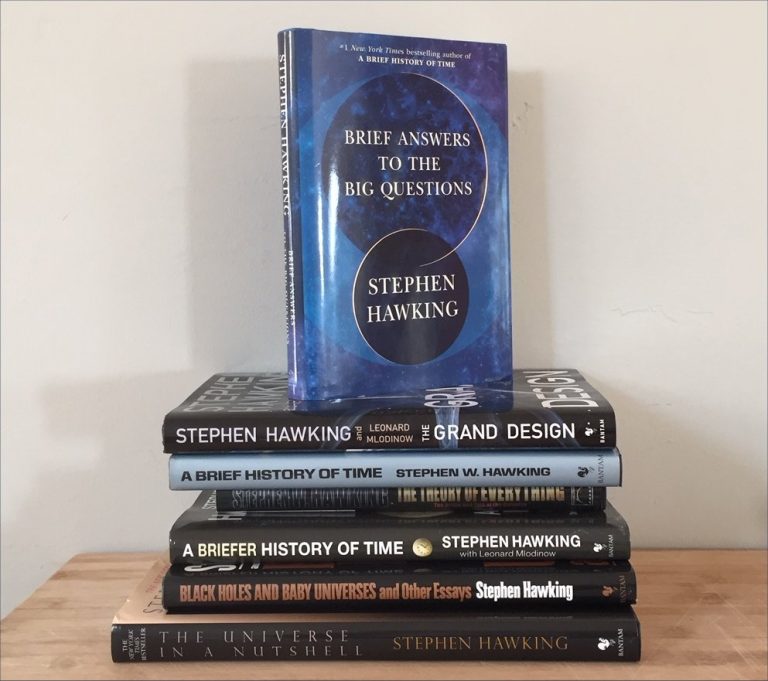 Hawking, Stephen. 2018. Brief Answers to the Big Questions. Bantam. **
Hawking, Stephen. 2018. Brief Answers to the Big Questions. Bantam. **
Ten essays cobbled from Hawking’s speeches, interviews, and essays. Is there a God? Not in any traditional way. How did it all begin, is there other intelligent life, is time travel possible? With answers about Einstein, black holes, unified theories. Should we colonize space? Yes, to avoid catastrophe or a used up planet. Will AI outsmart us? It might, so we have to be intelligent about using it to our advantage. How to shape the future? Rely on science and technology, curiosity, imagination. (post)
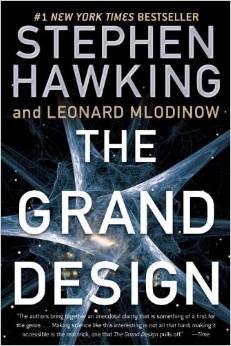 Hawking, Stephen, & Mlodinow, Leonard. 2010. The Grand Design. Bantam. ** 1/2
Hawking, Stephen, & Mlodinow, Leonard. 2010. The Grand Design. Bantam. ** 1/2
Quick summary of the ideas of laws of nature, the basic forces of physics, “classical” themes of physics, superseded by quantum theories, and then the search for “grand unified theories.” Beginning the 1970s ideas included supersymmetry, string theory, and then “M-theory,” involving eleven space-time dimensions and 10^500 different universes. The “strong” anthropic principle is that because we exist, we must exist in a universe that allows for our existence, along with those infinitely many others with different physical laws. And how the “game of life” shows how complex states emerge quickly from simple rules. Because there is a law like gravity, the universe can and will create itself from nothing; the universe came into existence spontaneously. (post)
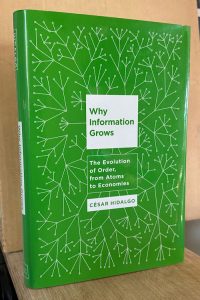 Hidalgo, Cesar. 2015. Why Information Grows: The Evolution of Order, from Atoms to Economies. Basic Books. ***
Hidalgo, Cesar. 2015. Why Information Grows: The Evolution of Order, from Atoms to Economies. Basic Books. ***
This book ties thematically with both Harari’s later NEXUS, in its concept of what information is, and Greene’s UNTIL THE END OF TIME, with the idea that information can grow just as order can despite the second law of thermodynamics, because both are temporary in the long run. The universe is made of energy, matter, and information, and the last grows by virtue of three facets of the universe: out-of-equilibrium systems (he recalls ideas from Ilya Prigogine; the obvious example is the Earth and Sun, which will remain out of equilibrium for billions of years, allowing life to evolve in Earth), the accumulation of information in solids (crystals; DNA), and the ability of matter to compute (how we can perform actions without “knowing” how to do them, an ability he calls “knowhow.”) Technically, information is measured by the number of bits needed to communicate an arrangement, so that, ironically, random sets of bits contain more information than well-ordered one. That’s a quarter of the book; the remainder explores ideas about how the growth of information drives economies, about social interactions and social networks, how large networks are a reflection of a society’s level of trust. (post)
 Hitchens, Christopher. 2007. god is not Great. Twelve. ****
Hitchens, Christopher. 2007. god is not Great. Twelve. ****
Notes forthcoming
 Hutson, Matthew. 2012. The 7 Laws of Magical Thinking: How Irrational Beliefs Keep Us Happy, Healthy, and Sane. Hudson Street Press. ****
Hutson, Matthew. 2012. The 7 Laws of Magical Thinking: How Irrational Beliefs Keep Us Happy, Healthy, and Sane. Hudson Street Press. ****
Yet another book about irrational beliefs and cognitive illusions! The difference with the others is that Hutson — a journalist who’s only ever written this one book — takes a counter-intuitive, playful stance. Give in to your irrational beliefs, Hutson says, at least superficially, at least in some corner of your mind. You’ll be happier! And you can retain your rational understanding that these beliefs aren’t actually true, if pretending they’re true calms your nerves. The seven “laws”: Objects carry essences; Symbols have power; Actions have distant consequences; The mind knows no bounds; The soul lives on; The world is alive; Everything happens for a reason. And finally how The world is sacred. Of course, all of these are untrue, as physicists like Carroll and Wilzcek patiently explain. But if believing in them makes you happy… and they result in no real-world consequences… then why not live in a world of fantasy? (post)
 Junger, Sebastian. 2021. Freedom. Simon & Schuster. *** 1/2
Junger, Sebastian. 2021. Freedom. Simon & Schuster. *** 1/2
Part memoir, part philosophical reflections, based on several sessions of walking, with a small group of friends, the railroad lines in Pennsylvania, living like hobos, avoiding security and police. Three themes. Freedom is being left alone and doing whatever you want, which is hard to do in a complex society where we are necessarily dependent on one another. (We don’t build our own houses, let alone refine our own gasoline.) Second, recalling the violence between the European immigrants who settled this area and the native Indians. The more free you were, the farther out from settlements, the greater the danger. Author describes how in disasters people are usually helpful toward each other, even sacrifice themselves for others. And how the largest of a group, whether individual male or army in a war, does not inevitably win. Three, how society has been able to think things through [to go beyond tribal morality in my terms] to establish higher principles. Democracy is an attempt to balance power and freedom. Beware leaders who aren’t willing to make sacrifices themselves, e.g. fight in battles alongside their men. With a discussion of social inequality and the “Gini coefficient”. Societies with high inequality dominate world history; how do individuals within them protect their freedoms? By thinking social values through, with examples of the Easter Rising revolution in Ireland, and a steel workers strike in Pittsburgh, winning by principle than by fighting. Finally, the author tires of wandering, and settles down, giving up a kind of freedom for a place to be at home. (post)
 Junger, Sebastian. 2016. Tribe: On Homecoming and Belonging. Grand Central/Twelve. ***
Junger, Sebastian. 2016. Tribe: On Homecoming and Belonging. Grand Central/Twelve. ***
The author of The Perfect Storm defends tribes, “small groups defined by clear purpose and understanding,” as necessary to our psychological survival. As an example of the appeal of tribal societies, he describes how European settlers in America would often leave their own to join the Indians — and virtually never vice versa. He describes his contact with war, and how, contrary to many catastrophe novels and movies, people tend to cooperate, even inspiring long-term social reforms. Then how PTSD reveals how often soldiers miss war after it’s over. A striking passage is about the dismay soldiers feel coming home to a fractured society. Both liberals and conservatives represent ancient evolutionary concerns. Junger describes a problem in vivid terms, though he doesn’t have a solution. (It’s ultimately about the tension of ancient human nature adapting to a multicultural, global society, as writers like Wilson and Pinker have explored.) (post)
Kahane, Howard, & Cavender, Nancy, & Kahane, Howard. 2017. Logic and Contemporary Rhetoric: The Use of Reason in Everyday Life. Belmont CA: Wadsworth. ****
This is a college textbook about the types of fallacious arguments one sees in politics, advertising, news, and textbooks — ad hominem, straw man, false dilemma, begging the question, biased statistics; the list goes on. With many examples from current news and advertising. The point is both to understand where others’ arguments fail, and to try to avoid such invalid reasoning yourself. I read the 3rd edition, by Kahane alone, back around 1975. This was the best text I ever read in college. There have been many editions since; apparently it’s a standard. Relevant now more than ever. Note these rhetorical fallacies pre-exist more modern understanding of the psychological biases that lead people to use them, self-righteously; for those see Gilovich, McRaney, and Kahneman. (The image shows the 12th edition, co-written by Nancy Cavender.) (post)
 Kahneman, Daniel. 2011. Thinking, Fast and Slow. Farrar, Straus and Giroux. *****
Kahneman, Daniel. 2011. Thinking, Fast and Slow. Farrar, Straus and Giroux. *****
Perhaps the most influential book of the past couple decades on the subject of human mental biases, how the ways in which we think entail errors of perception, and employ heuristics that are often but not always true. It’s a summary of the author’s own work (along with Amos Tversky), for which he won a Nobel Prize. The essential model is that our brain operates at two levels — System 1 is automatic, quick, and involuntary; System 2 requires efforful mental attention. Most of what we think and do originates in the first; when things get difficult the second takes over, and normally has the last word. A long, detailed book that looks at how these systems underlie our biases and illusions, how we make choices, and how we think about life. (post)
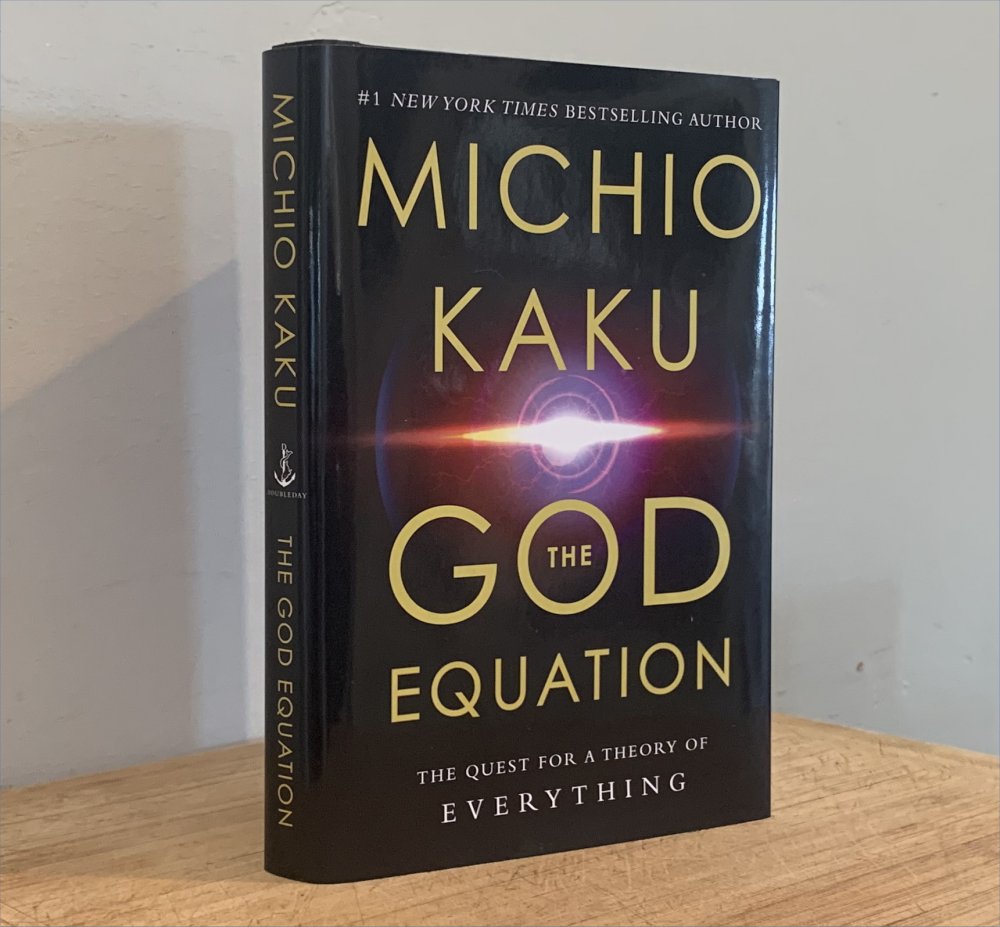 Kaku, Michio. 2021. The God Equation: The Quest for a Theory of Everything. Doubleday. ***
Kaku, Michio. 2021. The God Equation: The Quest for a Theory of Everything. Doubleday. ***
A succinct, crisp history of physics, from the Greeks to the present, and ending with, though not dwelling too much on, string theory, the author’s field of interest. The disingenuous title is likely the publisher’s. Kaku’s case for string theory is compelling, despite the admitted lack of evidence, in that the previously intractable problem of uniting gravity and quantum mechanics is solved via supersymmetry and multiple dimensions: as if the two theories only make sense when one is lifted (mathematically) into a different dimension. Kaku finds all this evidence of a cosmic designer, and that the ‘theory of everything’ will be the only possible universe because it’s the only theory that is mathematically consistent. (summary and comments)
 Kakutani, Michiko. 2018. The Death of Truth: Notes on Falsehood in the Age of Trump. Tim Duggan Books. ***
Kakutani, Michiko. 2018. The Death of Truth: Notes on Falsehood in the Age of Trump. Tim Duggan Books. ***
Long-time NYT book reviewer (now retired) explores how we got to the age of Trump (with only glancing suggestions about how to recover). It’s partly that American anti-intellectualism, the right-wing media propaganda machine, and the internet in general — but also the cultural relativism and post-modernist attitudes from the left in the 1960s that have now been co-opted by the right. (With chapter epigraphs by PKD, Gibson, and Heinlein, among others.) (post)
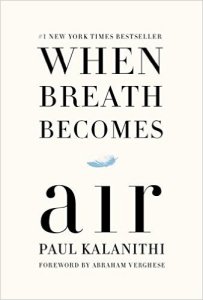 Kalanithi, Paul. 2016. When Breath Becomes Air. Random House. *** 1/2
Kalanithi, Paul. 2016. When Breath Becomes Air. Random House. *** 1/2
Moving but almost unbearably sad memoir by a young Stanford neurosurgeon who is diagnosed with stage IV lung cancer at the age of 36. He recalls studying at Stanford and getting an MA in English lit on the site, preoccupied with what makes human life meaningful. Then the book follows the course of his treatment, as he becomes the patient, not the doctor. Despite his fate, his wife and he decide to have a child, and he revisits his family’s rituals. There is a running theme of the friction between the humanities and science, the limitations of the latter, and the central values of Christianity, despite his rejection of any kind of revelation. Human knowledge grows from the relationships among people, and is never complete. (post)
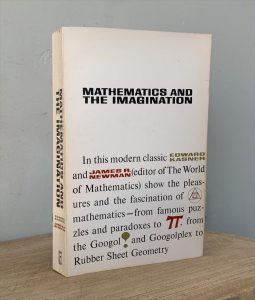 Kasner, Edward, & Newman, James. 1967. Mathematics and the Imagination. Fireside/Simon & Schuster. *****
Kasner, Edward, & Newman, James. 1967. Mathematics and the Imagination. Fireside/Simon & Schuster. *****
An introduction to mathematical themes for the lay reader, including infinities, topologies, non-Euclidean geometries, chance and probablities, transcendental numbers. Also fun topics like puzzles and paradoxes, which can be understood with mathematical insight. Concludes by pondering the philosophical question of whether math is discovered, or invented, by humans; they come down on the latter, with non-Euclidean geometries as an example. But the book was published 80 years ago, and things may have changed. (Originally published 1940.) (post)
 Keen, Andrew. 2018. How to Fix the Future. Atlantic Monthly. ** 1/2
Keen, Andrew. 2018. How to Fix the Future. Atlantic Monthly. ** 1/2
A breezy book in the Thomas L. Friedman mode as the author talks to various experts around the world who grapple with the problems of high-tech’s effects on society. Contra Silicon Valley’s free market libertarianism, Keen describes, with examples (Estonia, Singapore, Oakland), five tools to make things better: regulation, competitive innovation, social responsibility, worker and consumer choice, and education. (post)
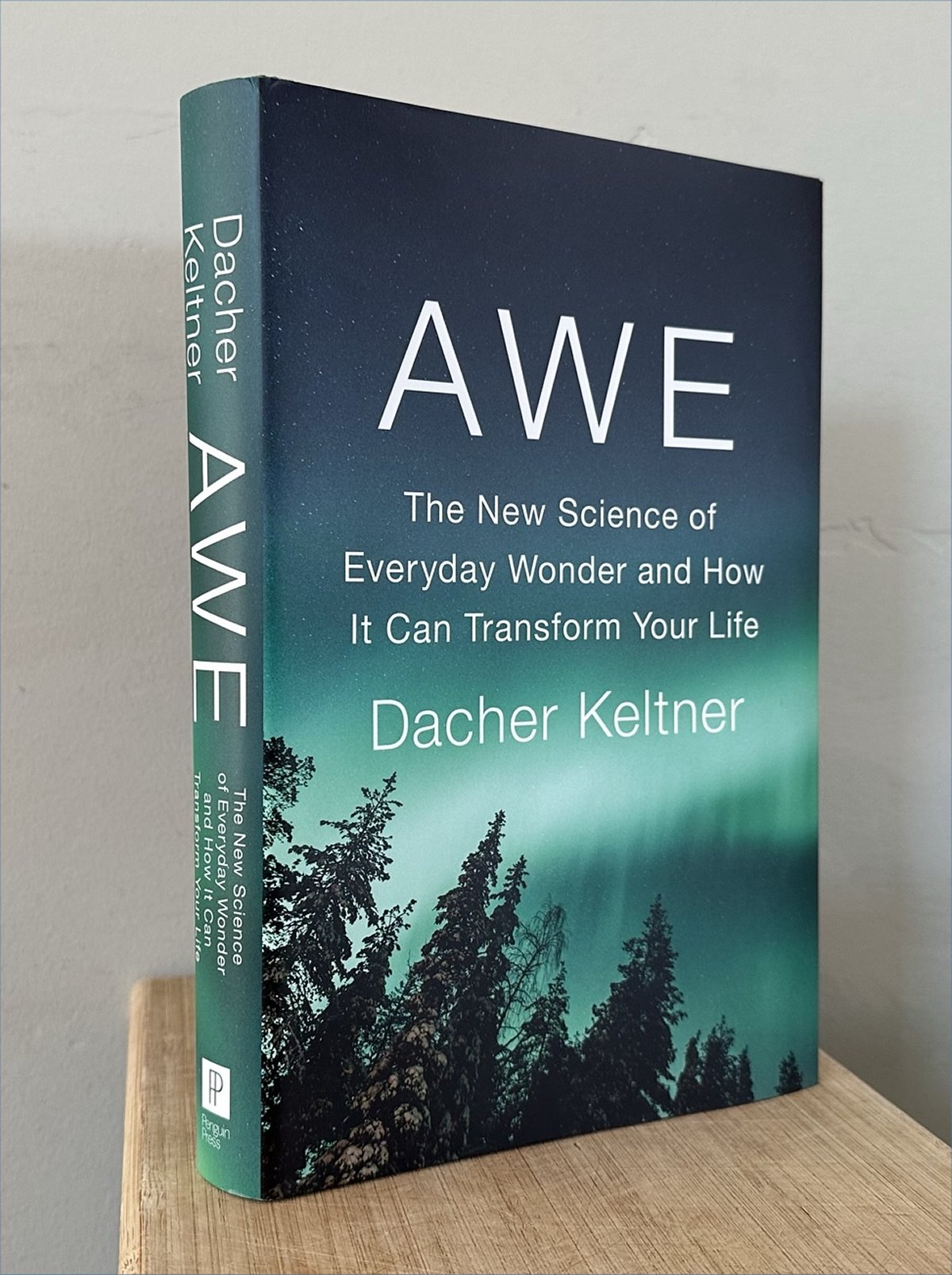 Keltner, Dacher. 2023. Awe: The New Science of Everyday Wonder and How It Can Transform Your Life. Penguin Press. **
Keltner, Dacher. 2023. Awe: The New Science of Everyday Wonder and How It Can Transform Your Life. Penguin Press. **
UC psychology prof and adviser to Pixar says the way to live a good life is to seek out sources of awe, which he sees an emotion (and not science fiction’s “sense of wonder,” of which the author seems unaware). The author’s research into emotions (with Jonathan Haidt for a while) identified eight themes from personal stories in which they experienced awe: moral beauty; collective effervescence; nature; music; visual design; the spiritual and religious; life and death; and epiphanies, sudden insights into the meaning of life. It’s all about perceiving that everything is part of a system; awe is about perceiving changes in those systems. These are decent points — we should all try looking at the big picture beyond our personal circumstances — but the book is prolonged by endless anecdotes and case studies. Also, Keltner speaks of “purpose” when he really should be speaking about “function” and what benefits such an emotion would provide over those who didn’t feel it. (post)
 Kinsley, Michael. 2016. Old Age: A Beginner’s Guide. Crown/Tim Duggan Books. ** 1/2
Kinsley, Michael. 2016. Old Age: A Beginner’s Guide. Crown/Tim Duggan Books. ** 1/2
The journalist and Slate co-founder, sufferer of Parkinson’s Disease for 23 years, ponders strategies for dealing with news of a serious illness, the potential of deep brain stimulation (DBS), life extension technology, and stem cells; reflects on Alzheimer’s, reputations, and contrasts baby boomers with the “Greatest Generation” who won World War II, and how American exceptionalism — “the belief that the rules of nature and humanity don’t apply to us” — keep getting us into wars. A collection of chapters first published as magazine pieces, it’s notable for Kinsley’s self-deprecating wit. (post)
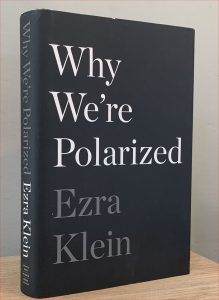 Klein, Ezra. 2020. Why We’re Polarized. S&S/Avid Reader Press. *** 1/2
Klein, Ezra. 2020. Why We’re Polarized. S&S/Avid Reader Press. *** 1/2
An examination of the political divide in the US. Broad conclusions: America’s legacy of slavery and racism; the pace of change with non-white immigrants; obsolete aspects of our political systems; and of course modern social media. (post)
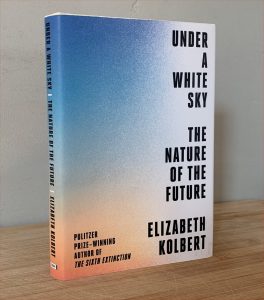 Kolbert, Elizabeth. 2021. Under a White Sky: The Nature of the Future. Crown. ***
Kolbert, Elizabeth. 2021. Under a White Sky: The Nature of the Future. Crown. ***
A sequel of sorts to the author’s The Sixth Extinction, this is also about ecologies and species that have been affected by human activity, and the messes that often resulted. Chapters consist of the author visiting remote places and interviewing key people. The prime example is what happened when the Chicago River was reversed in 1887, to send waste water west to the Mississippi River rather than into Lake Michigan; other examples include the disappearing peninsulas of Louisiana, volcanoes, Greenland ice. The conclusion is that humans shouldn’t stop meddling in nature, but to be smarter about it. And not to be afraid of GMOs: “The strongest argument for gene editing cane toads, house mice, and ship rats is also the simplest: what’s the alternative? Rejecting such technologies as unnatural isn’t going to bring nature back. The choice is not between what was and what is, but between what is and what will be, which, often enough, is nothing.” (post)
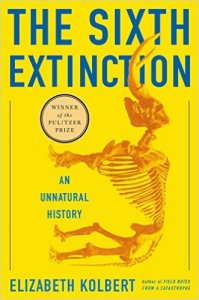 Kolbert, Elizabeth. 2014. The Sixth Extinction: An Unnatural History. Henry Holt. ****
Kolbert, Elizabeth. 2014. The Sixth Extinction: An Unnatural History. Henry Holt. ****
Evidence that the expansion of the human race across the planet, over the past couple hundred thousand years, but especially over the past century (with the advent of air travel), is causing a world-wide mass extinction comparable to the five previous such extinctions evident in the fossil record. Each chapter focuses on a particular species, with vivid narratives about the American mastodon (and the very idea of extinction), historical debates about catastrophes vs uniform change over Earth’s history, and climate change and the deaths of coral reefs. As humanity spread across the globe following the last ice age, 10,000 years ago, it killed off the large mammals in Australia and the Americas. Now, with air travel, we’re bringing previously isolated species into contact daily, with sometimes disastrous results. We’re now living not in the Holocene, as traditional geological time-scales name our time, but in the Anthropocene — the era of humanity’s impact on the geological history of Earth. (post)
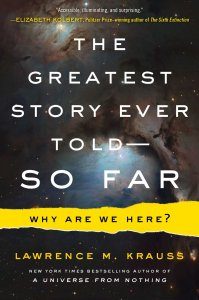 Krauss, Lawrence M.. 2017. The Greatest Story Ever Told–So Far: Why Are We Here?. Atria. ***
Krauss, Lawrence M.. 2017. The Greatest Story Ever Told–So Far: Why Are We Here?. Atria. ***
This greatest story is a history of physics of the past few decades, accompanied by anecdotes about Richard Feynman, Sheldon Glashow, Steven Weinberg and others; with the theme of the discovery that the universe is not what meets the eye, and that the reality is greater than the myths and ignorance of past millennia. (post)
 Lee, Adam. 2012. Daylight Atheism. CreateSpace. ***
Lee, Adam. 2012. Daylight Atheism. CreateSpace. ***
Similarly to Grayling’s GOD ARGUMENT, Lee’s first half explains why religious faith is a nonstarter, while the second half explores the benefits of free thought and honest engagement with the world. Topics range from how religion is like fossil fuel, the atrocities religion has wrought upon the world, and how Bible stories describe “a deity who’s petty, insecure, malicious, short-tempered, violent and cruel.” Later, his concept of morality independent of religion as a sort of “universal utilitarianism.” Lee is been a writer on several blogs over the years and ironically many of his essays are better than this relatively short book. Alas, his essay repository at Patheos is gone, but he has a minimalist homepage with his blog archives. He currently writes for OnlySky. (post)
- Lepore, Jill. 2019. This America: The Case for the Nation. Liveright. –
Notes forthcoming
 Levitan, Dave. 2017. Not a Scientist: How Politicians Mistake, Misrepresent, and Utterly Mangle Science. Norton. ***
Levitan, Dave. 2017. Not a Scientist: How Politicians Mistake, Misrepresent, and Utterly Mangle Science. Norton. ***
The author explores a dozen or so kinds of mistakes that are typically behind any politician’s use of the phrase “I’m not a scientist, but…” and illustrates each with several detailed examples. These mistakes include oversimplifying, cherry-picking, demonizing, citing disreputable websites, credit-snatching, flat out fabrication, and so on. While the author says he doesn’t try to attribute motives to most of these, the vast majority of examples are from Republicans, and — my gloss — reveal obvious motivations: to maintain the status quo, protect the interests of big business, promote xenophobic or religious agendas. (post)
 Levitin, Daniel J.. 2016. A Field Guide to Lies: Critical Thinking in the Information Age. Dutton. ***
Levitin, Daniel J.. 2016. A Field Guide to Lies: Critical Thinking in the Information Age. Dutton. ***
Complementing Ariely’s book, this summarizes how to think about numerical and journalistic claims with the aim of evaluating the world and know what is likely to be so. With discussions of statistics, surveys, misleading graphs; expertise and sources of information and counter-knowledge; how science works, logical fallacies, and Bayesian thinking. (post)
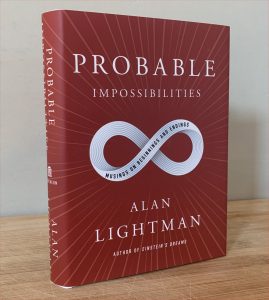 Lightman, Alan. 2021. Probable Impossibilities: Musings on Beginnings and Endings. Pantheon. ***
Lightman, Alan. 2021. Probable Impossibilities: Musings on Beginnings and Endings. Pantheon. ***
Collection of 17 essays. The title essay is about tracing your ancestors back through time, how every atom in your body was made in stars, and how we know this. The most striking essay, “Smile,” describes a man and woman passing each other along a lakeside, in terms of how many atoms and bits of light are exchanged in just a few moments. Other topics: how after death every atom of his body will eventually become parts of other people; how humans like disorder and asymmetry; how people are attracted to the idea of miracles despite no evidence for them, or for any other kind of reality; how the fraction of living material in the universe is fantastically small; and about the infinity of space and time and the idea of a vast number of universes, each spawning new ones. (post)
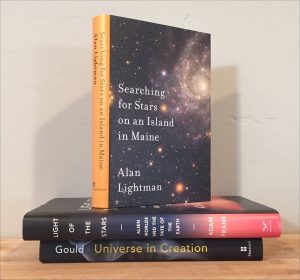 Lightman, Alan. 2018. Searching for Stars on an Island in Maine. Pantheon. * 1/2
Lightman, Alan. 2018. Searching for Stars on an Island in Maine. Pantheon. * 1/2
Essays that ponder science, religion, and the yearning for meaning, with some lovely naturalist writing, but mushy on the author’s desire for “meaning” outside the scientific evidence of the real world. It’s an example of the bias in human nature that searches for a story for the world that doesn’t really exist. (post)
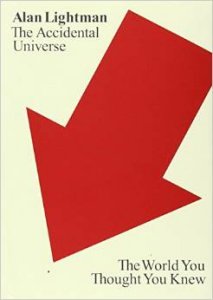 Lightman, Alan. 2014. The Accidental Universe. Pantheon. ***
Lightman, Alan. 2014. The Accidental Universe. Pantheon. ***
Seven essays about how the universe is not obviously what it appears to be, or is at odds with what humans might prefer. Topics include the history of science and a potential “theory of everything” (echoing Deutsch, perhaps); the human longing for permanence; science and faith (loosely construed); symmetries; how our conception of the size of the universe has grown; how scientists have become committed to the lawfulness of the universe; and how we know the Earth rotates even though we can’t feel it. (post)
 Lilla, Mark. 2017. The Once and Future Liberal: After Identity Politics. Harper. ** 1/2
Lilla, Mark. 2017. The Once and Future Liberal: After Identity Politics. Harper. ** 1/2
Lilla’s theme, being echoed currently by Francis Fukuyama and David Brooks and others, is that the liberal project is being undermined by identity politics, and how liberals need a new orientation into shared values that can attract voters. He advises focusing on winning elections, citizenship over personal identity, and civic education. (post)
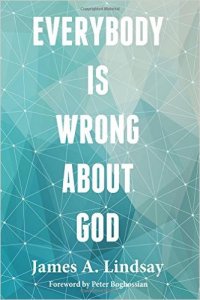 Lindsay, James A.. 2015. Everybody Is Wrong About God. Pitchstone. * 1/2
Lindsay, James A.. 2015. Everybody Is Wrong About God. Pitchstone. * 1/2
The premise here is that theism has been so discredited — “philosophically, sociologically, and scientifically” — that it is mythology, and atheism is senseless, and we should change the conversation. He understands that most people mean “God” to mean a set of moral values (more than a particular supernatural being), how these attributes are like settings on a mixer board, blended differently in each person [anticipating, or echoing, Haidt], and how a “transcendence” knob turned all the way up equates to faith, which cannot be questioned. The balance of the book is about how to move toward a post-theistic world, citing familiar ideas: education, street epistemology, humanism. Most of this is familiar, and the book is repetitious and long-winded. Written for the choir, as many of these small-press volumes are. (post)
 Loftus, John W.. 2013. The Outsider Test for Faith: How to Know Which Religion Is True. Prometheus. * 1/2
Loftus, John W.. 2013. The Outsider Test for Faith: How to Know Which Religion Is True. Prometheus. * 1/2
A former evangelical Christian who rejected the faith in the 1990s proposes a simple way to think about one’s faith: “consider one’s own faith with the same level of reasonable skepticism believers already use when examining the other religious faiths they reject.” Perfectly reasonable and obvious, yet the author addresses various critiques of the thesis more than he quite explains how one should systemically apply the test, or give examples. Unevenly written, this is another book preaching to the atheist choir, perhaps riding the coattails of the much better writers (Dawkins, Dennett, Hitchens, Harris) of the previous decade. (post)
 Lukianoff, Greg, & Haidt, Jonathan. 2018. The Coddling of the American Mind: How Good Intentions and Bad Ideas are Setting Up a Generation for Failure. Penguin. ****
Lukianoff, Greg, & Haidt, Jonathan. 2018. The Coddling of the American Mind: How Good Intentions and Bad Ideas are Setting Up a Generation for Failure. Penguin. ****
The authors think Americans, students in particular, are over-protected, via commitment to three Great Untruths: What doesn’t kill you makes you weaker; Always trust your feelings; Life is a battle between good people and evil people. The second and third are familiar conservative attitudes, while the first is problem both on the left and the right. That first untruth involves the rise of “safetyism” that led to peanut allergies. The second contradicts much ancient wisdom, and is corrected by critical thinking. And the third is a core aspect of ancient tribal mentality, and is precisely the kind of thing university education should overcome. The book then examines how these ideas have played out (campus protests, etc.), how we got here: polarization; anxiety and depression triggered by social meda and the iPhone; and paranoid parenting, resulting in the decline of play and a beaurcracy of safetysim. Recommendation for creating wider kids include preparing the child for the road (not vice versa), practice intellectual humility, along with ideas to improve universities, and societies. (Have things improved? Not with issues of the demonization of transgenders, and the entire MAGA movement.) (post)
- Lynch, Aaron. 1996. Thought Contagion. Basic. –
Notes forthcoming
- MacAskill, William. 2022. What We Owe the Future. Basic Books. –
Notes forthcoming
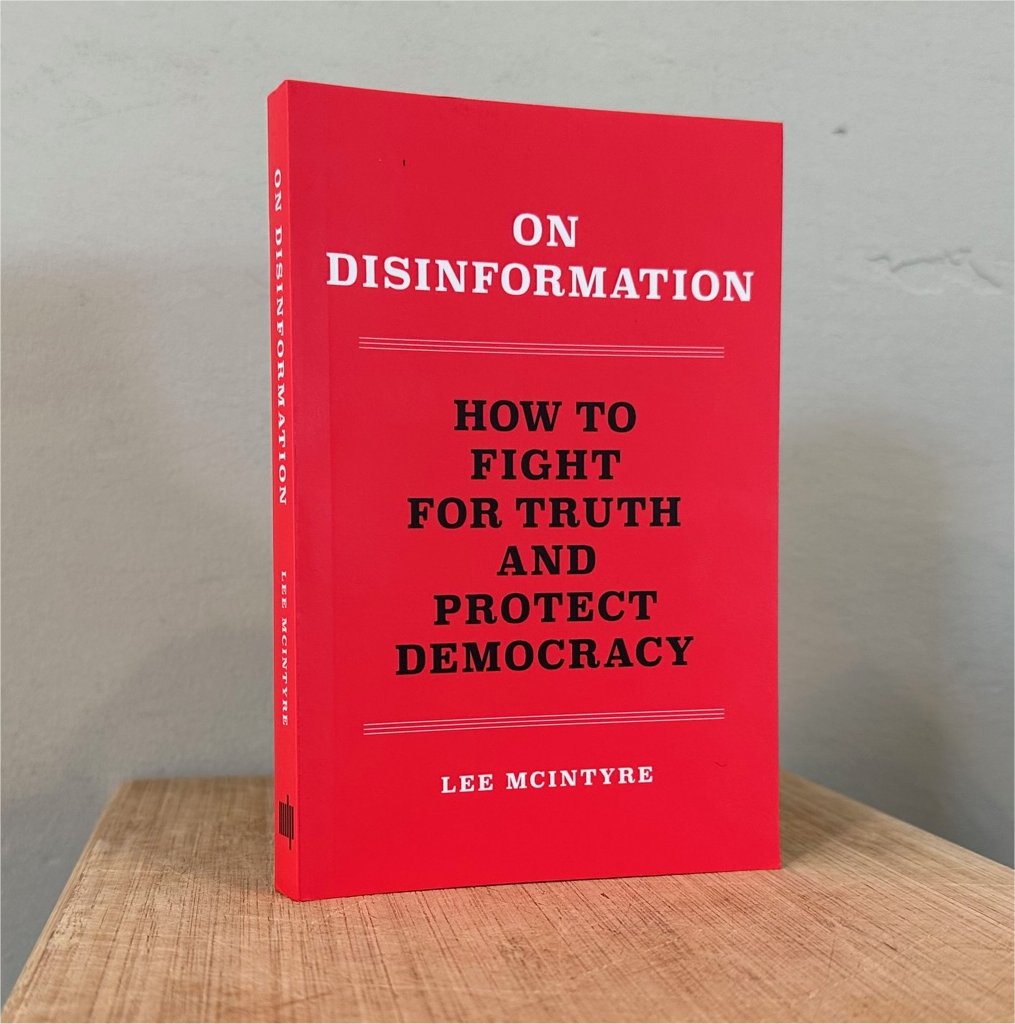 McIntyre, Lee. 2023. On Disinformation: How to Fight for Truth and Protect Democracy. MIT. ***
McIntyre, Lee. 2023. On Disinformation: How to Fight for Truth and Protect Democracy. MIT. ***
When people talk about misinformation they usually mean disinformation — lies that are spread deliberately to create armies of deniers, or for the liars’ own ends (money or political power). (That is, I comment, some promulgators of conspiracy theories may be sincere, but many are not.) McIntyre focuses on examples of tobacco, evolution, global warming, and vaccines. The strategy of disinformation creators: cherry-pick evidence; believe in conspiracy theories; engage in illogical reasoning; rely on fake experts and denigrate real ones; and have impossible expectations for what the other side must achieve. Then come the amplifiers: social media, and Fox News. And believers come from cognitive biases that allow people to believe things unsupported by evidence, more concerned about values, community, and feelings. How to fight back? Not so much about facts or education, but about exposing and naming the truth killers, revealing their tactics and financial ties. Author reflects that there are always those who fight against truth; the battle against them must be fought in every age. (post)
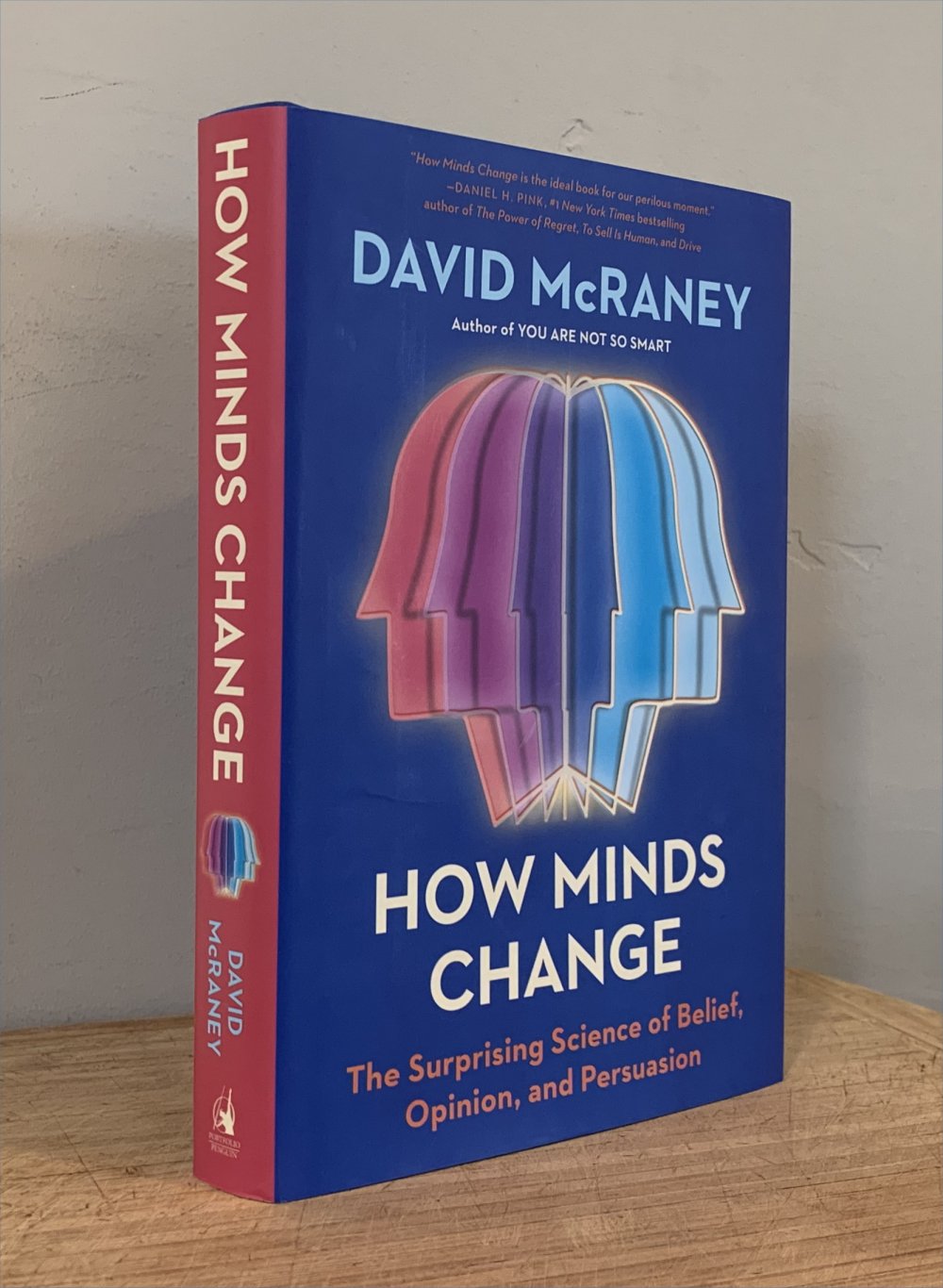 McRaney, David. 2022. How Minds Change: The Surprising Science of Belief, Opinion, and Persuasion. Portfolio. ****
McRaney, David. 2022. How Minds Change: The Surprising Science of Belief, Opinion, and Persuasion. Portfolio. ****
Contrary to the by-now-conventional wisdom that people don’t change their minds even when presented with evidence that challenges their beliefs (they double down, their identity or community membership threatened), McRaney explores the situations where and reasons why people *do* change their minds. The main lesson is that changing minds isn’t about winning arguments; it’s about discussing with another person why and how they came to believe what they do. To this end the author investigates various “street epistemologies” like Peter Boghossian’s, in which the aim is to make a person reflect, and not to challenge them with facts. Also: some people just need to get out into the world (e.g. those who escaped the Westboro Baptist Church); how arguing and debating are good things (justifying confirmation bias! and cuing group selection); and how the history of social change shows how the ability to change minds is a strength, otherwise society would not have evolved. Bonus: the explanation for “the dress.” Final thought: consider *why* anyone should want to change someone’s mind (post)
McRaney, David. 2013. You Are Now Less Dumb. Gotham Books. ****
This book continues the themes of the author’s first book, but in fewer chapters with more depth. It’s bookended by long chapters on two deep ideas. The first is “narrative bias,” how people make sense of their life through narrative. Narratives keep whole societies alive; people live and die for such stories (i.e. religion, nationalism). The second idea is the “self-enhancement bias,” how everyone overestimates their own abilities, and how this is functional; it makes people feel good about themselves and so more likely to reproduce. (notes; more notes)
McRaney, David. 2011. You Are Not So Smart. Gotham Books. ****
How your mind is biased to trick yourself, over 48 chapters in 300 pages. Each chapter contrasts a misconception (e.g. “You are a rational, logical being who sees the world as it really is”) with its counterpart truth (e.g. “You are as deluded as the rest of us, but that’s OK, it keeps you sane”). The book covers cognitive biases, heuristics, and logical fallacies, via psychological case studies, the author’s interpretive elaborations, and occasional anecdotes from his own life. Highly entertaining and deeply insightful, and his second book is even better. (post)
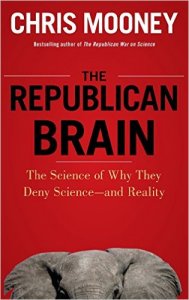 Mooney, Chris. 2012. The Republican Brain: The Science of Why They Deny Science — and Reality. Wiley. ***
Mooney, Chris. 2012. The Republican Brain: The Science of Why They Deny Science — and Reality. Wiley. ***
Why do people react to political and scientific issues differently? The book looks first at how variations in human personality traits lead to different takes about the world — these variations being essential parts of humanity’s evolutionary response to the world — and then, secondarily, about how in our present society, those traits being more conservative have become less accurate takes on reality; how conservative ideas about science and reality are more often wrong than those of liberals. He discusses five standard personality traits (analogous to Haidt’s moral intuitions) and how conservatives and liberals reflect different combinations of these; how conservatives view liberals; motivated reasoning; the doubling-down of “smart idiots”; how both conservative and liberal attitudes are essential to the human condition, but how each side can learn from the other (pay attention to facts; abandon the idea of ‘balance’ in the media; defend reality with stories that integrate facts and move people). (summary with my own comments about how science fiction is about change to the human condition while conservatism, almost by definition, resists change as a way of managing uncertainty and fear.)
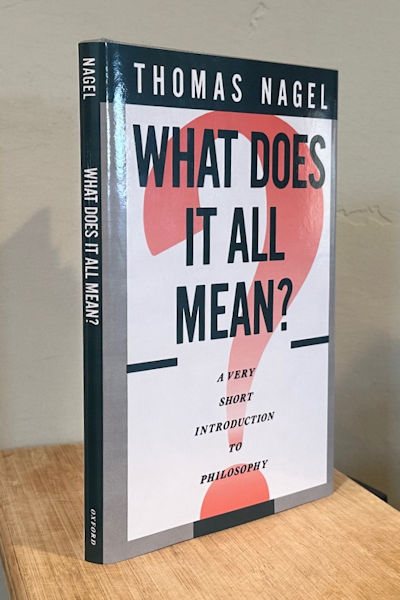 Nagel, Thomas. 1987. What Does It All Mean?: A Very Short Introduction to Philosophy. Oxford. ***
Nagel, Thomas. 1987. What Does It All Mean?: A Very Short Introduction to Philosophy. Oxford. ***
Very short introduction to the classic problems of philosophy, without historical perspective or mention of particular philosophers. Topics include how we know anything; the mind-body problem; free will; right and wrong; the meaning of life. My key thought as I read this was that science has, in fact, in recent decades, resolved some of these matters, and I wonder to what extent philosophy students are taught that. The problems may be classic, but some of the debates are obsolete. Nagel summarizes the debates, and doesn’t mention science. (post)
 Nichols, Tom. 2017. The Death of Expertise: The Campaign Against Established Knowledge and Why it Matters. Oxford. *** 1/2
Nichols, Tom. 2017. The Death of Expertise: The Campaign Against Established Knowledge and Why it Matters. Oxford. *** 1/2
Nichols examines the peculiarly American strain of anti-intellectualism, noted by everyone from de Tocqueville to Asimov, that resents expertise and is proud of its ignorance, and how it’s gotten much worse in the age of the internet (with its founts of conspiracy theories and misinformation), the expansion of college attendance, the right-wing spin machine, and the confusion of experts with celebrities; culminating in Trump, who thinks he alone knows everything. All of this is a threat to democracy, and author’s conclusion isn’t optimistic. (post)
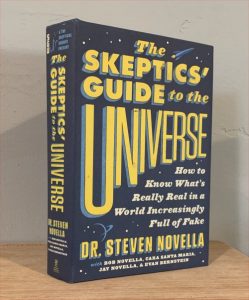 Novella, Steven. 2018. The Skeptics’ Guide to the Universe: How to Know What’s Really Real in a World Increasingly Full of Fake. Grand Central. ***
Novella, Steven. 2018. The Skeptics’ Guide to the Universe: How to Know What’s Really Real in a World Increasingly Full of Fake. Grand Central. ***
Compiled by the producer and host of podcast of the same name (aka SGU), this is an encyclopedic guide to core concepts of skepticism (how our senses deceive ourselves; motivated reasoning; logical fallacies, cognitive biases, and heuristics); to examples of pseudoscience (p-hacking, conspiracy theories) and cautionary tales from history (clever Hans, quantum woo, pyramid schemes). Then examples of applying skepticism to topics like GMOs and claims of free energy. Media issues (fake news, false balance). How pseudoscience can kill (naturopathy; exorcism; denial of medical treatments). And a final section about being willing to change one’s mind when evidence compels you to. Don’t tell people what to think, but how. The book is uneven at times (with five co-authors), but exhaustive. (post)
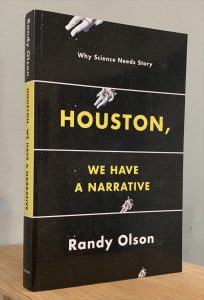 Olson, Randy. 2015. Houston, We Have a Narrative. University of Chicago. ***
Olson, Randy. 2015. Houston, We Have a Narrative. University of Chicago. ***
The author is a professor of marine biology who became a Hollywood filmmaker and then took the lessons he learned in Hollywood back to scientists, to tell them how to improve their press releases and article abstracts. How to avoid a dry recitation of facts (AAA) with a narrative (ABT: And, But, Therefore) while avoiding overcomplication (DHY: this Despite this However this Yet this). Along the way we hear about Joseph Campbell’s Hero; thesis, antithesis, synthesis; word/sentence/paragraph; miniplot/archplot/anitplot; and why Al Gore’s An Inconvenient Truth, and climate change in general, are boring. It’s not a book about how to understand science through narrative; it’s about using narrative to communicate scientific results to the public. (post)
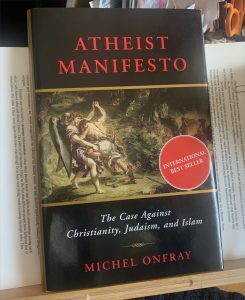 Onfray, Michel. 2007. Atheist Manifesto: The Case Against Christianity, Judaism, and Islam. Arcade. ***
Onfray, Michel. 2007. Atheist Manifesto: The Case Against Christianity, Judaism, and Islam. Arcade. ***
This was a bestseller in Europe in 2005, the same era the “new atheists” (Harris, Dawkins, Dennett, Hitchens) were publishing their books in the US and UK. Onfray deconstructs the three major Western religions on historic, ethical, and rational grounds, while advocating for a post-Christian secular order, an “atheology,” to replace traditional theology. He discusses how the holy books came about through elementary historical processes; how other books were banned or burned, and the hatred of science impeded Western civilization; how in science the church has been wrong about everything; how the monotheisms’ ideas of paradise align with hatred of women, condemnation of homosexuals and abortion, celebration of castration and other maiming rituals. On Christianity: how in Jesus’ era many made grandiose claims, and stories about heroes born of virgins were commonplace; how the religion itself was the creation of Paul of Tarsus, and thus reflects his neuroses (he hated intelligence and culture). On Theocracy: the three holy books took centuries to find their final form; the idea of worshiping one god was the invention of the Jews to justify their annihilation of rival tribes; clerics and war leaders cherry-pick the holy texts to justify whatever they want. And Islam took the worst parts of the earlier two: chosen people, others are subhuman, the world is binary, no subtlety. Lots of good material here — the author has millennia of history at his fingertips — but there’s almost nothing of the opening theme, about how to create his post-Christian secularism. (Read Mar 2022) (post1; post 2; summary)
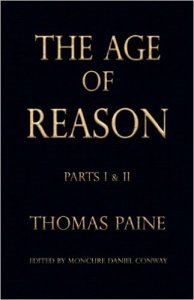 Paine, Thomas. 2010. The Age of Reason. Merchant Books. ***
Paine, Thomas. 2010. The Age of Reason. Merchant Books. ***
Thomas Paine was one of the founding fathers of the US who, despite claims the founders planned a Christian nation, wrote this set of essays as a passionate denouncement of Christianity. Paine defends his deistic belief — that the obvious magnificence of the universe indicates a creator God — but ridicules the Bible on numerous grounds, and rejects all formal creeds. The striking take-away reading this work now is how easy it was, even centuries ago, for anyone to closely read the Bible, compare its various texts, and perceive its absurdities and historical oddities. Topics include the devious methods by which claims of fulfilled prophecy in the New Testament took passages from the Old out of context (the third section of the book details these exhaustively); the parallels between Christian faith and “heathen” mythologies (e.g. the pantheons of Christian saints and Greek gods); notes how the “word of God” was decided by vote centuries after the texts were written down; how the NT isn’t a history of the life of Jesus, but only a collection of detached anecdotes; the incoherency of the justitifcation for the crucifixion; how the Church deliberately suppresses science to maintain its domination. The second part of the book examines specific implausibilities: the dicey chronologies; how the word Isaiah used for Mary didn’t necessarily mean virgin at all (and how if she were, how was this known?); how the traditional story of Jesus is “blasphemously obscene”; and wonders where the saints who rose out of the graves, in Matthew, went, and why no one else noticed them. (summary; long Wikipedia entry)
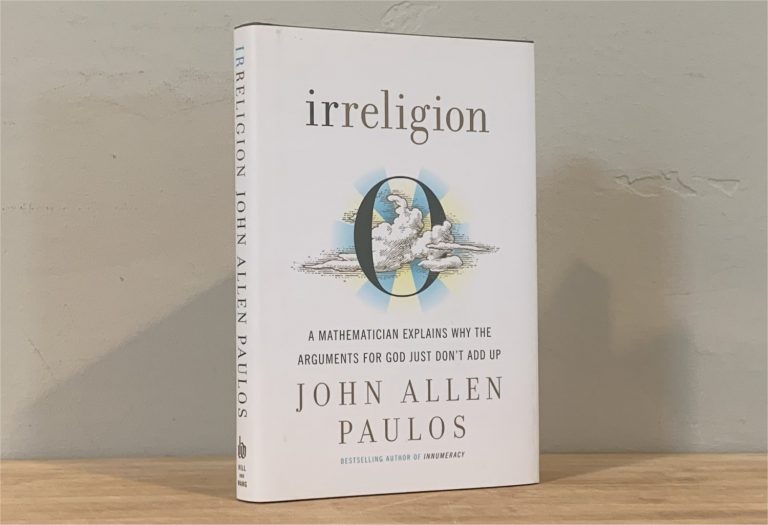 Paulos, John Allen. 2008. Irreligion: A Mathematician Explains Why the Arguments for God Just Don’t Add Up. FSG/Hill and Wang. ***
Paulos, John Allen. 2008. Irreligion: A Mathematician Explains Why the Arguments for God Just Don’t Add Up. FSG/Hill and Wang. ***
A slender and breezy book by a mathematician, dismantling the common arguments for the existence of God. The four classical arguments (first cause, design, anthropic principle, ontology) on grounds of logical incoherence and/or statistical implausibility; subjective arguments (coincidence, prophecy, subjectivity, interventions) on statistical grounds; and four psycho-mathematical arguments (redefinition, cognitive tendency, universality, and gambling). With asides about a personal pseudoscience, recursion, emotional need, Jesus and CS Lewis, a dream conversation with God, and the idea of “brights.” (post)
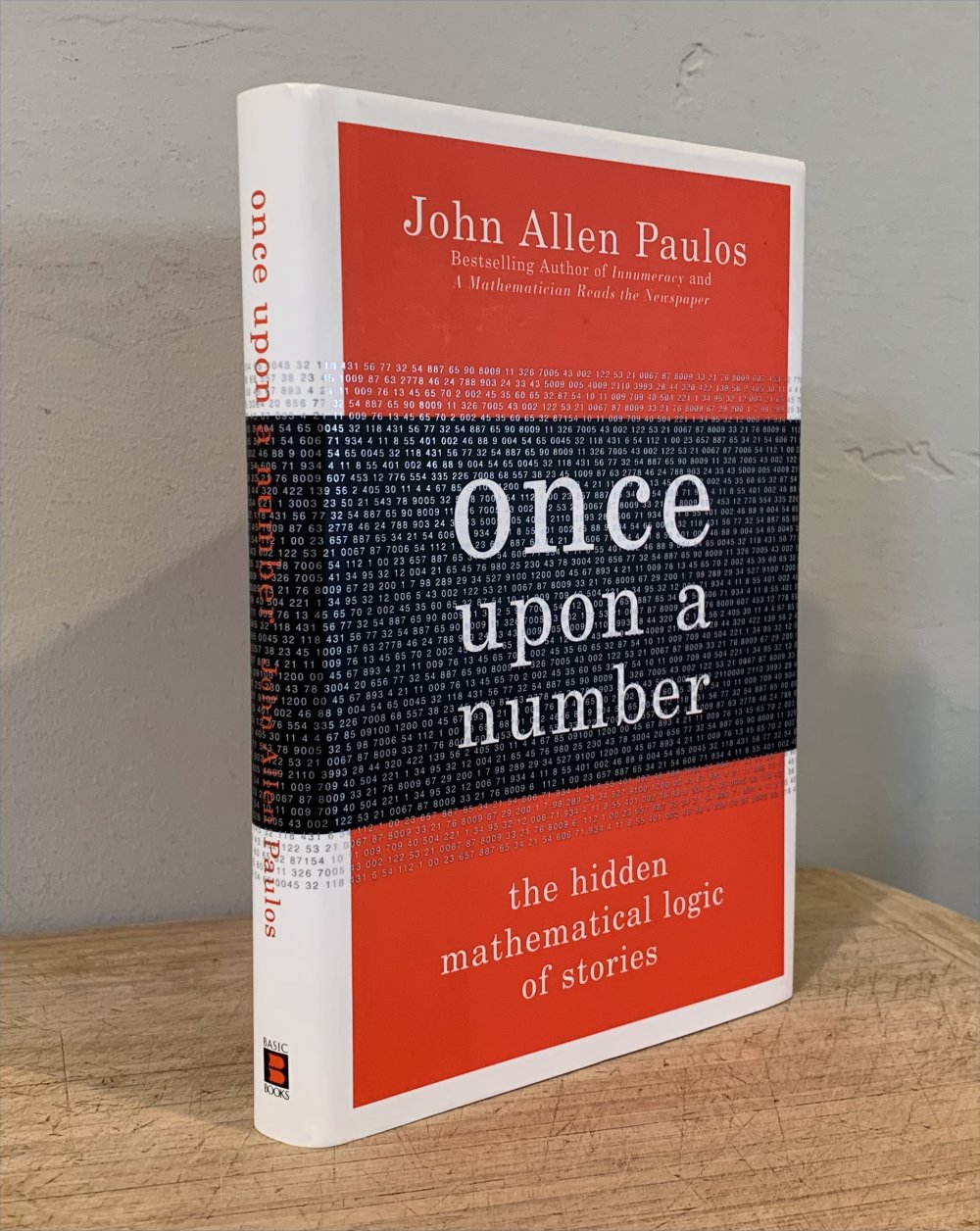 Paulos, John Allen. 1998. Once Upon a Number: The Hidden Mathematical Logic of Stories. Basic Books. ***
Paulos, John Allen. 1998. Once Upon a Number: The Hidden Mathematical Logic of Stories. Basic Books. ***
Paulos compares and contrasts the ideas of narrative and statistics, how some things are best understood one way or the other, and how humans have a way of confusing the two. As in Paulos’ other books, general themes are illustrated with copious examples and anecdotes. Themes are stories vs. statistics; subjective viewpoint vs. impersonal probability; informal discourse and logic; meaning and information. Examples include surveys conducted with ideological axes to grind; a rabbi who introduces only subjects for which he has parables; how news focuses on anecdotes which can be deceptive and distort public policy; how we rationalize coincidences (Bible Code, sex scandals); a parable about furious feminists in a village with philandering husbands. How in any sufficiently large set of elements, unlikely things will occur. Beware category mistakes — don’t elevate personal details into grandiose movements. Example of Princess Diana: was her demise just circumstances, or the result of a sordid soap opera? Religion is about stories; science tends to diminish the personal. They can coexist if we avoid simple-minded attempts to reduce one to the other. (post)
 Paulos, John Allen. 1995. A Mathematician Reads the Newspaper. Basic. ***
Paulos, John Allen. 1995. A Mathematician Reads the Newspaper. Basic. ***
A sequel to Innumeracy, this is a survey of the many topics one finds in newspapers that can be better understood with insights from mathematics, as well as from psychology, including the predisposition of humans to turn everything into stories. Topics include politics (voting schemes, psychological biases, equivocation, coincidences); social issues (gun control, abortion, stock market patterns, lawsuits, advertising); lifestyle issues (celebrity profiles, perceiving trends that don’t exist); science and medicine (clarity vs precision, why reporting is credulous about supernatural claims, category errors); food, fashion, and sports (nutrition info, sports records, top 10 lists, how religious coverage avoids mentioning the absence of evidence for beliefs, obituaries). Always be smart; seldom be certain. (post)
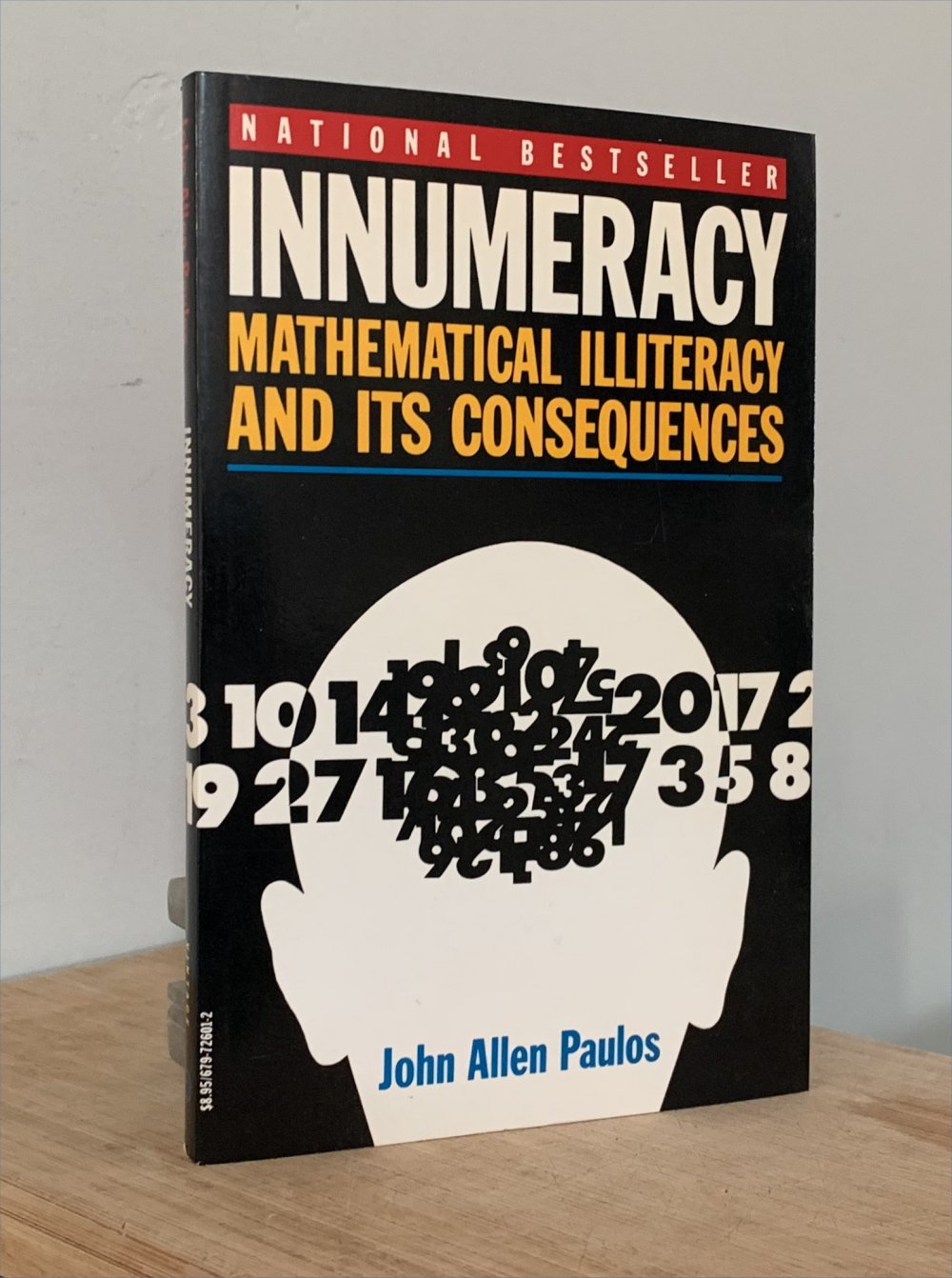 Paulos, John Allen. 1990. Innumeracy: Mathematical Illiteracy and Its Consequences. Vintage. *** 1/2
Paulos, John Allen. 1990. Innumeracy: Mathematical Illiteracy and Its Consequences. Vintage. *** 1/2
The first of several by this author about applying mathematical concepts in every day life, and the harm in not being able to do so. Examples, among many, include not understanding the difference between a million and a billion, the persistence of pseudosciences like astrology, and the underappreciation of coincidences and other randomness in every day life. Numeracy involves understanding the news media’s bias toward coincidences, assessing probability usefully (e.g. dying by terrorist attack v dying by slipping in the bathtub), understanding the nature of voting methods, type I and type II errors, and random samples. Above all the author emphasizes “the irreducibly probabilistic nature of life,” appreciating which is a mark of maturity and balance. (post)
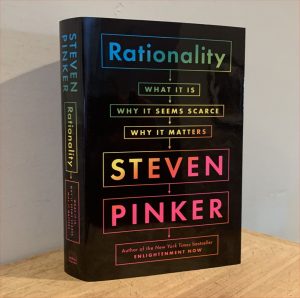 Pinker, Steven. 2021. Rationality: What It Is, Why It Seems Scarce, Why It Matters. Viking. ****
Pinker, Steven. 2021. Rationality: What It Is, Why It Seems Scarce, Why It Matters. Viking. ****
Pinker discusses rationality as the ability to use knowledge to attain goals, yet admits problems when different people’s goals conflict (morality) or one’s goals today might conflict with later ones (wisdom). He explain situations in which it’s rational to be irrational, or at least powerless. The bulk of the book is an extensive guide of the tools of rationality: logic; probability; Bayesian reasoning; risk and reward; hits and false alarms; self and others (game theory); correlation and causation. Finally he tries to understand the current state of apparent irrationality, what with conspiracy theories and the persistence of supernatural beliefs. Not so much the effect of social media, he claims, but rather how our “cognitive facilities work well in some environments and for some purposes but go awry when applied at scale, in novel circumstances, or in the service of other goals.” Discussions thorough, thoughts sometimes profound, writing often sparkling, examples colorful. (post)
 Pinker, Steven. 2018. Enlightenment Now: The Case for Reason, Science, Humanism, and Progress. Viking. *****
Pinker, Steven. 2018. Enlightenment Now: The Case for Reason, Science, Humanism, and Progress. Viking. *****
Notes forthcoming
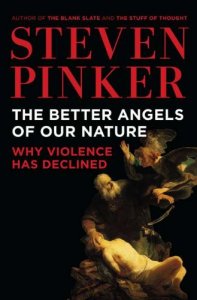 Pinker, Steven. 2011. The Better Angels of Our Nature. Viking. *****
Pinker, Steven. 2011. The Better Angels of Our Nature. Viking. *****
An expansive book that, in detailing how violence has greatly declined over millennia and especially in recent centuries and decades, tells the history of the human race. The book covers big trends of history (transition to agriculture, the age of reason and the enlightenment, etc.), our five inner demons (violence, dominance, revenge, sadism, ideology), our four better angels (empathy, self-control, moral sense, and reason), and five historical forces (Leviathan; commerce; feminization; cosmopolitanism; and the escalator of reason) that have brought about the modern world. (thesis and outline; summary of chapter 1; summary of chapters 2 and 3; some quotes)
 Pinker, Steven. 2002. The Blank Slate: The Modern Denial of Human Nature. Viking. *****
Pinker, Steven. 2002. The Blank Slate: The Modern Denial of Human Nature. Viking. *****
Another big Pinker book summarizing and extending themes considered in his own earlier books and in books by Minsky, Wilson, Sagan/Druyan, Haidt, and Greene. The book actually addresses not one but three misapprehensions about the human mind: that it’s a “blank slate,” that there is such a thing as a “noble savage,” and that there is a “ghost in the machine,” i.e. a noncorporeal force, like a homunculus or a soul, riding in our brain and making our decisions for us. The first notion, with its implication that human nature is a product of education and environment, does not even bear close examination. Our instincts, and our ability to learn, indicate something already present in the mind (rather like firmware or the operating system in a computer) at birth. This understanding has replaced earlier ideas of associationalism and behaviorism of 20th century psychology, just as cognitive neuroscience and evolutionary psychology have undermined notions of the savage and the ghost. By page 101 Pinker closes his case that the mind is not a blank slate; the remainder of the book explains why the idea is resisted (fears of inequality, nihilism), and explores aspects of human nature: how we perceive reality, how our intuitions go wrong, why we suffer, our moral sensibilities. With special attention to politics, violence, gender, children, and the arts. Running themes include how these ideas challenge both liberal and conservative presumptions, and how the expansion of experience and knowledge over human history necessarily requires a transition from a monocultural morality to a multicultural one. Another vast book by Pinker that provides insight to virtually everything. The link here is to the 10th post summarizing the book, with links to the earlier nine. (post)
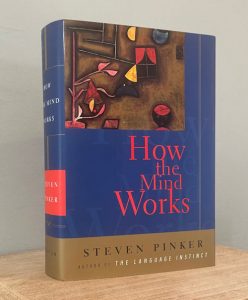 Pinker, Steven. 1997. How the Mind Works. Norton. *****
Pinker, Steven. 1997. How the Mind Works. Norton. *****
Pinker’s second big book after THE LANGUAGE INSTINCT (1994), this one covers many additional topics about the mind. The first part covers evolution and natural selection, and how the mind interprets and understands reality. The second half covers what’s come to be called evolutionary psychology, how interactions between people with minds provides insight into aspects of human cultures. (This part resembles Wilson’s earlier CONSILIENCE.) Key theme: “The mind is a system of organs of computation, designed by natural selection to solve the kinds of problems are ancestors faced in their foraging way of life, in particular, understanding and outmaneuvering objects, animals, plants, and other people.” The mind is what the brain does. Its complex design is genetic. Nature vs nurture is so simplistic as to be not even wrong. Behaviors we think evolutionarily maladaptive (like homosexuality or celibacy) don’t need to be “explained”; they are expressions of minds that formed in our ancestral environment; humans didn’t evolve to spread their genes, they evolved to enjoy behaviors that spread genes. Old notions of souls or force fields have given way to the Computational Theory of the Mind. Evidence for natural selection is overwhelming, despite people desperately wanting it to be wrong. Humans rule over the other animals due to our big brains. There are chapters about how vision works, human reasoning, emotions (common across all cultures), family values (the evolutionary logic of relationships between parents and children, brothers and sisters, men and women, etc.), and a final chapter about “The Meaning of Life,” covering the arts, humor, religion, free will, morality. Perhaps our evolved cognitive equipment, suitable for unconscious survival, is insufficient to understand deep issues. A book both vast and deep, like Wilson’s, it summarizes the modern scientific understandings of almost everything. (Post 1; Post 2; Post 3; Post 4; with a final Post 5 compiling several long quotes from the book.)
 Plait, Phil. 2002. Bad Astronomy: Misconceptions and Misuses Revealed, from Astrology to the Moon Landing “Hoax”. Wiley. ***
Plait, Phil. 2002. Bad Astronomy: Misconceptions and Misuses Revealed, from Astrology to the Moon Landing “Hoax”. Wiley. ***
Fun book by a blogger, skeptic, and TV personality who sets out to debunk commonly misunderstood ideas of astronomy and pseudo-science. Examples include what causes the seasons, what causes the moon’s phases, why stars twinkle, examples of bad astronomy in Hollywood pictures (sounds in space, spacecraft that bank like jet fighters, etc.), and debunking supposed hoaxes and pseudo-science (the moon-landing, Velikovsky, creationism, astrology). (post)
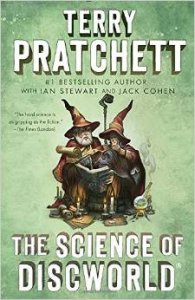 Pratchett, Terry, & Ian Stewart, Jack Cohen. 1999. The Science of Discworld. Ebury Press. ***
Pratchett, Terry, & Ian Stewart, Jack Cohen. 1999. The Science of Discworld. Ebury Press. ***
Discworld is a popular series of fantasy novels by Pratchett, but this book is not a rationalization of its universe, but rather an explanation of how its world, in which magic works and everything happens for a reason (a thesis dubbed “narrativium”), contrasts with our own, in which those two things are not true. Stewart and Cohen are popular science writers, and this book, in between fictional chapters by Pratchett, is a primer on current scientific thinking about the origins of the universe, physical theories of everything, the formation of our planet, the history of life on earth, the evolution of dinosaurs and ultimately of humans, told in a straightforward, insightful and occasionally cheeky, occasionally profound, manner. Another running concept is how most explanations given to children have to be simple: “lies to children”. (post)
 Prothero, Stephen. 2016. Why Liberals Win the Culture Wars (Even When They Lose Elections): The Battles That Define America from Jefferson’s Heresies to Gay Marriage. HarperOne. ***
Prothero, Stephen. 2016. Why Liberals Win the Culture Wars (Even When They Lose Elections): The Battles That Define America from Jefferson’s Heresies to Gay Marriage. HarperOne. ***
Cultural wars in America are not new; they go back to Thomas Jefferson. The author’s thesis is 1) that conservatives start cultural wars, as inevitable societal change gradually passes them by; and 2) liberals win those wars as once-controversial topics (women’s suffrage, gay marriage) become cultural norms. Conservatives then find something else to complain about [as in 2024, transgender people]. I read just the introduction, which describes this culture wars cycle; the chapter on contemporary culture wars, essentially a history of social controversies since the 1960s, exacerbated by Reagan, Falwell, et al; and the conclusion, that despite a few isolated victories, conservatives lost the culture wars badly. Yet there will always be disagreements; there will always be gays and bigots. The deep unstated premise: there will always be change, and conservatives will always be uncomfortable with it. (Now in 2024, will Trump’s new regime change this conclusion? Trump may wreck swaths of the US government, but ultimately he will fail to change the culture.) (post)
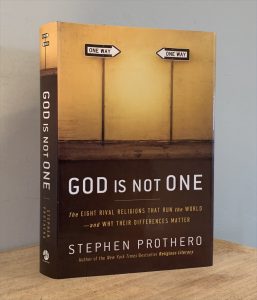 Prothero, Stephen. 2010. God Is Not One: The eight rival religions that run the world — and why their differences matter. HarperOne. ** 1/2
Prothero, Stephen. 2010. God Is Not One: The eight rival religions that run the world — and why their differences matter. HarperOne. ** 1/2
Valuable, useful and irritating by turn, the book first sets out to demolish the bromide that all religions are equally true in some sense. They are not, though they follow similar patterns, crudely, in identifying a problem (sin, pride, suffering) and offering a solution (salvation, submission, awakening). The bulk of the book describes the eight big religions, in order of perceived importance to the world today, beginning with Islam. All religions change over time, subject to political forces and cults of personality; the eastern religions are more philosophies of life than belief-systems; at least one, the Yoruba tribal religion of West Africa, sounds like an over-complicated fantasy novel. The book is spoiled by the author’s antagonism toward those he calls the “angry new atheists”; he is angrier about them than they are about religion. The author is clearly a believer in belief, at the end reminding the reader to be “humble” (and never mind the truth or lack thereof of any of these religions). (post)
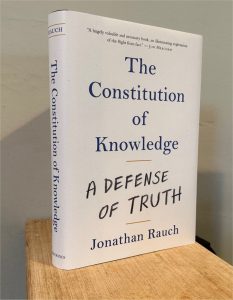 Rauch, Jonathan. 2021. The Constitution of Knowledge: A Defense of Truth. Brookings Institition. *****
Rauch, Jonathan. 2021. The Constitution of Knowledge: A Defense of Truth. Brookings Institition. *****
Rauch reacts against the epistemic crisis formed by disinformation and conservative politics that has resulted in the public’s incapacity to tell truth from lie. The solution is to defend the set of rules and norms that have arisen over the past century to create our functioning society. This “constitution” has two essential principles: “no final say” and “no personal authority.” Adhering to these rules creates “a community of error-seeking inquirers accountable to each other but never to any particular authority, and knowledge will arise from their hive-like, largely self-organizing activities” — quite analagous to science. Rauch reviews why reason arose at all, given our psychogical biases, and how those biases were reigned in by the Industrial Revolution, and American revolution, and finally the scientific revolution, which introduced methods for making errors and finding them quickly. More formally, he characterizes the “reality-based community” as guided by a fallibist rule, and an empirical rule, that have become inherent in the “mainstream media” in contrast to the “yellow journalism” of the 19th century and now Fox News. The balance of the book recounts the history of how this “constitution” came about. Summary: “the Constitution of Knowledge is the most successful social design in human history, but also the most counter-intuitive. In exchange for knowledge, freedom, and peace, it asks us to mistrust our senses and our tribes, question our sacred beliefs, and relinquish the comforts of certitude. It insists that we embrace our fallibility, subject ourselves to criticism, tolerate the reprehensible, and outsource reality to a global network of strangers.” (Post 1; Post 2; plus this post showing pages of the book that detail how this reality-based community works, which happens to correspond the “deep state” conservatives unthinkingly want to dismantle.
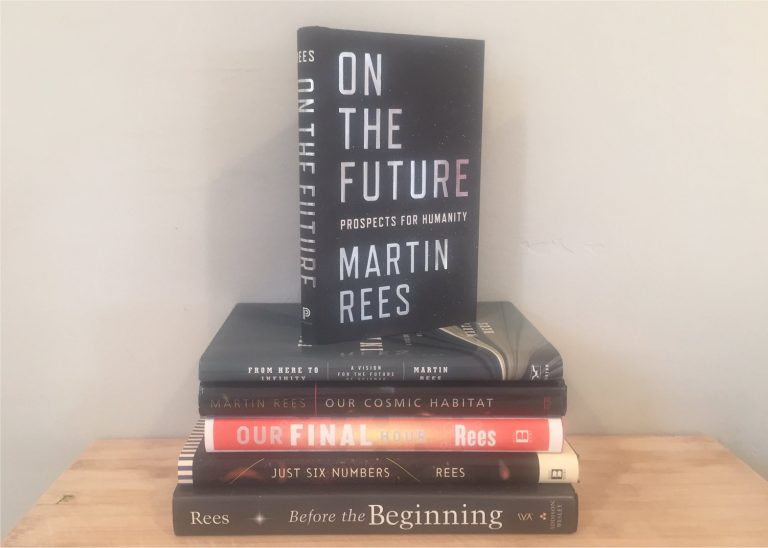 Rees, Martin. 2018. On the Future: Prospects for Humanity. Random House. ****
Rees, Martin. 2018. On the Future: Prospects for Humanity. Random House. ****
This British astronomer and astrophysicist’s 2018 book is based on a series of 2010 lectures, and was preceded by the 2003 Our Final Hour, which explored various ways humanity might be doomed. This book has a broader scope. Its theme is “The flourishing of the world’s growing population depends on the wisdom with which science and technology is deployed.” He reviews existential threats like climate change and nuclear war, then consider humanity’s future on themes of biotech, cybertechnology, job loss, universal income, and the risk of global networks. Then humanity in a cosmic perspective: Sagan’s pale blue dot; Darwin; a post-human era; SETI. The limits of science: how complexity emerges from simple laws; whether there are things we’ll never know because our brains are incapable of understanding them; issues of God and religious rituals. Finally on the diversity of science, how science is the one culture that’s global, and how threats need to be tackled internationally. (post)
 Reich, Robert. 2018. The Common Good. Knopf. *** 1/2
Reich, Robert. 2018. The Common Good. Knopf. *** 1/2
A short book that lies at the intersection of politics, morality, and human nature, by the UC Berkeley economist. The “common good” is the set of shared values of a society, it’s not about socialism or political parties, and it’s a sense that’s been lost in recent years. How do we get it back? It was the basis for “we the people,” FDR’s four freedoms, civil rights, and public education. It’s the opposite of Martin Shkreli and Ayn Rand. (Reich however does not explore the deep evolutionary reasons why the common good came to exist, as other writers do.) Breakdowns in the shared understanding of a common good began in the 1960s, from Watergate to Iran-Contra to Newt Gingrich to Bernie Madoff and the financial crisis of 2008. Three broad structural breakdowns: whatever-it-takes-to-win politics; whatever-it-takes-to-maximize-profits; and whatever-it-takes-to-rig-the-economy. (Reich diplomatically does not mention that it’s Republicans and conservatives who do most of these things.) How to restore the common good? Bring back a sense of honor and shame. Hold people accountable. Identify and share the truth, rather than spreading lies and fake news. And revive civic education. And critical thinking, how to be skeptical but not cynical. Realize there are more good things happening in the world every day that we simply don’t hear about. (post)
- Reich, Robert B.. 2017. Economics in Wonderland: Robert Reich’s Cartoon Guide To A Political World Gone Mad And Mean. Fantagraphics. –
Notes forthcoming
- Richardson, Heather Cox. 2023. Democracy Awakening: Notes on the State of America. Viking. –
Notes forthcoming
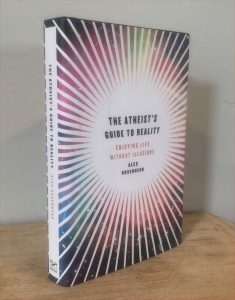 Rosenberg, Alex. 2011. The Atheist’s Guide to Reality: Enjoying Life without Illusions. Norton. ***
Rosenberg, Alex. 2011. The Atheist’s Guide to Reality: Enjoying Life without Illusions. Norton. ***
Author takes the non-existence of God as a given, and explores how therefore to think about reality. Humans evolved to understand the world through stories, but the physical facts explain the nature of reality; the part of physics that explains us has been finished for 100 years. There is no objective morality, but humans have evolved a “core morality” through natural selection and “environmental filtration” (a nice phrase) to handle conflicts within and between tribes. There is no purpose; progress in history is at best local. Core morality with scientism leads to a fairly left-wing agenda: one that is redistributionist and egalitarian. Moral progress comes when people abandon incorrect facts about the world. Author reviews history of science vs. humanists, Snow’s two cultures. [[ I take issue with his claim that since the brain is just activity between neurons, there are no “thoughts” that are “about” anything; this strikes me as the reductionist trap that other authors, like Sean Carroll and Frank Wilczek, avoid. (One could say the same about the Bible, or any other book, as being merely an arrangement of 26 letters, and so meaningless.) And his use of the word “scientism” is different than how it’s come to be used. ]] (notes, with discussion about vocabulary and celestial tea-pots)
 Rosling, Hans. 2018. Factfulness: Ten Reasons We’re Wrong About the World–and Why Things Are Better Than You Think. Flatiron Books. ****
Rosling, Hans. 2018. Factfulness: Ten Reasons We’re Wrong About the World–and Why Things Are Better Than You Think. Flatiron Books. ****
The late Swedish educator, cofounder of the Gapminder Organization, discovered through surveys that most people think the world is worse off than it is (poverty, life expectancy, etc.). This is due to various “instincts” [or psychological biases], explored in 10 chapters: about the gap instinct (how people divide the world into “us” and “them”), negativity, the assumption that trends will continue in a straight line, the tendency to jump to the worst possible conclusion, and so on. The book is thus a complement to Pinker’s Better Angels and various books about psychological biases, using less technical language. The key to overcoming these instincts is education, teaching children humility and curiosity, taking businesses global, being aware that journalists will always focus on the unusual and not the common. A specific suggestion is to abandon the split between “developed” and “developing” (or “third world”) nations, but rather a distinction among four levels of income, from $2/day to over $32/day; of the world’s 7 billion people, the divide is roughly 1, 3, 2, and 1 billion in those four levels. (post)
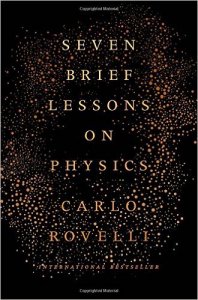 Rovelli, Carlo. 2016. Seven Brief Lessons on Physics. Riverhead. ***
Rovelli, Carlo. 2016. Seven Brief Lessons on Physics. Riverhead. ***
Slender book compiled from the author’s newspaper column intended for readers who know nothing about science. It’s noteworthy for the author’s ponderings on the native caution of scientists, and how humanity’s place in the universe is very small, despite our previous misconceptions (echoing Sagan’s “demotions” in PALE BLUE DOT). His conclusion is pessimistic: that our species will not last long. But it has happened before, with cousin species, and individual human cultures, having disappeared. But as our knowledge of the world continues to grow, we can perceive “the mystery and the beauty of the world.” (post)
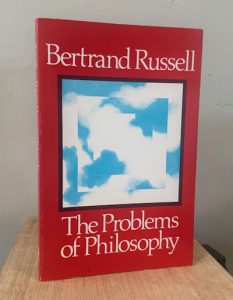 Russell, Bertrand. 1959. The Problems Of Philosophy. Oxford Univ Press. *** 1/2
Russell, Bertrand. 1959. The Problems Of Philosophy. Oxford Univ Press. *** 1/2
A short book about the most basic issues of philosophy: how do we know what’s real? How do we know what’s so? Russell drills through “common sense” notions about these issues to their core meanings. Some of the puzzles Russell examines have been illuminated by discoveries in recent decades in evolutionary psychology, animal perceptions, and the diversity of human cultures. His insights on the value of philosophy are profound: it’s a way of breaking out of what is essentially a conservative mindset and instead contemplating the greater reality outside one’s own interests (in much the way, I would say, science fiction can); the post has a couple long quotes. (post)
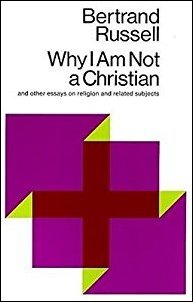 Russell, Bertrand. 1957. Why I Am Not a Christian. Touchstone. ****
Russell, Bertrand. 1957. Why I Am Not a Christian. Touchstone. ****
The core of this book is his 1927 essay, in which Russell explains his position on two grounds: first, the arguments for the existence of God through reason are easily refuted, as he summarizes; second, he identifies several defects in Christ’s teachings (e.g. claims of an imminent Second Coming that never happened, his belief in the everlasting torment of Hell), and finds Buddha and Socrates more worthy of respect than Christ. He understands that most people believe in God because they have been taught from childhood to do so, and people accept religion on emotional grounds, or upon fear of the unknown. He notes how religion’s supposed morality has led to atrocities throughout history, and how advances in social and moral progress across history have been opposed by organized religion. (post)
 Sacks, Oliver. 2015. Gratitude. Knopf. ***
Sacks, Oliver. 2015. Gratitude. Knopf. ***
A collection of four short essays written by the author after learning he had only a few months to live. He learns to focus, to ignore politics and global warming, things he cares about but no longer has time for. More than fear, he feels gratitude, for being given sentient life and experiencing the world. And he compares the horror of his family’s reaction to his being gay, to acceptance decades later at a family event in Israel. And finally welcomes death as a kind of Sabbath. (post)
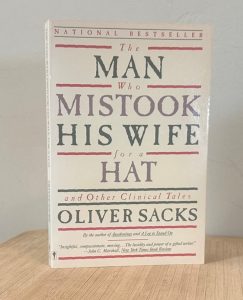 Sacks, Oliver. 1987. The Man Who Mistook His Wife for a Hat: and Other Clinical Tales. Perennial. *** 1/2
Sacks, Oliver. 1987. The Man Who Mistook His Wife for a Hat: and Other Clinical Tales. Perennial. *** 1/2
First published in 1985, this is a collection of essays by a clinical neurologist describing the effects of various kinds of neurological disorders. The gist is that these disorders are associated with specific parts of the brain; recourse to demons or souls had been abandoned by the 1960s and ’70s. The famous title essay is about a musician who has trouble recognizing faces, who sometimes perceives faces that aren’t there, and who, searching for his hat as he prepares to leave, grasps his wife’s head instead. Sacks doesn’t always diagnose; often he speculates on how people live with such disorders, even whether they might not be disadvantages or disabilities. Other cases include a man who’s lost his memory of everything after 1945; a medical student who experiences enhanced senses of color and smell but only for three days; Hildegard, whose migraines she saw as visions from God; twins in a mental hospital who can name the day of the week for any date, but who can’t do simple arithmetic; and an autistic man with no interest in the abstract, only the concrete. (This last came before the current understanding of the “spectrum” of autism.) Sacks concludes that the brain is both a machine and a computer, while our mental processes also involve judging and feeling, without which we are computer-like. (post)
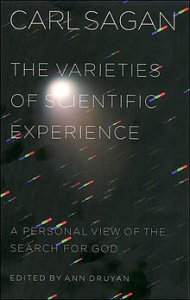 Sagan, Carl. 2006. The Varieties of Scientific Experience: A Personal View of the Search for God. The Penguin Press. ***
Sagan, Carl. 2006. The Varieties of Scientific Experience: A Personal View of the Search for God. The Penguin Press. ***
A posthumously published collection of nine lectures Sagan presented in 1985, here edited by Ann Druyan. Despite his invitation to speak of “natural theology,” Sagan repeatedly deflects ideas that theological knowledge can be established by reason or experiment; he politely mentions such notions and then wonders if we should not perhaps seriously consider that there might be better explanations. Topics include the awe of looking into the night sky (and how the vastness of the universe has been taken into account by no Western religions), and considers science to be “informed worship.” He anticipates human mental biases by reflecting on how humans project our own feelings and privilege to think ourselves the center of the universe. The history of science has done away with divine microintervention in earthly affairs; objections to evolution are misguided. He speculates on beings more intelligent (rather than powerful) than us. He reflects on the willingness to believe in ancient astronauts and UFOs, and sees similar lack of scrutiny in believing supernatural miracles. And he reviews so-called proofs of God, beginning with 11th century proofs of the Hindu God (“these arguments are not always highly successful”) and compares modern Western counterparts. Why didn’t God set things right in the first place? Why no clear evidence of his existence? He traces predispositions toward religious belief to the emotions of our primitive ancestors, and how children grow up in a world of giants. And he challenges the supposed wisdom of the ancients with the reality of our changing world and the threat of nuclear war. Finally: the search for meaning is two-pronged: to understand the universe, and to understand ourselves. History is a battle of inadequate myths. It would help to have another planet, another intelligence, to understand ourselves better. (post)
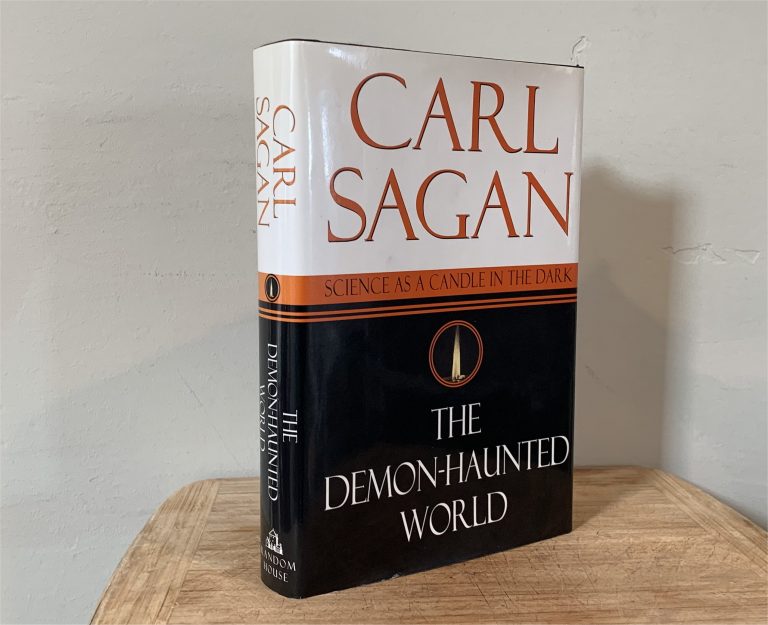 Sagan, Carl. 1996. The Demon-Haunted World: Science as a Candle in the Dark. Random House. *****
Sagan, Carl. 1996. The Demon-Haunted World: Science as a Candle in the Dark. Random House. *****
Sagan takes on pseudo-science by showing how science is the methodology for determining what’s real and what’s bunk, discussing psychological reasons for why people are attracted to pseudo-science (and religion) and put off by real science, and the ways the ideals of science and democracy align. Memorable chapters concern Sagan’s “fine art of baloney detection” (e.g. reproduced here), his “dragon in my garage” metaphor about supernatural claims that lack all evidence, and a strong discussion of the methods of values of science. A running theme: science is a balancing act between being open to wonder, and being skeptical when drawing conclusions; followers of pseudoscience are open to wonder but lack all skepticism. The book is a tad dated in its focus on pseudo-scientific issues of the ’90s, e.g. UFOs and alien abductions, but its principles remain today as relevant as ever. (post)
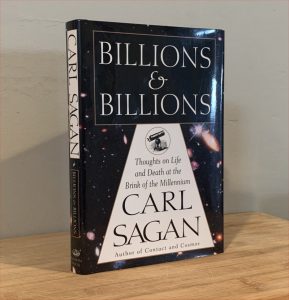 Sagan, Carl. 1996. Billions & Billions: Thoughts on Life and Death at the Brink of the Millennium. Random House. ***
Sagan, Carl. 1996. Billions & Billions: Thoughts on Life and Death at the Brink of the Millennium. Random House. ***
One of Sagan’s last books, this is a collection of essays, many based on shorter pieces written for Parade magazine. Topics include the book’s title phrase, which Sagan claims he never actually said, and the power of exponents, applied to four great cosmic questions. Sagan asks “what are conservatives conserving?” to discuss environmental dangers of global warming, and how the right-wing denies them. A final section about conflicts addresses the US vs. the Soviet Union; abortion (a long essay concluding the dividing line should be around the 30th week, when an embryo’s thinking becomes barely possible); moral codes (the golden rule, the silver rule, etc., and the concept of zero-sum games). A final chapter, by Sagan’s wife Anne Druyan, describes treatments for a rare disease, and his death in 1994. (post)
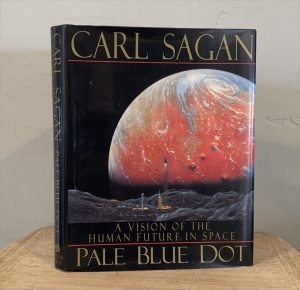 Sagan, Carl. 1994. Pale Blue Dot. Random. ****
Sagan, Carl. 1994. Pale Blue Dot. Random. ****
This “sequel” to 1980’s Cosmos updates that book’s account of humanity’s exploration of the solar system and speculates on how such exploration will proceed into the far future. There are two big highlights: first Sagan’s account of the famous “pale blue dot” photo of Earth taken from the edge of the solar system by Voyager 1, and his moving description of Earth’s place in the vast cosmos; second, a catalog of “demotions,” ways in which human presumptions of being at the center of creation have been undermined, over and over. By the end Sagan contemplates various fates of humanity, and how our ultimate survival may depend on leaving the Earth and exploring the Milky way. (summary part 1; part 2)
- Sagan, Carl, & Druyan, Anne. 1992. Shadows Of Forgotten Ancestors. Random. –
Notes forthcoming
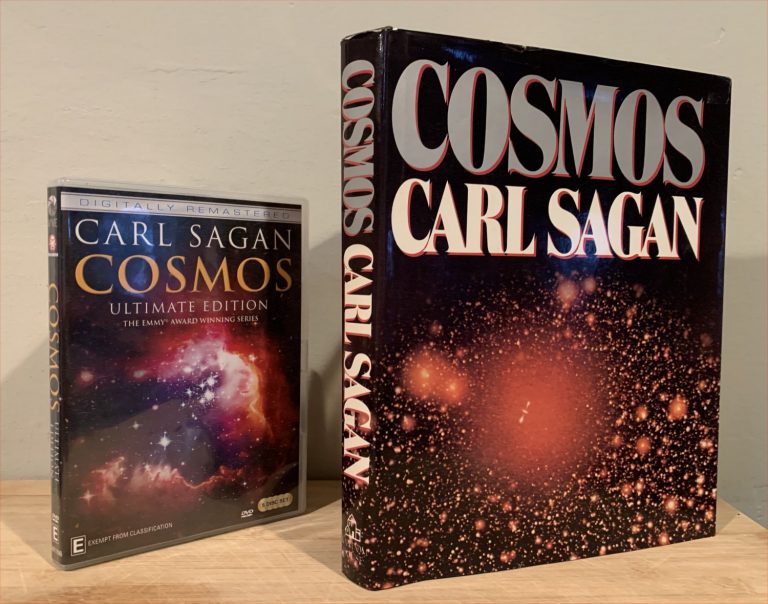 Sagan, Carl. 1980. Cosmos. Random House. *****
Sagan, Carl. 1980. Cosmos. Random House. *****
Sagan’s famous book companion to his 1980 13-part TV series was the best-selling science book of all time, at its time. It’s about what we know about the cosmos — from the planets, to the stars, to the galaxies, to speculations of other intelligences — with explanations of *how* we know these things, many envisioned in historical re-enactments. And concerns about the future of our planet, given environmental threats apparent even back in 1980. (post)
- Sagan, Carl. 1979. Broca’s Brain. Random. –
Notes forthcoming
 Sagan, Carl. 1977. The Dragons of Eden: Speculations on the Evolution of Human Intelligence. Random House. ***
Sagan, Carl. 1977. The Dragons of Eden: Speculations on the Evolution of Human Intelligence. Random House. ***
Sagan, admittedly a little-off topic from his primary concerns, speculates on the evolution of the human brain — how evolution increased complexity, how the brain evolved layers (reptilian, limbic, neocortex), and how the development of early human skills (walking, tools) and of human society (ritualistic, resisting change), reflect the development and current state of the brain. The conclusion is that understanding the brain better will help us resolve certain ethical issues (the definition of death, abortion), and the future is about a partnership between human intelligence and machine intelligence. Secondarily, he speculates that extraterrestrial brains would develop similarly, and that contact with them would validate the idea that intelligence can survive the development of advanced technologies. But the biggest takeaway is Sagan’s “Cosmic Calendar,” his notion of reducing cosmic history to the scale of a single year, an idea vividly displayed in his 1980 TV series Cosmos. (post)
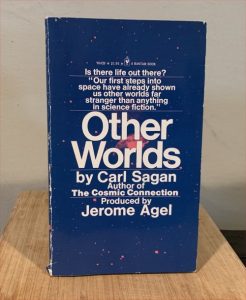 Sagan, Carl. 1975. Other Worlds. Bantam. **
Sagan, Carl. 1975. Other Worlds. Bantam. **
A thin paperback “produced by Jerome Agel” containing photos, cartoons, graphics, and quotes, along with passages by Sagan about the search for extraterrestrial intelligence; pseudoscience from UFO sightings, astrology, and Velikovsky; and the connection of humans to life on earth, the potential of exobiology, and the discoveries humanity is on the verge of making. (post)
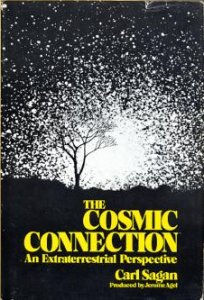 Sagan, Carl. 1973. The Cosmic Connection: An Extraterrestrial Perspective. Doubleday/Anchor Press. *** 1/2
Sagan, Carl. 1973. The Cosmic Connection: An Extraterrestrial Perspective. Doubleday/Anchor Press. *** 1/2
One of the first nonfiction books I read, and foundational in my discovery of astronomy and the perspective of how humanity lives in a vast universe greater than any parochial or religious view. Parts of this, about then-current discoveries in the solar system, are dated, but other chapters, on the 5-billion-year history of Earth, and the motivations for space exploration, are inspiring to this day. Other chapters, about dolphins, seem asides, but later chapters about contact with extraterrestrial life, and classifications of cosmic civilizations, and mankind’s place in a universe of ‘starfolk’, are also as inspiring as ever. (post)
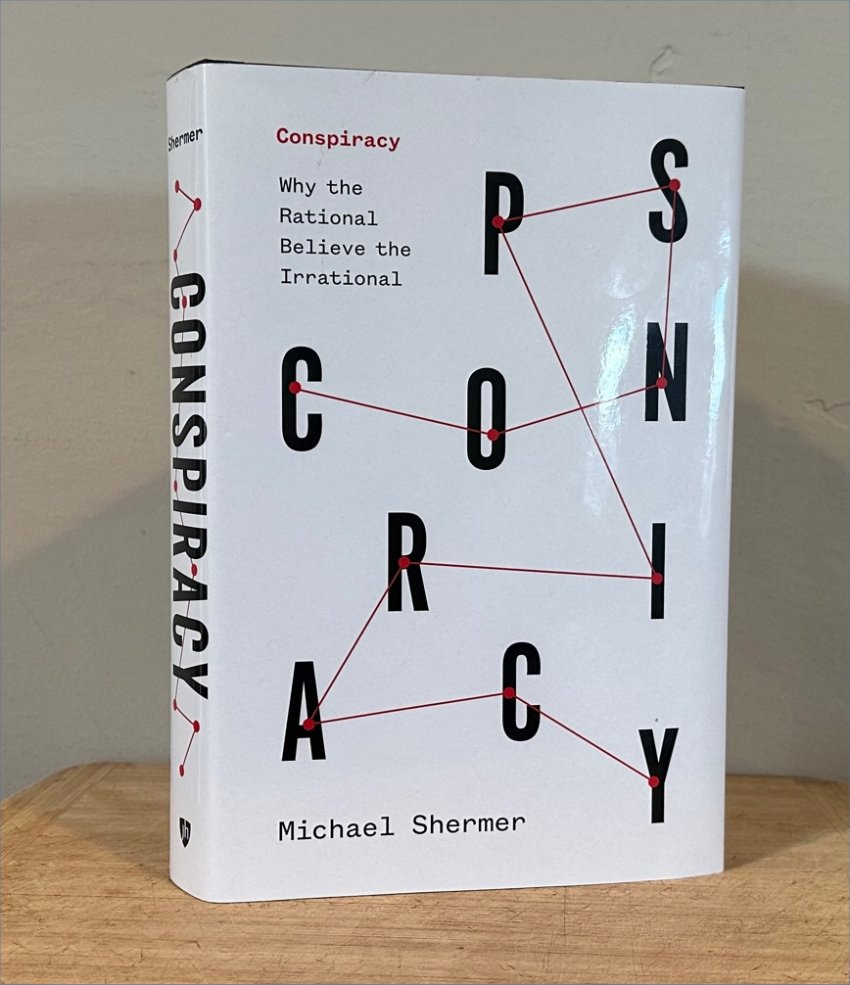 Shermer, Michael. 2022. Conspiracy: Why the Rational Believe the Irrational. John Hopkins. *** 1/2
Shermer, Michael. 2022. Conspiracy: Why the Rational Believe the Irrational. John Hopkins. *** 1/2
A solid, thorough look at why people fall for conspiracy theories. Much of it is familiar from other writing over the past 20 years, but several ideas are new (to me). First, that since a few conspiracy theories are true, it’s a legitimate strategy to see conspiracies everywhere rather than not see them all; seeing conspiracies is a feature, not a bug. (Rather like the overly-active pattern-seeking feature of human perception.) Second, Shermer distinguishes between proxy conspiracism, tribal conspiracism, and constructive conspiracism, and how people subscribe to conspiracies not because they “believe” them but because everyone else in their tribe believes them, or because of their animus toward the theory’s target. Third, conspiracy theorists used to point out “anomalies” in the evidence; these days they simply assert “a lot of people are saying…” or “rigged!” It’s pluralistic ignorance, signing loyalty to a tribe. And fourth, people who believe in government conspiracies do so in open meetings; in real autocracies, like North Korea, people could never do that. The balance of the book is filled with details and examples. He provides a “Conspiracy Detection Kit” modeled after Sagan’s “baloney detection kit”. He goes into considerable detail of 9/11 and Obama conspiracy theories. And he ends with two lists, one tools for confronting others (some resembling Boghossian’s, and Rauch’s), and how to “rebuild trust in truth” to counter the frequency of political lies. A second post quotes a long paragraph about moral progress and how scientific naturalism and enlightenment human have made the modern world, and a list of tenets for how this happened. (post)
 Shermer, Michael. 2015. The Moral Arc: How Science and Reason Lead Humanity Toward Truth, Justice, and Freedom. Henry Holt. *****
Shermer, Michael. 2015. The Moral Arc: How Science and Reason Lead Humanity Toward Truth, Justice, and Freedom. Henry Holt. *****
Shermer’s magnus opus, perhaps, spiritual kin to Pinker’s THE BETTER ANGELS OF OUR NATURE and keying off the famous statement by Martin Luther King about the arc of the moral universe. The thesis is that morality has improved over time, through science and reason: better understanding of the real world that has helped us avoid factual errors that generated behaviors our ancestors and their religions took for granted, but which we increasingly regard as immoral. It is not true that science can say nothing about religion, or that morality depends on religion. Key principles include the “principles of interchangeable perspectives” and the virtue of continuous, rather than black and white, thinking. This understanding of the world began with the scientific revolution (Copernicus to Newton) and the Age of Reason and the Enlightenement (Newton to the French Revolution). Religion is not a source of morality or moral progress; when such progress is made, the churches resist it. Religions are tribal and xenophobic by nature. Shermer offers his own Decalogue (which I’ve included on this page) and critiques the traditional set of ten commandments. Shermer has detailed case studies of how morality has improved regarding slaves, women, gays, and animals. And finally he covers issues of moral regress and evil, free will and moral culpability, competing notions of moral justice, and the future of moral progress. Long summary with quotes at the link. (post)
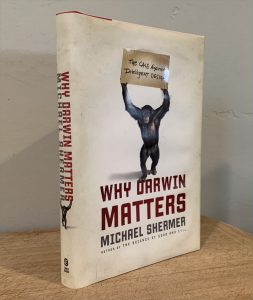 Shermer, Michael. 2006. Why Darwin Matters: The Case Against Intelligent Design. Times Books. ***
Shermer, Michael. 2006. Why Darwin Matters: The Case Against Intelligent Design. Times Books. ***
Shermer addresses evidence for evolution and against intelligent design (ID) in the context of his having grown up as a creationist himself, before escaping his bubble: “The scales fell from my eyes! It turned out that the creationist literature I was reading presented a Darwinian cardboard cutout that a child could knock down.” Beyond the various lines of evidence for evolution, his key point is that all these lines of evidence converge to same idea. He confronts the creationists’ 10 best arguments for ID and rebuts them. More broadly, he examines the creationists’ motivations: they are explicitly religious, and creationists think than can prevail over science by winning court cases, not by doing legitimate science. Finally he offers reasons why conservative and Christians *should* accept evolution: it explains families and social harmony [the evolutionary psychology ideas of Wilson and others] and it justifies the free market. (post)
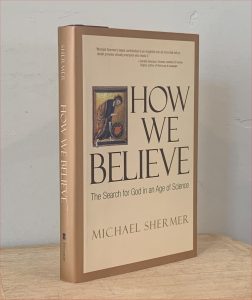 Shermer, Michael. 1999. How We Believe: The Search for God in an Age of Science. Freeman. ****
Shermer, Michael. 1999. How We Believe: The Search for God in an Age of Science. Freeman. ****
This book complements Shermer’s first, about “weird things” people believe, looking at religious beliefs in the US in broad terms, focusing on surveys and polls of belief in God, the afterlife, and so on, with considerations of Messiah myths and millennial stories. A few examples are dated, but the principles remain. Notable is that the author was a born-again Christian in high school whose doubts about religion never went away. Topics include Time Magazine’s famous “Is God Dead?” article; cold readings; how humans perceive things that are not there; people’s beliefs for why they (or others) believe in God. Shermer reviews the common arguments for the existence of God and provides crisp counter-arguments. Also: intelligent design; The Bible Code; how story-telling led to myths; The Messiah Myth, UFO cults, cargo cults; how the story of Apollonius of Ryana is virtually identical to the story of Jesus; and how the marginalized or oppressed are often attracted to millennial beliefs about the end of the world. (post)
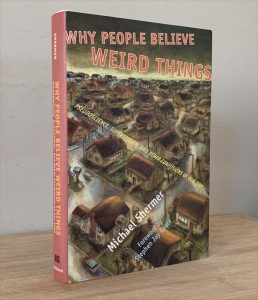 Shermer, Michael. 1997. Why People Believe Weird Things. Freeman. ****
Shermer, Michael. 1997. Why People Believe Weird Things. Freeman. ****
One of the earliest books to address human irrationality in terms of both evidence against various pseudoscientific beliefs and the psychological motivations that lead people to believe things that aren’t true. Author discovered that people want to believe weird things (like psychics) and get angry when frauds are exposed. Skepticism is not cynicism; it’s a method, embodied in the scientific method that has led over 400 years to the modern Western world. Still people believe things that lack evidence and plausibility. Shermer reviews the now familiar fallacies and biases. Then topics include Edgar Cayce, near-death experiences, encounters with aliens, witch crazes, Ayn Rand; evolution and creationism; Holocaust denial. (Shermer held religion for his next book.) Conclusion: people believe weird things because it feels good to believe them; they provide immediate gratification; they offer simplicity in a complex world; they imply morality and meaning; they offer comfort and hope. (post)
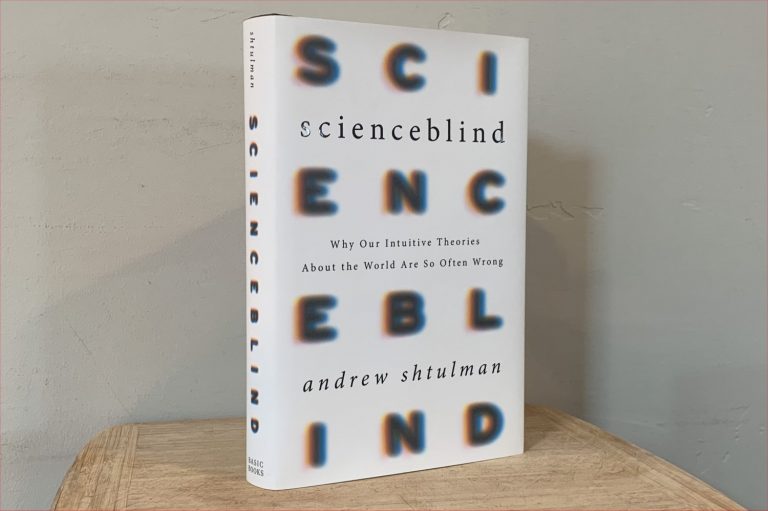 Shtulman, Andrew. 2017. Scienceblind: Why Our Intuitive Theories About the World Are So Often Wrong. Basic. ***
Shtulman, Andrew. 2017. Scienceblind: Why Our Intuitive Theories About the World Are So Often Wrong. Basic. ***
Why our naive “common sense” is frequently wrong: we learn to understand the world, as infants, at a scale that applies only locally. The book examines topics of matter, energy, gravity, motion, cosmos, earth, life, growth, inheritance, illness, adaptation, and ancestry, contrasting naive notions with scientific notions. Naive theories are anthropocentric; they’re better than nothing, but scientific theories that get the world right help us thrive. (post)
 Silverman, David. 2015. Fighting God: An Atheist Manifesto for a Religious World. St. Martin’s/Thomas Dunne. **
Silverman, David. 2015. Fighting God: An Atheist Manifesto for a Religious World. St. Martin’s/Thomas Dunne. **
A blunt book, with little nuance, by the then president of American Atheists, arguing against religion and advocating firebrand tactics to undermine religious privilege. He prefers the word “atheist” to “agnostic” or similar words. He discusses how the “Overton window” can be shifted; legal battles he has fought; rallies he has spoken at; and how all religion is “cafeteria” religion — the religious pick and choose which parts to believe in — and presents a list of questions to believers about why Christianity makes no sense. (E.g. If God is all-powerful, why did it take him six days?) He cheerfully refers to theists as being brainwashed; I think it’s a little more complicated than that. (post)
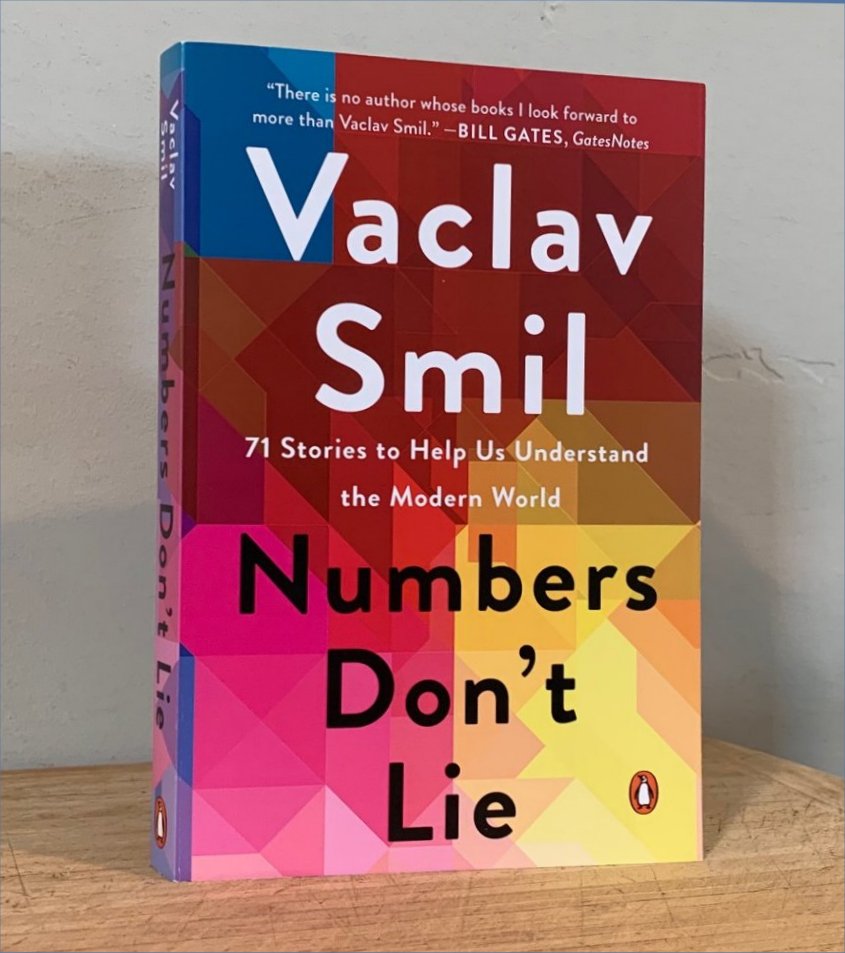 Smil, Vaclav. 2021. Numbers Don’t Lie: 71 Stories to Help Us Understand the Modern World. Penguin Books. ** 1/2
Smil, Vaclav. 2021. Numbers Don’t Lie: 71 Stories to Help Us Understand the Modern World. Penguin Books. ** 1/2
A collection of 71 magazine essays (from IEEE Spectrum) about how to understand the world quantitatively. Topics range from quality of life (best indicator: infant mortality), return on investment for public health (vaccination), what makes people happy (being rich, or poor and Catholic), and whether the US is exceptional (considering infant mortality, lack of universal healthcare, etc: no). A recurring, troubling theme is how dependent our infrastructure is on fossil fuels; it won’t be as easy to get off them as some think. But key themes are taking care to use properly sourced data, and to properly compare data, e.g. when comparing budgets of nations, use the same metrics and appropriate conversion rates to assess them. (He does not mention the internet.) Numbers may not lie, but they must be understood in context; beware ranking that can be misleading, unnecessary precision, and so on. (post)
 Snow, C. P.. 2013. The Two Cultures and the Scientific Revolution. Martino Fine. ****
Snow, C. P.. 2013. The Two Cultures and the Scientific Revolution. Martino Fine. ****
Two essays. The first is a famous 1959 essay about the divide between the scientific community and the literary ‘intellectual’ community that considers it unimportant or even in bad taste to know much about science. One of the most influential and cited essays of the 20th century. The second is about how industrialized nations are getting richer and how poor nations have noticed and will turn to Russia if the West doesn’t help. [summary here also discusses the development in the past 20 years of a ‘third culture’ exemplified by EO Wilson’s Consilience and the “Big History” movement, plus a passage from Michael Benson’s book about 2001 about how science fiction is a blending of art and science.]
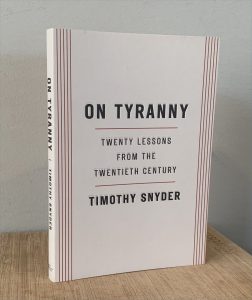 Snyder, Timothy. 2017. On Tyranny: Twenty Lessons from the Twentieth Century. Tim Duggan Books. ***
Snyder, Timothy. 2017. On Tyranny: Twenty Lessons from the Twentieth Century. Tim Duggan Books. ***
Prominent historian Snyder responds to the election of Donald Trump, in a small paperback of 20 chapters each 3 or 4 pages long, about the warning signs of rising fascism and how to avoid it. Some key points: do not mindlessly submit to an increasingly repressive government. Defend institutions; beware the one-party state. Observe professional ethics. Be wary of paramilitaries. Avoid cliches used by politicians (my people; struggles; treason; enemy of the people; fake news) and avoid the internet. Believe in truth; subscribe to print media (don’t get your news for free); read books; realize that some of what is on the internet is there to harm you. Be a good citizen; mind your private life; contribute to good causes. Be a patriot (as opposed to dodging the draft, not paying taxes, and the many other things Trump has done). If the unthinkable arrives, be calm even as authoritarians end checks and balances, dissolve opposition parties, and so on. Be courageous. Finally: we thought when communism failed, we had won; but that didn’t mean our story was true. Beware longing for the past, and MAGA. Think about the future, debate possible solutions to real problems. (post)
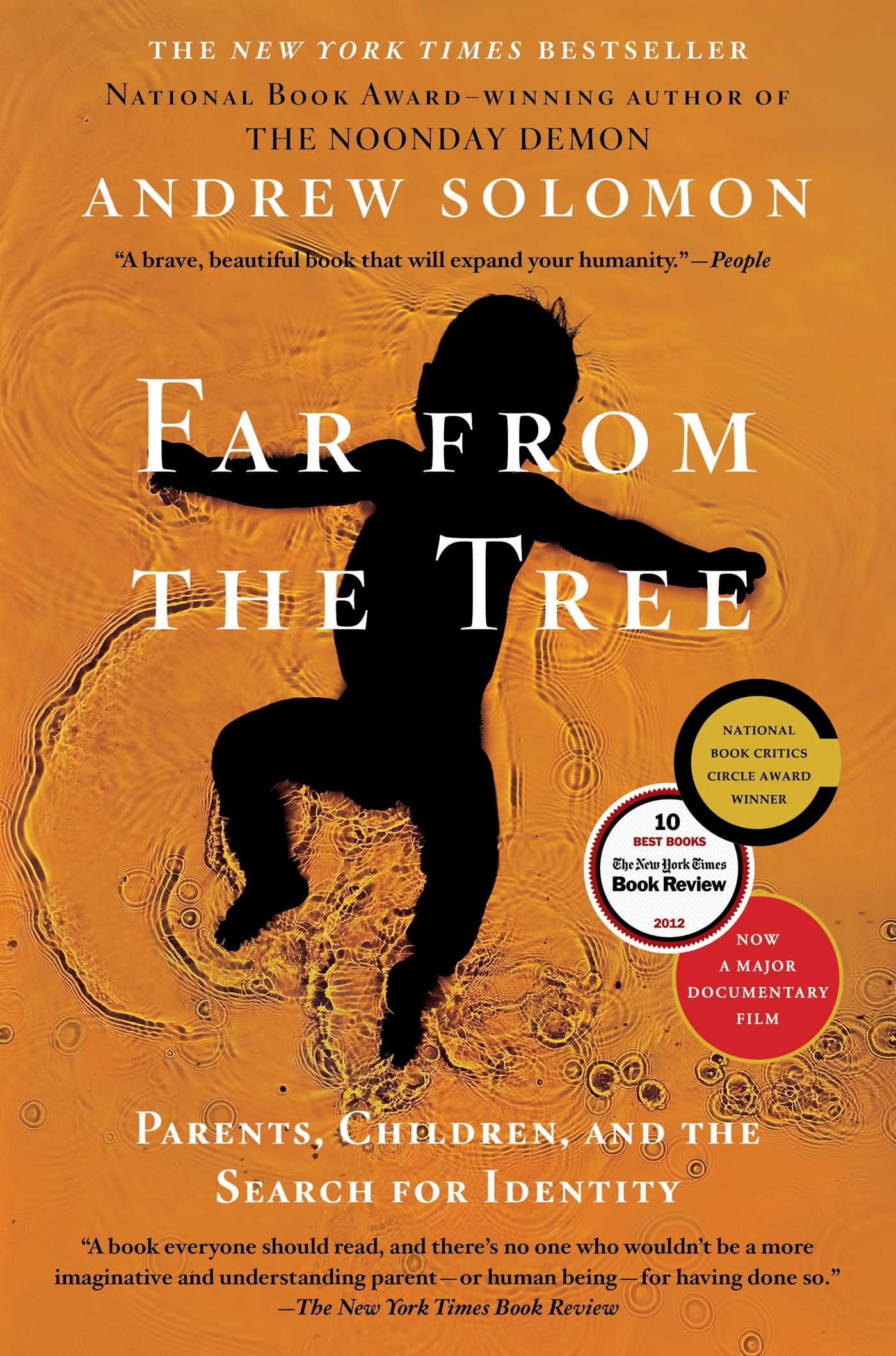 Solomon, Andrew. 2012. Far From the Tree: Parents, Children and the Search for Identity. Scribner. ****
Solomon, Andrew. 2012. Far From the Tree: Parents, Children and the Search for Identity. Scribner. ****
I read just portions of this: the opening and closing chapters, about Solomon’s childhood and his own father, and then about his late-in-life decision to become a father, via surrogacy; and then chapters on autism (e.g. concerning the ‘neurodiversity’ movement; the relationship of autism to creativity) and prodigies (considering here only musical prodigies; parental vs. public support). Solomon is a mesmerizing writer, blending results of studies and research with actual stories of hundreds of people he interviewed over 10 years. (post)
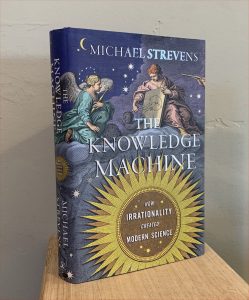 Strevens, Michael. 2020. The Knowledge Machine: How Irrationality Created Modern Science. Liveright. ***
Strevens, Michael. 2020. The Knowledge Machine: How Irrationality Created Modern Science. Liveright. ***
This book has an attractively non-intuitive premise: why would science, supposedly the epitome of rationality, have been created by irrationality? Because scientists, as humans, are as subject to psychological biases, like motivated thinking, as any of us. Strevens’ key is that the irrationality of scientists is necessary for the advancement of science, lest science sink into a torpid set of unchallenged conventional wisdoms. His second big idea is that science took so long to emerge (in the West) because the Church suppressed scientific thinking, until the Thirty Years War in the mid-17th century that re-aligned Europe into cultures aligned by nationalism, not religion. And his third claim is that he is skeptical of any eventual unification of the humanities and science (c.f. Wilson and others). He contrasts the positions of Kuhn and Popper and concludes neither one was quite right. Throughout, Strevens insists on the “iron rule of explanation,” which is that “all scientific arguments be settled by empirical testing.” And so he rejects scientific theories based on “beauty” or aesthetic consideration — e.g. string theory. (post)
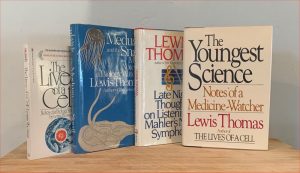 Thomas, Lewis. 1983. The Youngest Science: Notes of a Medicine-Watcher. Viking. ***
Thomas, Lewis. 1983. The Youngest Science: Notes of a Medicine-Watcher. Viking. ***
A collection of autobiographical essays about medicine and the author’s own career. The startling take-away is how little actual medicine, in the modern sense, there was only a century ago. In the early decades of the 20th century, most diseases were simply untreatable. Penicillin and vaccines weren’t widely used until the 1950s. In a section contrasting 1911 medicine with 1933 medicine, Thomas notes that even in 1933, medical students were taught to diagnose diseases more than to treat them. He describes life as an intern in a hospital, a time when you went to the ER only if you felt your life was in danger; then the patient went into a ward to be made comfortable until he died, or, rarely recovered on his own. Medicine made little or no difference. With observations about how research is done, rates of cancer following transplants (I’ve heard about this personally), and finally about his pessimism about the human race (writing in 1983), faced with one or another existential crisis. (post)
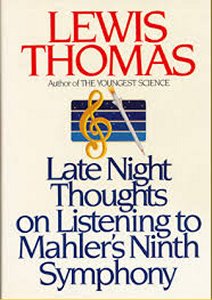 Thomas, Lewis. 1983. Late Night Thoughts on Listening to Mahler’s Ninth Symphony. Viking. ***
Thomas, Lewis. 1983. Late Night Thoughts on Listening to Mahler’s Ninth Symphony. Viking. ***
Thomas was a pediatrician and doctor and an essayist whose first book, The Lives of a Cell (brief discussion) won a National Book Award. This third volume of essays collects 24 essays in 168 pages. The title essay isn’t about Mahler per se, but how that music evoked for him imminent nuclear doom (this was the early 1980s), with two other essays about the consequences of nuclear war. Other essays are on various topics, exhibiting Thomas’ insight and wisdom: the age of science; the seven wonders of the natural world; the closing of mental hospitals; ideas about altruism; how the system defeats scientific fraud; and about the “two cultures” and the mystery of music. (post)
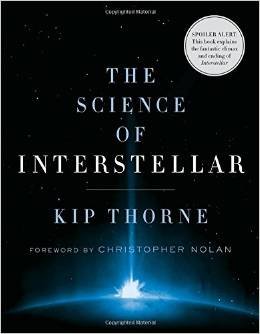 Thorne, Kip. 2014. The Science of Interstellar. Norton. ** 1/2
Thorne, Kip. 2014. The Science of Interstellar. Norton. ** 1/2
Director Christopher Nolan created the scenario for the film and then went to Thorne for scientific justification, with the latter pushing back in some cases. Along the way Thorne glosses on the major developments of 20th and 21st century physics — relativity, warped time and space, black holes, wormholes, higher dimensions, our universe as a ‘brane’ within a higher-dimensional ‘bulk’, how gravitational ‘anomalies’ lead to advances (Einstein, dark matter, dark energy), singularities (not just one type but three), the tesseract, and whether time travel is possible via wormholes. (post)
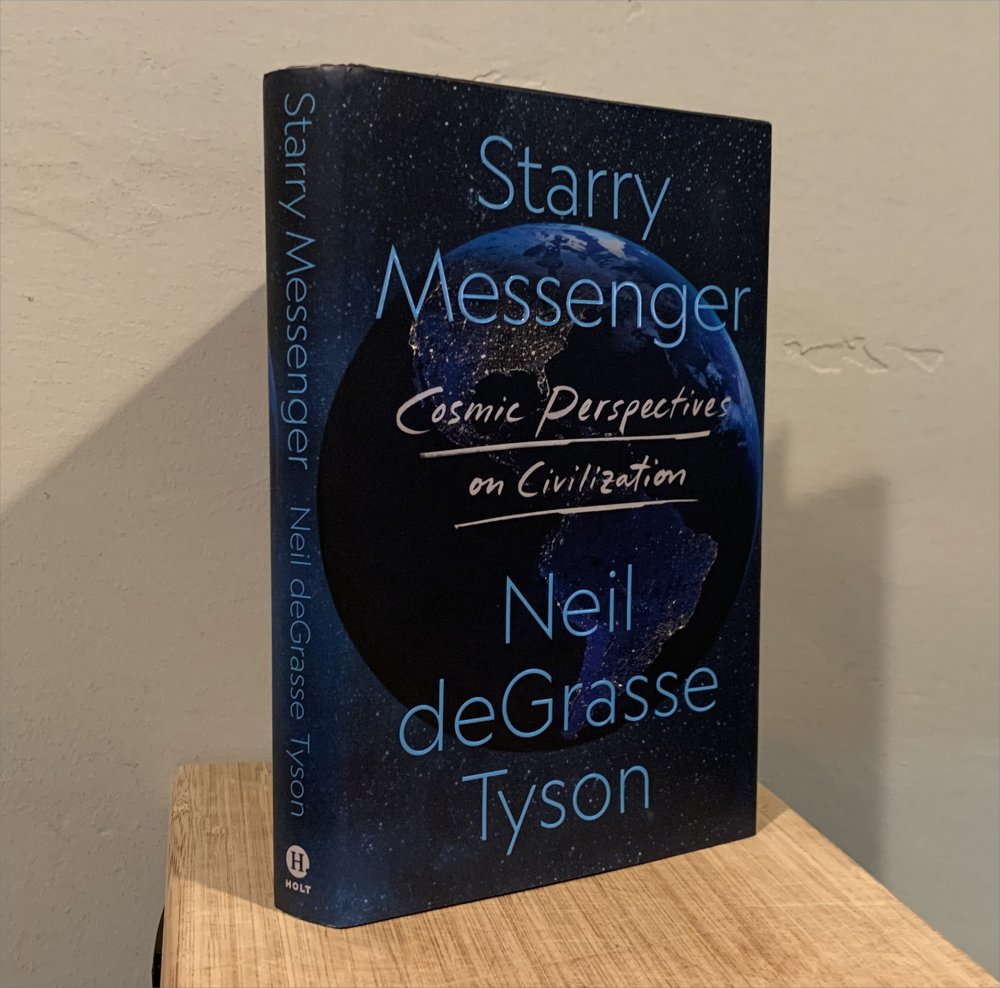 Tyson, Neil deGrasse. 2022. Starry Messenger: Cosmic Perspectives on Civilization. Henry Holt. *** 1/2
Tyson, Neil deGrasse. 2022. Starry Messenger: Cosmic Perspectives on Civilization. Henry Holt. *** 1/2
Somewhat like Sagan’s THE COSMIC CONNECTION, Tyson brings a cosmic sensibility to current issues, including vegetarianism, race, gender, disabilities, tribal forces in politics, the legal system and tropes about conservatives and liberals (how their differences reflect tribal forces within us, echoing Wallach and Gregg) with examples of nuclear families, science denial, how the two political parties once held opposite positions, and government social programs. He’s willing to challenge verities and explain why they aren’t actually true. Science informs everything: “Do whatever it takes to avoid fooling yourself into believing something is true when it is false, or that something is false when it is true.” There’s a terrific passage about how black racists might demeaningly depict whites. He discusses his idea of a “Rationalia” nation, and how it was denounced; and he contrasts the idea of the soul, given our chemical reality. As one would expect, Tyson comes down on the sides of reason and logic, recognizes complex realities rather than simple solutions or simple dichotomies, and above all advocates a respect and understanding of the universe around us as the proper foundation for genuine awe. (post)
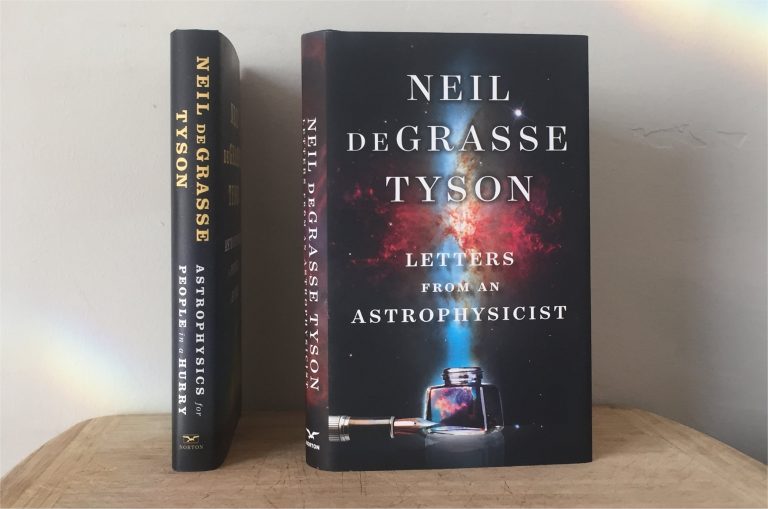 Tyson, Neil deGrasse. 2019. Letters from an Astrophysicist. Norton. ** 1/2
Tyson, Neil deGrasse. 2019. Letters from an Astrophysicist. Norton. ** 1/2
A collection of letters, and Tyson’s responses, in his role as director of the Hayden Planetarium. Throughout Tyson is polite and restrained where he could be confrontational. Topics include aliens, UFOs, pseudo-scientific claims; hate mail and science denial; life and death, tragedy, and belief; his school days, parenting, responses to a flat earther and accusations that liberals are anti-American. And a farewell letter to his father upon his death. (post)
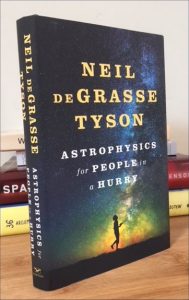 Tyson, Neil deGrasse. 2017. Astrophysics for People in a Hurray. Norton. **
Tyson, Neil deGrasse. 2017. Astrophysics for People in a Hurray. Norton. **
Collection of magazines essays about the earliest moments of the universe, the creation of the elements, the discovery of physical laws, dark matter, dark energy, and other topics. Tyson is no Carl Sagan, or Ann Druyan, but these essays are pleasant introductions to cosmic topics, with reflections of living cosmically. (post)
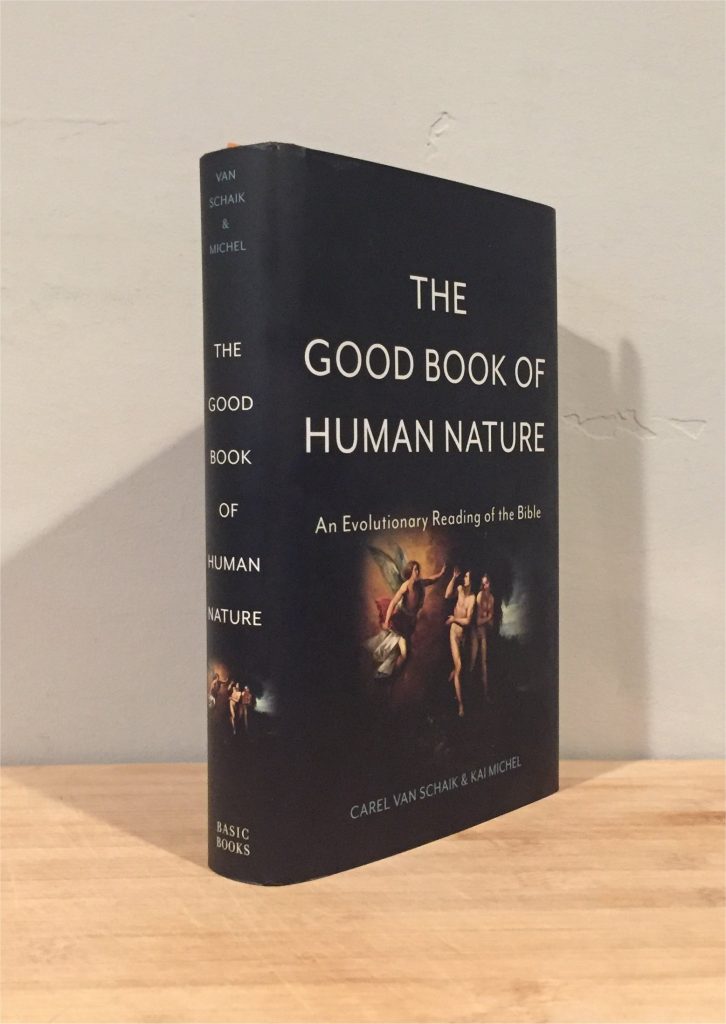 van Schaik, Carel, & Michel, Kai. 2016. The Good Book of Human Nature. Basic Books. *** 1/2
van Schaik, Carel, & Michel, Kai. 2016. The Good Book of Human Nature. Basic Books. *** 1/2
Why does the Bible contain certain stories, and not others? Because its stories reflect the concerns of humanity as it transitioned from being hunter-gatherers to settling in villages with the “invention” of agriculture. People no longer knew everyone in their community; new diseases were easily spread; concerns about the family line of distribution of property arose. The stories describe how such problems were solved. With perspectives on the history of the Bible, and how ancient human nature that evolved over hundreds of thousands of years has been overlaid twice, first by cultural evolution that varies from place to place, and then by rational institutions and practices that currently keep the world running, even as those practices can clash with first nature reactions. The entire Bible is covered, though focus on its first five books takes half of this one. (summary of the 30-page introduction) (post)
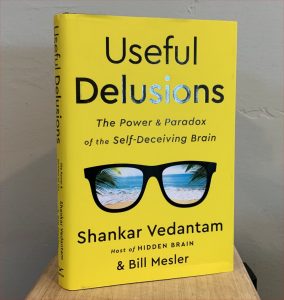 Vedantam, Shankar. 2021. Useful Delusions: The Power and Paradox of the Self-Deceiving Brain. Norton. ***
Vedantam, Shankar. 2021. Useful Delusions: The Power and Paradox of the Self-Deceiving Brain. Norton. ***
NPR correspondent Vedantam’s book is another about how our perceptions and cognitions are molded by the evolutionary priority of survival, and not to accurately understand the “real world.” It’s full of examples, including a long middle section about a con artist who’d scammed hundreds of men via a direct-mail scheme, but who was *forgiven* by many of his victims when revealed. How to understand this? Because some kinds of delusions make us feel better, even when we know they’re delusions; we welcome them. The book’s thesis is, handily, summarized in the introduction: that self-deception might be functional, offering us hope and reassurance (which in turns are useful attitudes for survival). With examples of how the eye filters information, how the mind has layers, like those of ancient cities; how modern conflicts between tradition and modernity have parallels inside the brain. “Our minds are not designed to see the truth, but to show us selective slices of reality, and to prompt us toward predetermined goals. Even worse, they are designed to do all this while giving us the illusion that we are seeing reality.” There are obvious echoes of books by Hutson, Haidt, and others. (post)
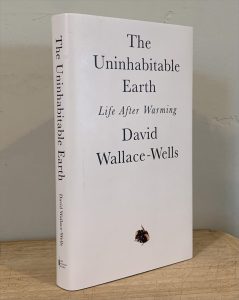 Wallace-Wells, David. 2019. The Uninhabitable Earth: Life After Warming. Tim Duggan Books. ****
Wallace-Wells, David. 2019. The Uninhabitable Earth: Life After Warming. Tim Duggan Books. ****
This book isn’t about the science of why we think global warming is happening, but about the consequences of it, currently and in the future. Not just sea-level rising, but also heat waves, famines, the drowning of coastal cities, increased wildfires, the normalizing of natural disasters, the loss of fresh water, the dying of the oceans, increased air pollution, increased plagues, economic collapse, conflicts among nations. More broadly: it will require new kinds of storytelling, capitalism, technology, politics. Our “modern world” may be just a blip in history. There is almost no chance we’ll avoid this. And while such projections typically go out to the year 2100, the following century will be much worse. But don’t succumb to despair: we know what to do. Get off fossil fuels, eliminate the bitcoin footprint, correct inefficiencies in present systems. Move beyond the Western idea of conquering the earth. (summary part 1; part 2)
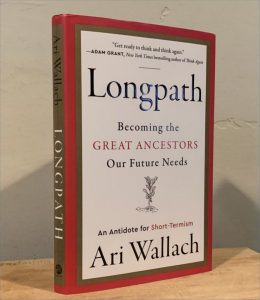 Wallach, Ari. 2022. Longpath: Becoming the Great Ancestors Our Future Needs. HarperOne. *** 1/2
Wallach, Ari. 2022. Longpath: Becoming the Great Ancestors Our Future Needs. HarperOne. *** 1/2
A modest little book with great ambitions to change the way people think. It’s about “long-termism,” the need to anticipate future outcomes in order to deal with climbate change and other big problems. (He’s adjacent to William MacAskill’s work but not aligned with it.) Our minds evolved for short-term thinking to deal with immediate threats, when a single human lifespan was a far as philosophers thought about. Now we need to think more creatively, distinguishing between arbitrary goals and true goals. To what end is our spcies? Maybe not the Second Coming, or the Singularity, but simply collective flourishing. Look for “trim tabs,” small changes that have big effects, even something so simple as smiling and looking people in the eye whenever possible. Morality is flexible; we can shape it. And realize that if our species does endure, we are now only in a very early stage of humanity’s history. (post)
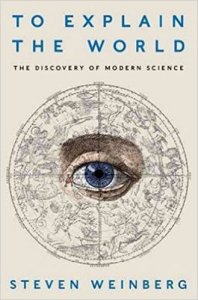 Weinberg, Steven. 2015. To Explain the World: The Discovery of Modern Science. Harper. *** 1/2
Weinberg, Steven. 2015. To Explain the World: The Discovery of Modern Science. Harper. *** 1/2
The Nobel physicist provides a history of science and a history of the idea of science, from the Greeks to Newton. The key theme is that “The progress of science has been largely a matter of discovering what questions should be asked.” It took centuries to realize that it was never “fruitful to ask what motions are natural, or what is the purpose of this or that physical phenomenon.” The ideas of the Greeks — earth, air, fire, water; ‘atoms’ — were poetical, never tested. There wasn’t much distinction between science and philosophy for thousands of years, and there was much rationalizing with religion (e.g. Aquinas). The breakthroughs came in the 15th and 16th centuries with Copernicus, Tycho, Kepler, and Galileo. The Church, of course, refused to look through Galileo’s telescope and banned his books. The scientific revolution climaxed with Newton, with his insights summarized in his three ‘laws.’ [And in retrospect, we can understand early attitudes toward science as reflecting biases of the human mind– assumptions, never tested, that the universe must be something beautiful or perfect by human standards.] (post)
 Westover, Tara. 2018. Educated: A Memoir. Random House. ***
Westover, Tara. 2018. Educated: A Memoir. Random House. ***
Memoir about the author growing up in rural Idaho, one of seven kids in a survivalist family who never sends their kids to doctors, or to school; who fear the government and are sure the Days of Abomination are due any moment. She’s determined to get out into the world, and she does so, and learns about all the things her parents never told her. Still, the title refers not so much to her secular education as it does coming to understand her family, and learn to understand them, if not entirely accept them. Interesting bits: Father reads from holy books but thinks most other books are harmful; when nothing happens at Y2K father, sure the world would end, feels betrayed by God; the family is extremely careless both in their junkyard business and in cross-country drives; in her studies at Cambridge Tara reflects on how history comes to be written. With reflections on my own family. (post)
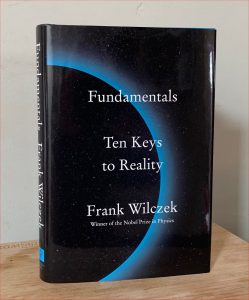 Wilczek, Frank. 2021. Fundamentals: Ten Keys to Reality. Penguin Press. ***
Wilczek, Frank. 2021. Fundamentals: Ten Keys to Reality. Penguin Press. ***
The Nobel Prize-winning physicist describes ten “keys” to understanding the universe, implied as alternatives to traditional religious fundamentalism. These include things like space and time, the sparseness of basic building blocks and fundamental forces, the immensity of matter and energy, and properties like complexity and complementarity. This last concept, paralleling Sean Carroll’s “poetic naturalism”, includes emergent properties and levels of complexity as escapes from the trap of material reductionism. There’s a good quote about how understanding these concepts helps us rule out intuitively attractive ideas of astrology, ESP, magical thinking, and other examples of action-at-a-distance, that most people adopt as children. (post)
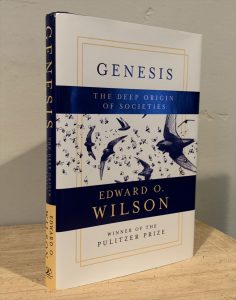 Wilson, Edward O.. 2019. Genesis: The Deep Origin of Societies. Liveright. ** 1/2
Wilson, Edward O.. 2019. Genesis: The Deep Origin of Societies. Liveright. ** 1/2
Human evolution is all that’s needed to explain the human condition, individuals as well as societies. Societies form via the same principles of selection and survival that create individual human nature. The book extends the idea of “eusociality,” the dynamic between individual and group selection, that he addressed in The Societ Conquest of Earth, now with the claim that recent mathematical results have undermined earlier ideas of kin selection. The key to human intelligence has not been, as long thought, tool-use, but rather has been social bonding. (post)
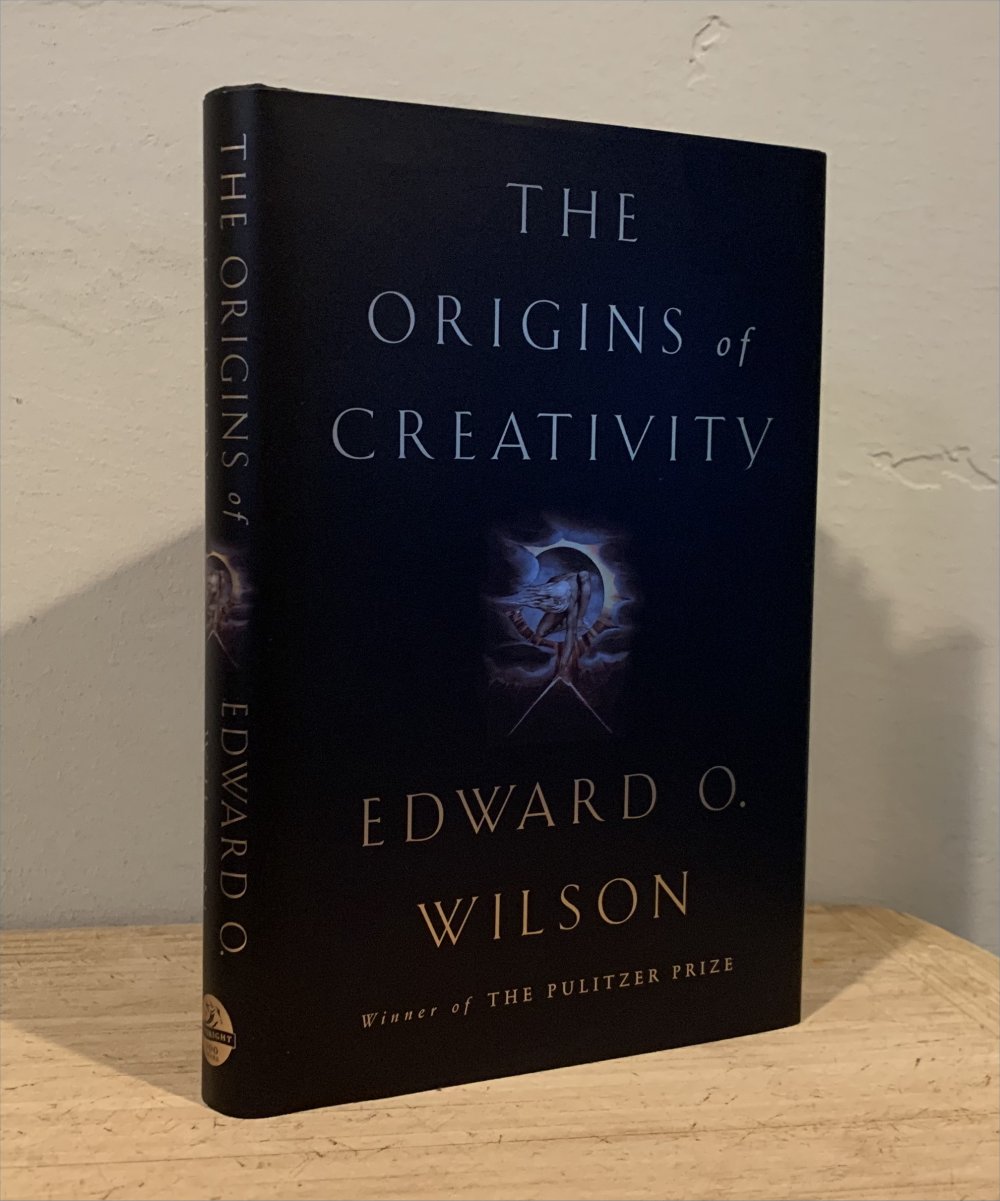 Wilson, Edward O.. 2017. The Origins of Creativity. Liveright. ** 1/2
Wilson, Edward O.. 2017. The Origins of Creativity. Liveright. ** 1/2
Wilson expands on themes of earlier books with ideas about creativity as the quest for originality, drawing from the “consilience” of the humanities and science, both grounded in human evolution. The synergy between those two will be a “Third Enlightenment,” if we avoid succumbing to the creation stories of organized religion. Curious asides: a short chapter about the song “Send in the Clowns”; another about archetypes and their appearance in popular stories and movies, many of them that he cites science fiction. (post)
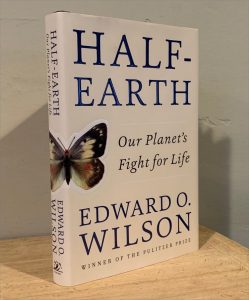 Wilson, Edward O.. 2016. Half-Earth: Our Planet’s Fight for Life. Liveright. ***
Wilson, Edward O.. 2016. Half-Earth: Our Planet’s Fight for Life. Liveright. ***
This book expresses an important idea that has become part of Wilson’s legacy: that to prevent mass extinctions and preserve Earth’s biodiversity, we must save half of the planet’s land-surface from human development. There is a detailed list of suggested “best places in the biosphere” worth preserving, among them the Redwood Forests of California. Outside this core, much of the book is stage-setting, with overviews of life on Earth, what naturalists do, tours of ecosystems, and how to think about humanity in the context of the planet’s history. (post)
 Wilson, Edward O.. 2014. The Meaning of Human Existence. Liveright. *****
Wilson, Edward O.. 2014. The Meaning of Human Existence. Liveright. *****
A concise summary of the great scientist’s views on the big issues of science and philosophy, summarizing themes from the author’s many other books. Meaning is not about intent and design; humanity’s meaning is a summation of the accidents of history that have brought about our existence. This leads directly to questions of to what extent we direct our own future evolution. He reviews the key concept of group selection, and the inherent conflict with individual selection: “risking oversimplification, individual selection promoted sin, while group selection promoted virtue”, thus the eternal struggle within every person. He revisits the idea of ‘consilience’ between the sciences and humanities; the Enlightenment; the two cultures; how our devotion to stories reflects how the mind works. How the humanities explore the comfort zone of human existence, while science explores continua the humanities cannot perceive (but which some other animals do). Science will mature and stabilize; aliens would know the science and be interested instead in our humanities. He discusses super-organisms; speculates on the nature of intelligent extra-terrestrials, and why aliens could never invade our planet (or we theirs); reviews the collapse of biodiversity; and then reflects about human nature, about instinct, religion (built in to human experience; “regarded by the common people as true, by the wise as false, and by rulers as useful”; motivating the tribalism behind conflicts in the world), and free will (which he suppose exists at least for practical reasons). What is the meaning of human existence? It’s the epic of our species through evolution, prehistory, recorded history, and the potential for what we choose to become. With some final swipes at creationism (“a triumph of blind religious faith over carefully tested fact”), Wilson concludes “If the heuristic and analytic power of science can be joined with the introspective creativity of the humanities, human existence will rise to an infinitely more productive and interesting meaning.” Detailed notes part 1, part 2, part 3, part 4, part 5.
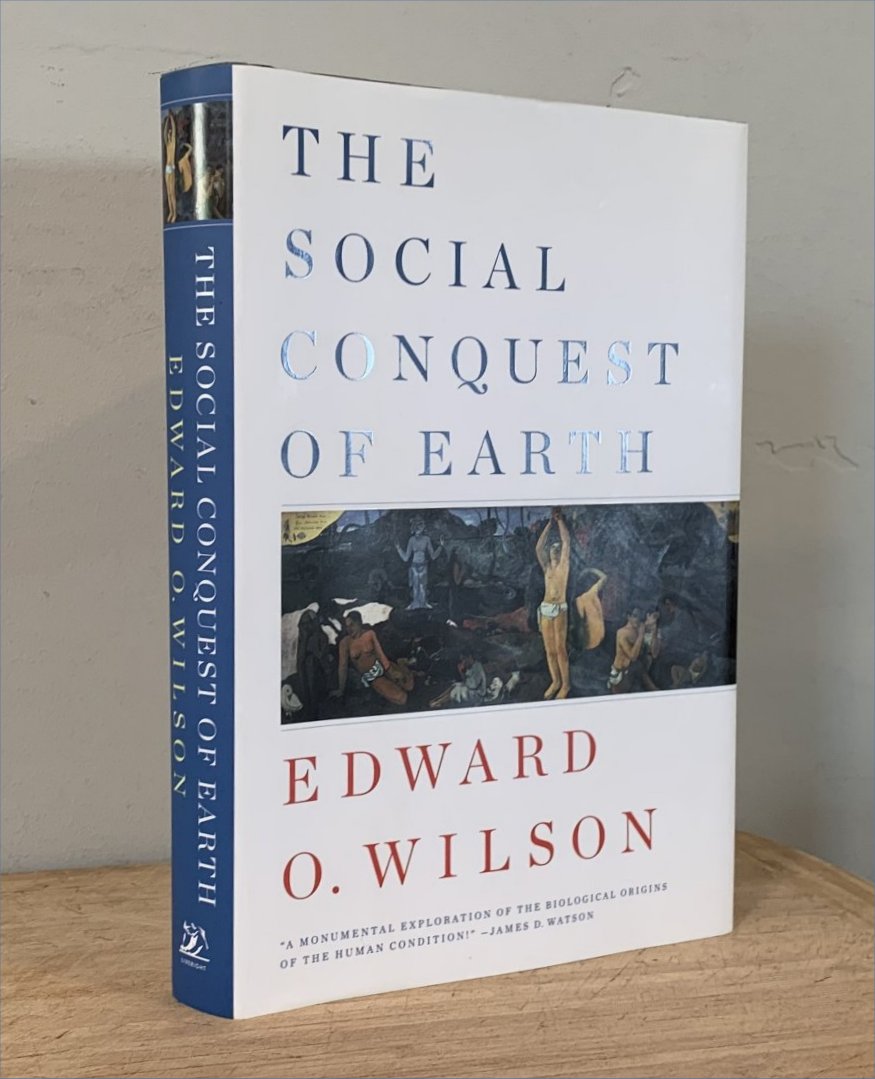 Wilson, Edward O.. 2012. The Social Conquest of Earth. Norton/Liveright. ****
Wilson, Edward O.. 2012. The Social Conquest of Earth. Norton/Liveright. ****
One of Wilson’s four best books, in my estimation, this summarizes areas of his thinking from across his career to explain where humans came from, what we are, and where we are going. These are ideas of human “eusociality” and “multilevel selection,” a combination of individual selection and group selection, represented by selfishness vs. altruism. Consequences include our preference for being part of groups, followed by how culture developed, then language, morality, religion, and the creative arts. Now, we are responsible for the planet and must find a new enlightenement; religion is part of the problem, not the solution. Replete with beautiful writing and arresting passages to quote. (long summary, with several quotes)
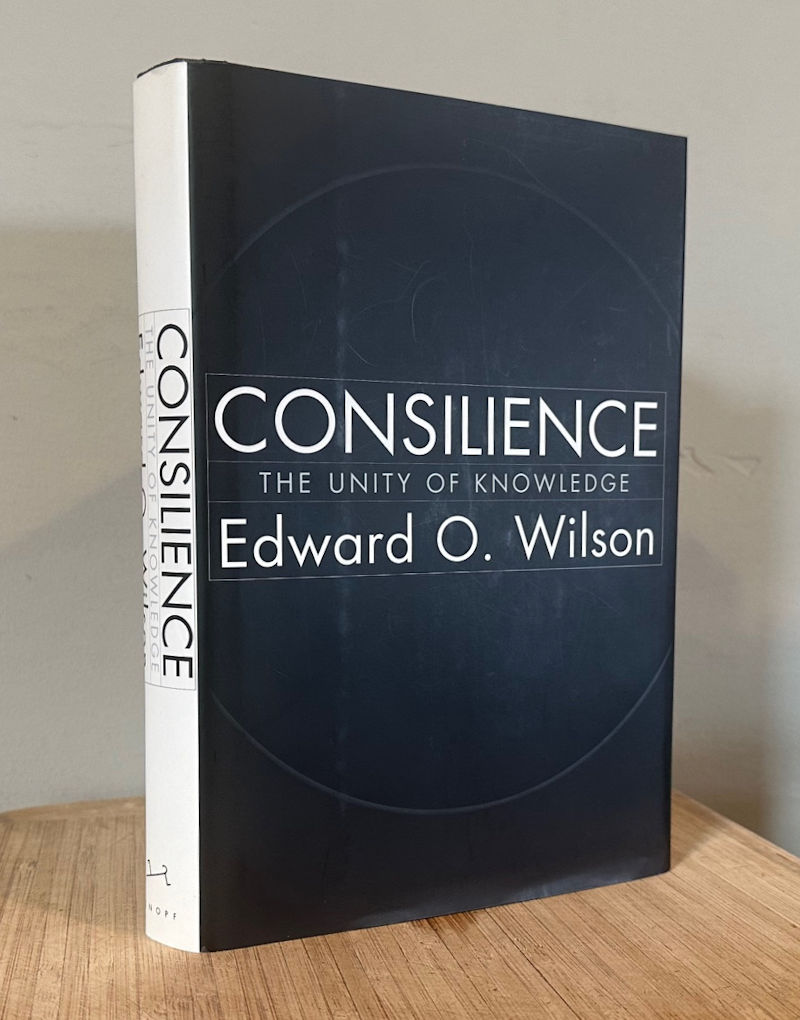 Wilson, Edward O.. 1998. Consilience: The Unity of Knowledge. Knopf. *****
Wilson, Edward O.. 1998. Consilience: The Unity of Knowledge. Knopf. *****
Likely Wilson’s magnus opus, this is his attempt to describe a worldview that unifies all knowledge, especially between the sciences and the humanities, leaving religion behind (as he did as a boy) and applying scientific principles and insights even to areas where this viewpoint is resented. He addresses the great branches of knowledge, and reflects how the Enlightenment was constrained by the deism of its leaders. How science works: “the most effective way of learning about the real world ever conceived.” How philosophy has been hobbled by “ignorance of how the brain works”. How science is challenged by the complexity of systems, with ideas of emergence avoiding the perils of reductionism. His chapter 6 on the mind corresponds to Pinker’s entire book on the subject: the mind is the brain, it evolved for survival and not perception of the real world, and so on. He describes how culture emerges from human nature, and how human nature entails regularities like kin selection and altruism. Then, as Pinker does later, applies these understanding to particular aspects of human culture, especially in the social sciences: the arts and their interpretation, ethics and religion. Finally he asks, To what end? What is humanity’s future? The key questions are: what we are, where do we come from, and how shall we decide where to go. Neither theology nor philosophy has answered these. Our challenges include our potential dependence on prosthetic devices, and our damage to the natural world. He comes down on “existential conservatism”: “The legacy of the Enlightenment is the belief that entirely on our own we can know, and in knowing, understand, and in understanding, choose wisely.” A big book that’s in a sense about everything. Wilson is one of the most graceful and deeply insightful science writers ever. The post here is the 11th, and it links to the earlier 10. (post)
 Wilson, Edward O.. 1978. On Human Nature. Harvard. *****
Wilson, Edward O.. 1978. On Human Nature. Harvard. *****
Wilson’s most famous book, controversial in its time for challenging conventional wisdom that the human mind was a “blank slate,” completely molded by environment, education, and society. (Or conversely, the religious view that humans are dark angels in need of redemption.) Rather, the human brain and mind are entirely biological in origin, and the result of evolution by natural selection, and can be understood especially in the context of other social species. Human behavior is genetically determined; evidence (examples) is decisive, including the famous 1945 list of characteristics that have been recorded in every known culture, far different that those on a similar list for, say, insect societies. The explanation of human social patterns by evolution is called sociobiology. The remainder of the book applies sociobiological interpretations to a variety of human behaviors. E.g. the incest taboo, and hypergamy (where females seek to marry men of equal or greater wealth). It begins with discussions of infant development and the development of the brain over millions of years. Then chapters on specific topics: aggression (yes, humans are innately aggressive, but we can recognize its rules are obsolete and try to overcome them); sex (humans are moderately polygynous; there are innate differences between the sexes; sexual bonds transcend reproductive activity; natural-law theories of Judaism and Christianity are wrong, e.g. concerning homosexuals, common in all cultures, and how kin-selection explains this); altruism (operating at different levels with different motivations, the ideas of individual and group selection, about the range of ethical behaviors); and religion (likely ineradicable–“most people would rather believe than know”, how there is a cultural Darwinism among religions, how religions coexist with cultures, how scientific materialism has defeated traditional religion, with new explanations for the origin of the universe all the way to the explanation of religion itself). Finally, Wilson returns to his two spiritual dilemmas: that humanity has no external purpose, that once we understand the origins of morality, what decisions do we make? With ideas about morality based on reason and evidence, and the synchronicity between disciplines. Many good quotes: Wilson was, and is, an elegant, provocative writer. (post)
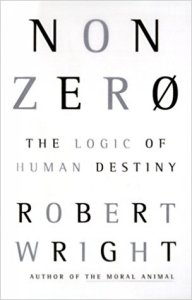 Wright, Robert. 2000. Nonzero: The Logic of Human Destiny. Pantheon. ***
Wright, Robert. 2000. Nonzero: The Logic of Human Destiny. Pantheon. ***
Progress exists in human history because history is not a zero-sum game (i.e. for one side to ‘win’ the other doesn’t have to ‘lose’; both can win). Author wonders therefore, is there some ‘point’ to human history? The author flirts with the idea that our species has a ‘purpose’ which we may be ‘designed’ to realize. Haven’t finished this, but I’m skeptical of his teleology; in fact, complexity can emerge from simplicity given basic rules of natural processes. It doesn’t take a designer. Still, I see this work referenced by later writers even 20 years later, so many must find its basic point valid. (Intro and Chapter 1)
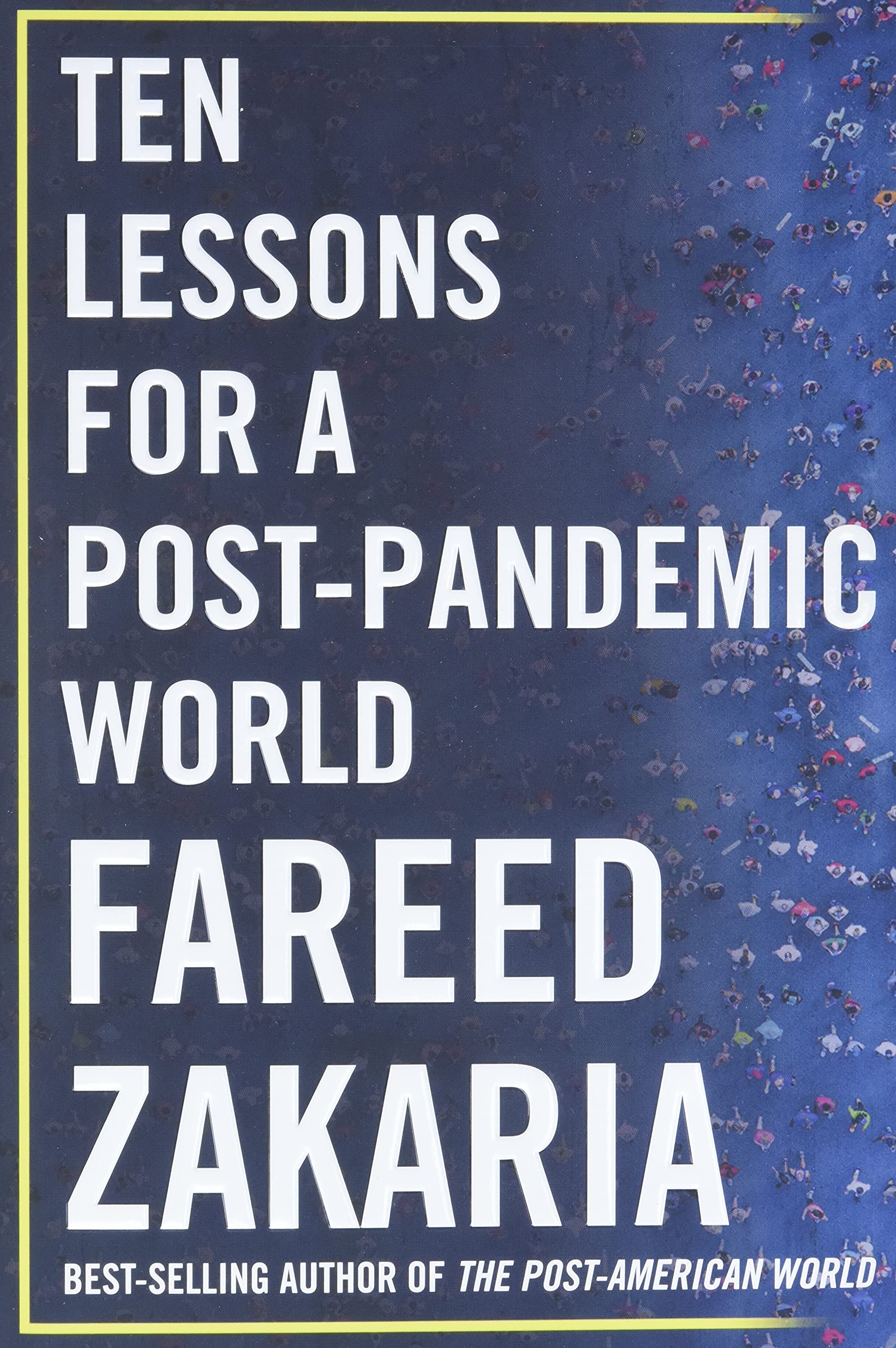 Zakaria, Fareed. 2020. Ten Lessons for a Post-Pandemic World. Norton. *** 1/2
Zakaria, Fareed. 2020. Ten Lessons for a Post-Pandemic World. Norton. *** 1/2
The CNN correspondent, with a seemingly iron grasp of 20th century history, discusses what he sees as the effects of the pandemic — that it will accelerate existing trends. 1) The world is resilient and is not doomed, but needs global coordination; 2) The US government is no longer a country to emulate, but needs to learn from other countries; 3) Markets are powerful but not sufficient, needing regulations, tax policies, government investment, education; 4) We can’t govern by gut and celebration of ignorance; we need more experts, even as they should connect with people and mind their needs; 5) The digital economy will not save us, but it will refocus our lives; 6) Cities will not die; we are social animals, and cities are more productive and healthier than rural areas; 7) Inequality will get worse, and will increasingly disadvantage the poor, who rightly think the system is rigged against them; 8) Globalization is not dead, and can’t be stopped; bringing manufacturing back locally would be too expensive; 9) The world is becoming bipolar, between the US (despite all its problems) and China; 10) As Trump and other leaders turn selfishly inward, the “liberal international order” remains idealistic: avoid war, and become intertwined economically, and everyone will lead longer, richer, and more secure lives. Finally: Nothing is written. Problems remain. We can address them, or ignore them. (post)
 Zuckerman, Phil. 2014. Living the Secular Life: New Answers to Old Questions. Penguin. ***
Zuckerman, Phil. 2014. Living the Secular Life: New Answers to Old Questions. Penguin. ***
How people live their lives without religion, despite the assumptions of many that religion is necessary for morality. (Even though this is obviously not true.) What underlies morality among secular people? Culturization, the ways living with other people leads to principles like the Golden Rule. (The idea echoes E.O. Wilson’s group selection, and Alex Rosenberg’s Core Morality.) In fact, secular people are less likely than the religious to be racist and vengeful, to support torture and oppose women’s and gay rights; there are very few atheists in prisons. Morals are acquired not from lists in books but from the culture in which one lives and the experience in navigating life. Other topics include the familiar evidence that more secular countries score better on measures of social health; that secularism is increasing due to backlash to church scandals, the rise of women in the workforce, the acceptance of homosexuality, and the internet; and the ways secular people deal with various aspects of their lives, including traditions, communities, and life events, with interesting asides about the stages of moral development, and the problematic term “atheist.” (post)

